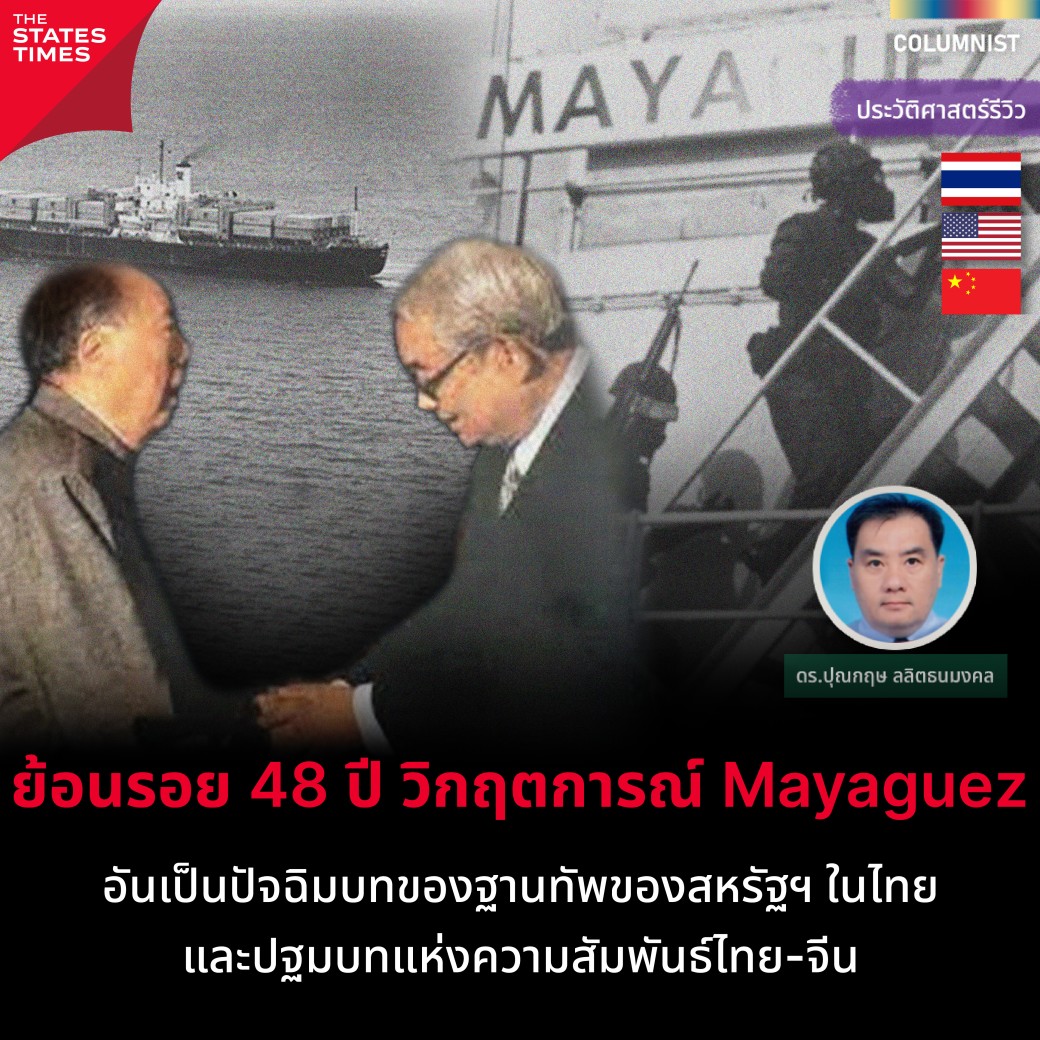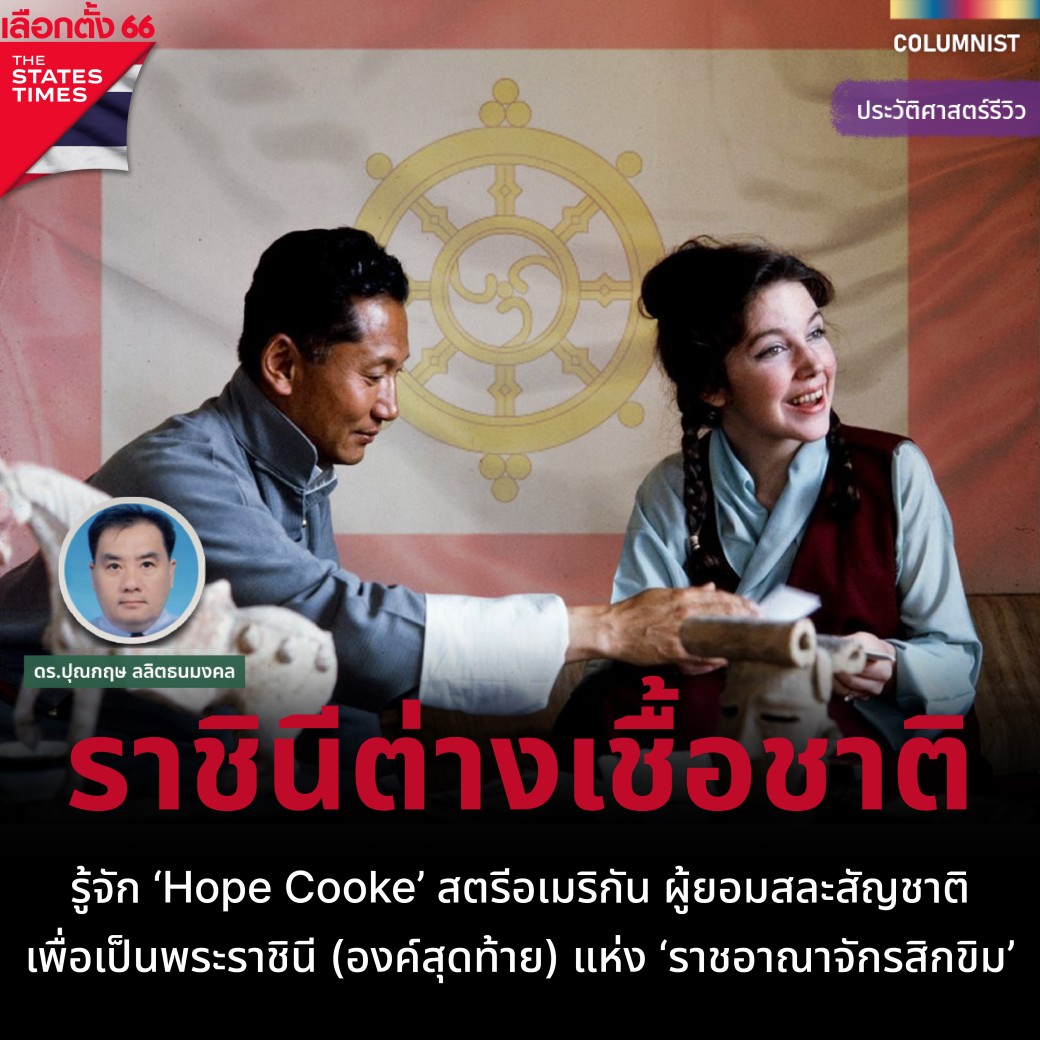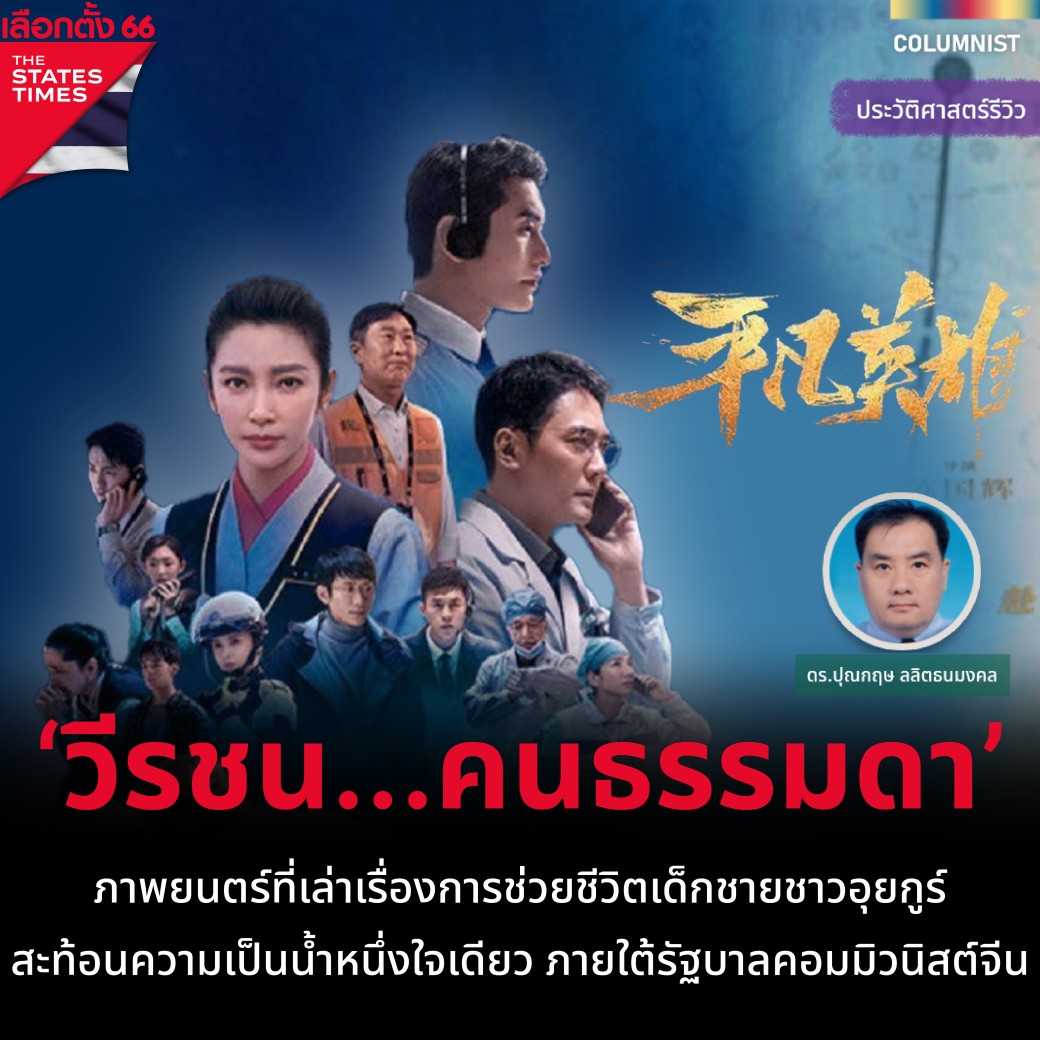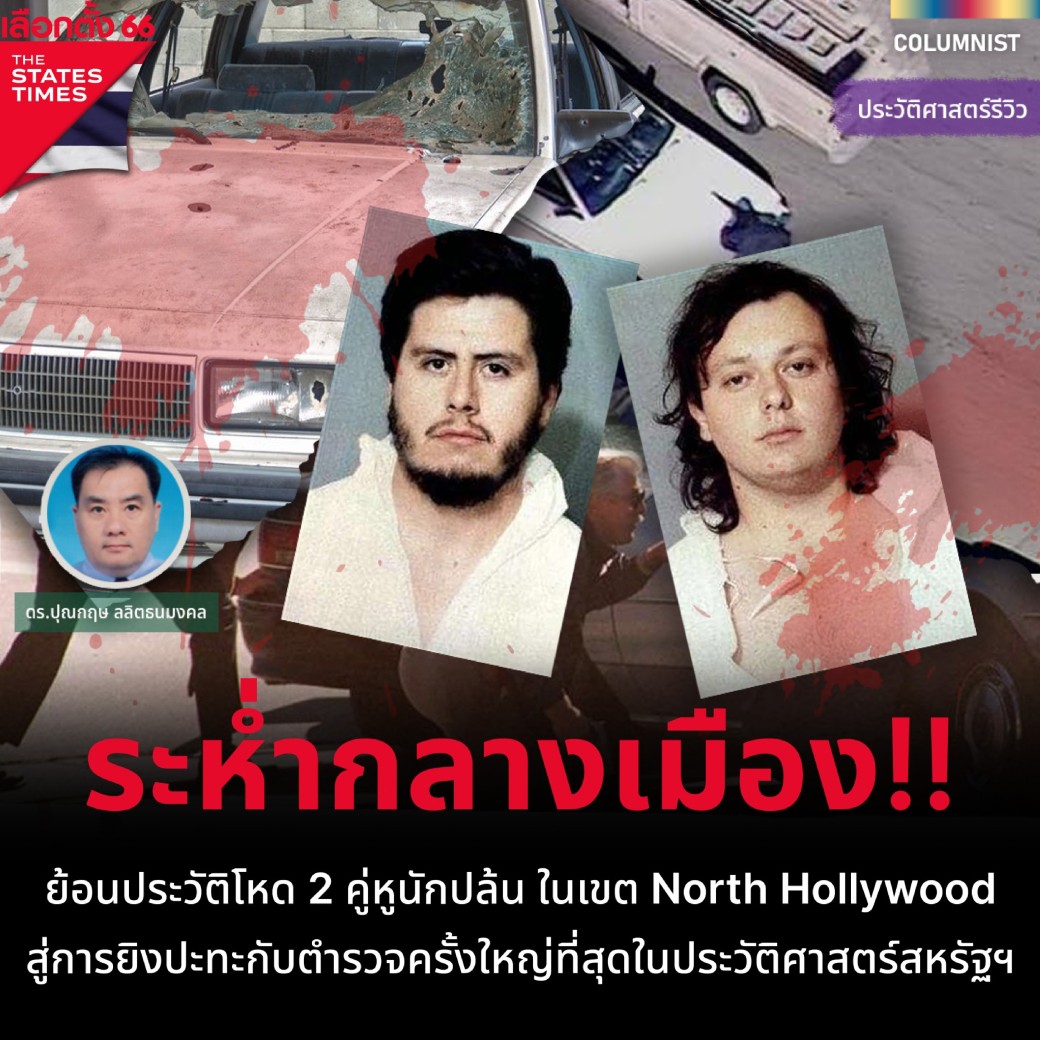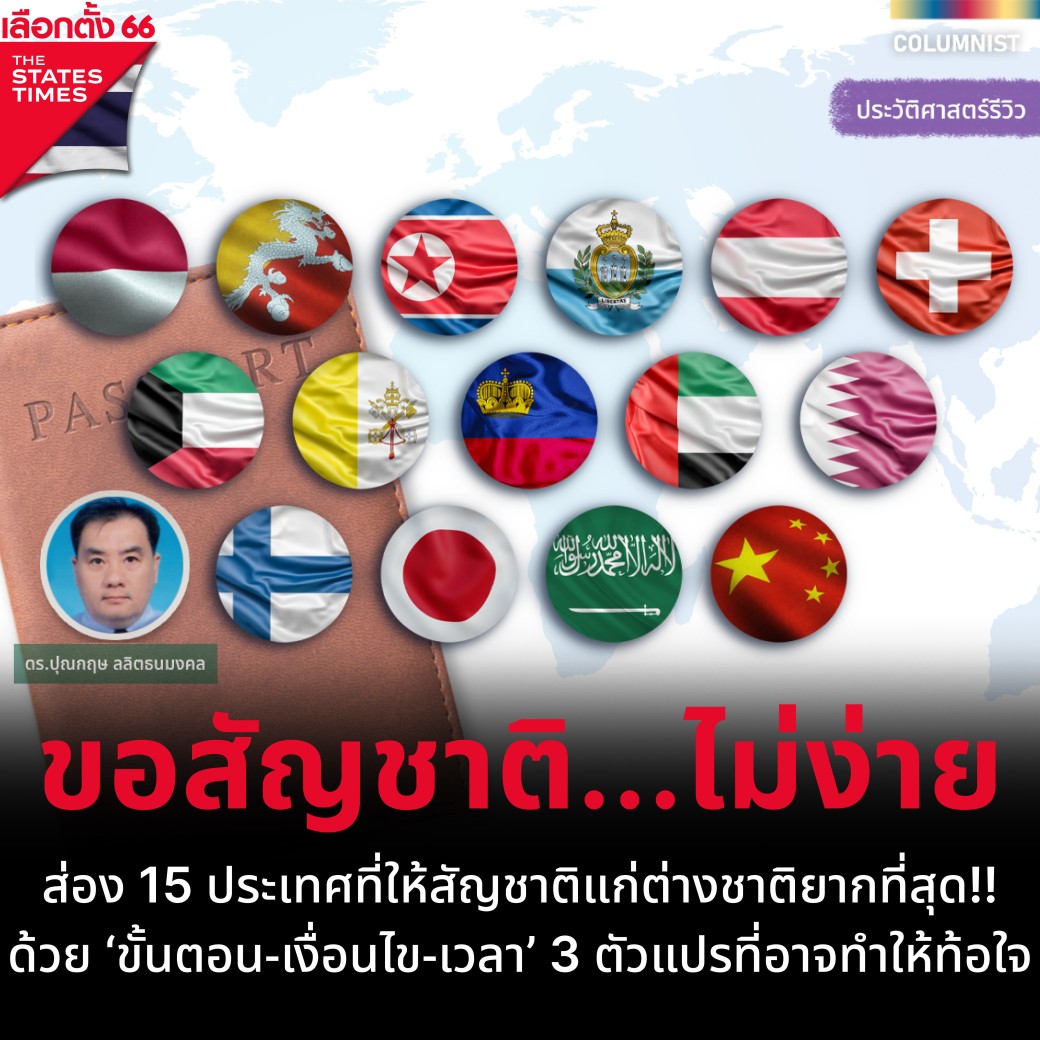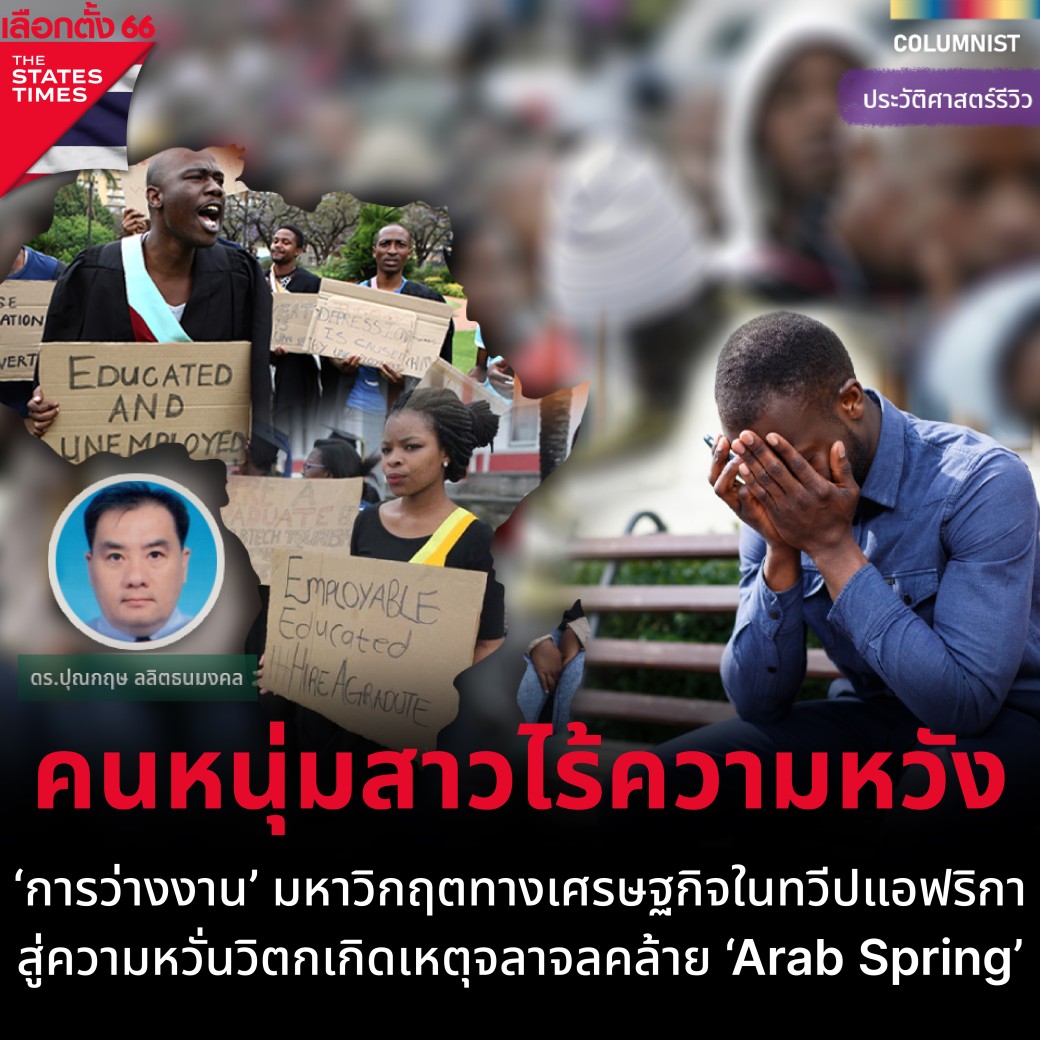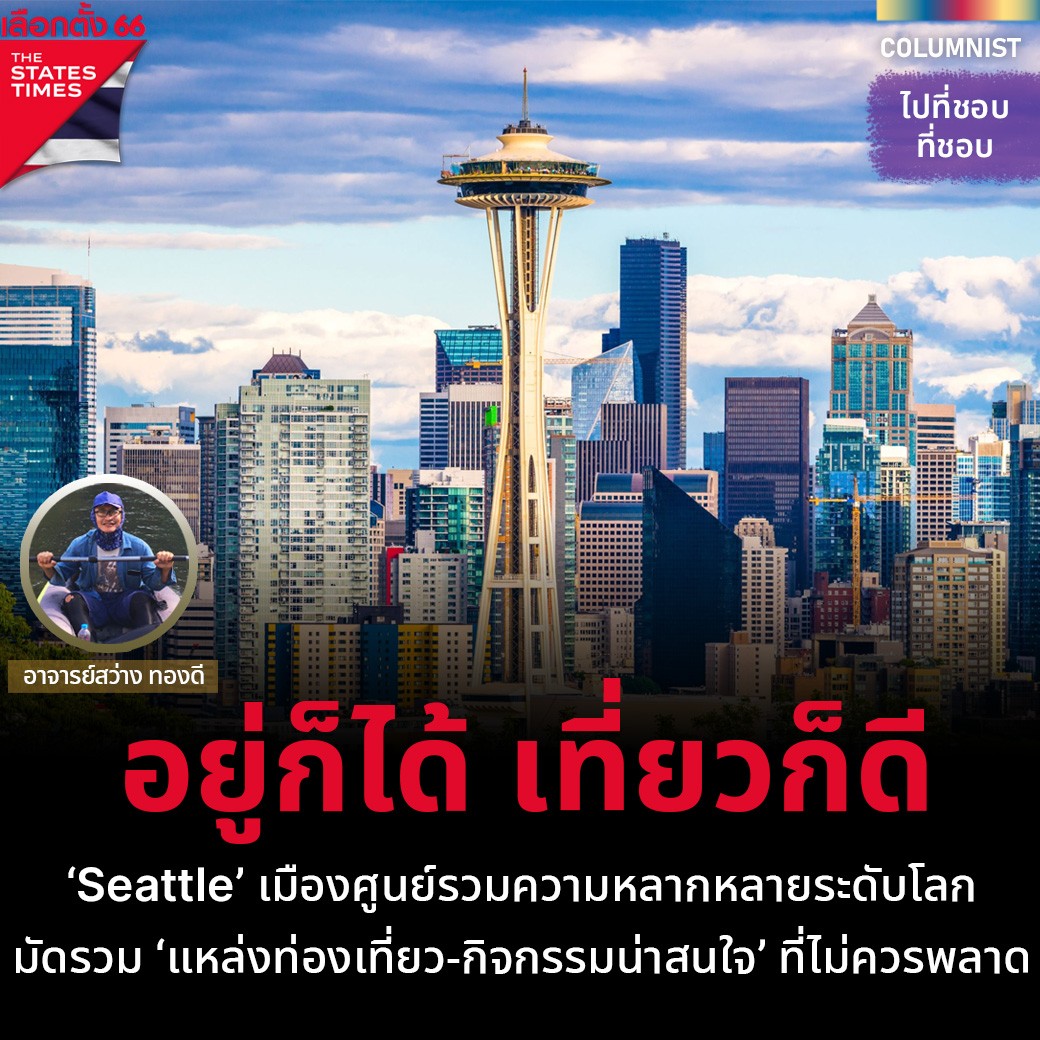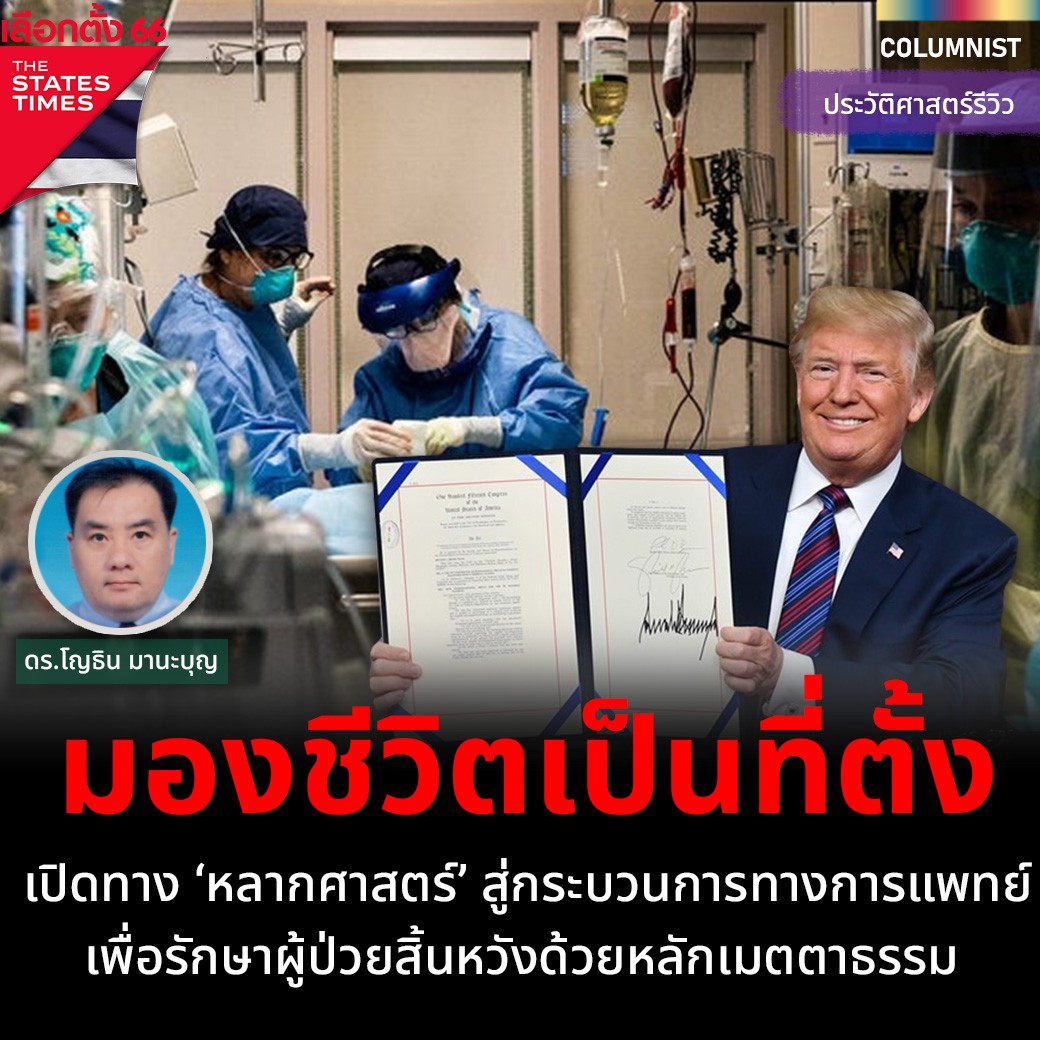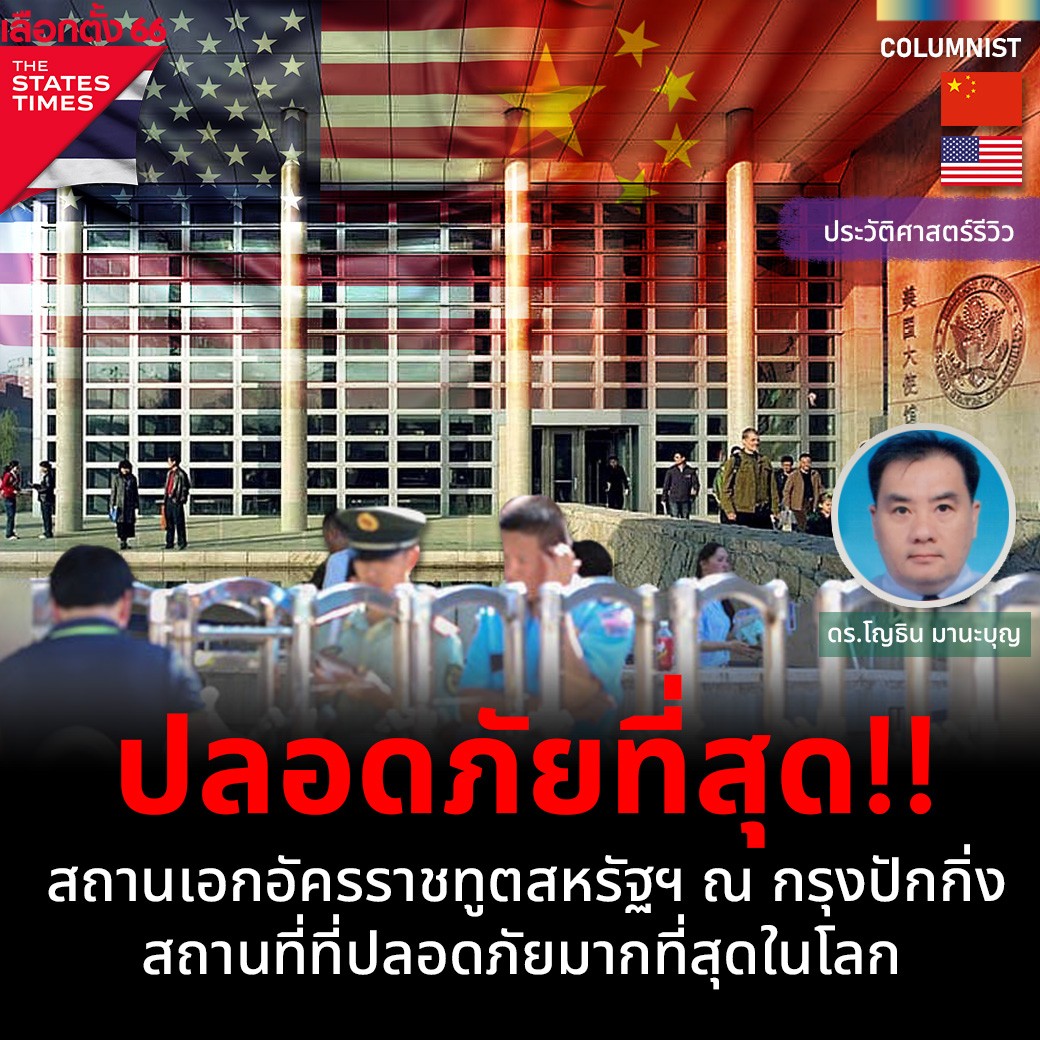- Home
- News
- Politics
- EconBiz
- World
- LITE
- COLUMNIST
- Podcast
-
VIDEO
- Contributor
- Story Telling
- BizMAX
- Click on Clear Exclusive
- Click on Clear The Word
- Idol
- พีค of the week
- News มีนิสส More Minutes Contrast
- Game Changer
- THE STUDY TIMES STORY
- LOCK LENS GURU
- NEWS GEN TIMES
- BizMAX THE TOPIC
- Click on Clear THE TOPIC
- Click on Clear เที่ยงตรง
- Meet THE STATES TIMES
- Click on Clear เขี่ยบอล
- Aerosoft SME
- กบร่อนตะลอนเล่า
- คุยกับระนาด
- Click on Clear THE TOPIC LIVE
- Knowledge Times
- Meet THE STATES TIMES เดอะ ดีเบต
- Good Morning THE STATES TIMES
- Click on Clear Original
- SUMMARY REPORTER
- THE CORNER
- Y WORLD
- INFO & TOON
-
Special
- นอร์ทไทม์
- อีสานไทม์
- Western
- รู้ทัน...การเมืองไทย
- Education News
- Tutor
- Top University
- Top School
- International
- Education Columnist
- Family
- Issue
- Weekend News
- World
- ภาคกลางไทม์
- อีอีซีไทม์
- เซาท์ไทม์
- Crimes
- THE SHOPS TIMES
- ตามรอยเลือกตั้ง
- วิเคราะห์การเมือง
- News Feed
- LIVE เกาะติดเลือกตั้งประเทศไทย
- เจาะพื้นที่เลือกตั้ง
- เลียบการเมือง
- About
- Contact
COLUMNIST
เรื่องราวที่ ‘Ferrari’ ไม่เคยได้รับการบอกเล่า ช่างซ่อมรถชาวเม็กซิกันช่วยชีวิตบริษัทได้อย่างไร?

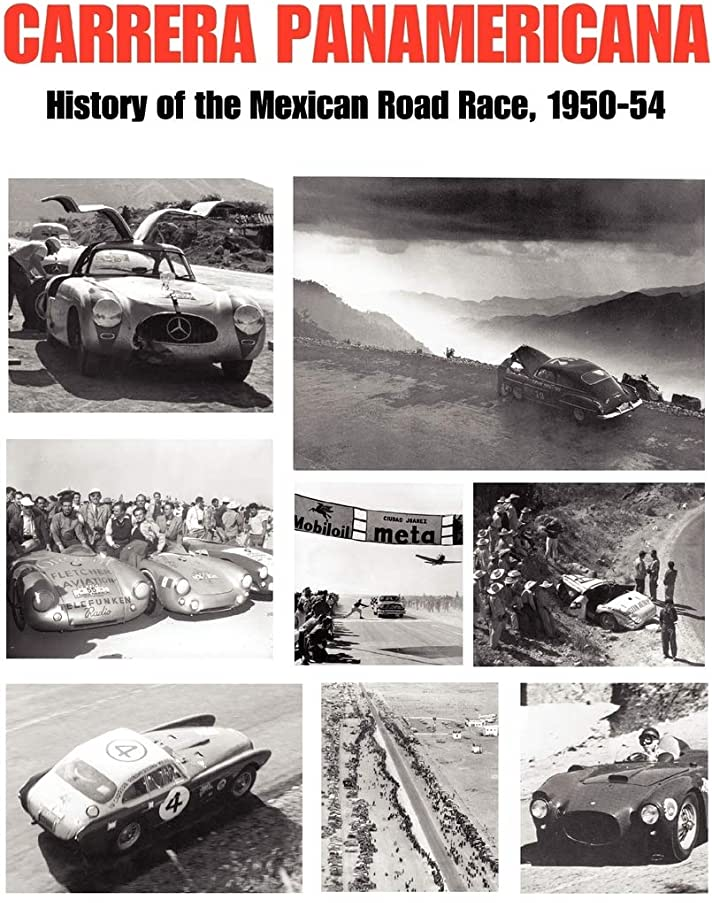
‘Carrera Panamericana’ เป็นงานแข่งรถแรลลี่ของรถสต็อก รถทัวร์ริ่ง และรถสปอร์ต บนถนนโล่ง ๆ ในเม็กซิโก ซึ่งคล้ายกับการแข่งขันรถสนาม Mille Miglia และสนาม Targa Florio ในอิตาลี ซึ่ง ‘Carrera Panamericana’ ซึ่งได้จัดการแข่งขันติดต่อกันเป็นเวลา 5 ปีตั้งแต่ปี ค.ศ. 1950 ถึง ค.ศ. 1954 เป็นแข่งขันรถแรลลี่ที่ได้รับการยกย่องและยอมรับอย่างกว้างขวางว่า เป็นการแข่งขันที่อันตรายที่สุดในโลก เป็นหนึ่งในการแข่งขันที่ทดสอบความอดทนทั้งของรถและตัวนักแข่งที่ท้าทายที่สุดในประวัติศาสตร์ เป็นสนามแข่งที่ทดสอบรถยนต์ที่ดีที่สุดด้วยนักแข่งที่มีประสบการณ์และกล้าหาญที่สุดในยุคนั้น
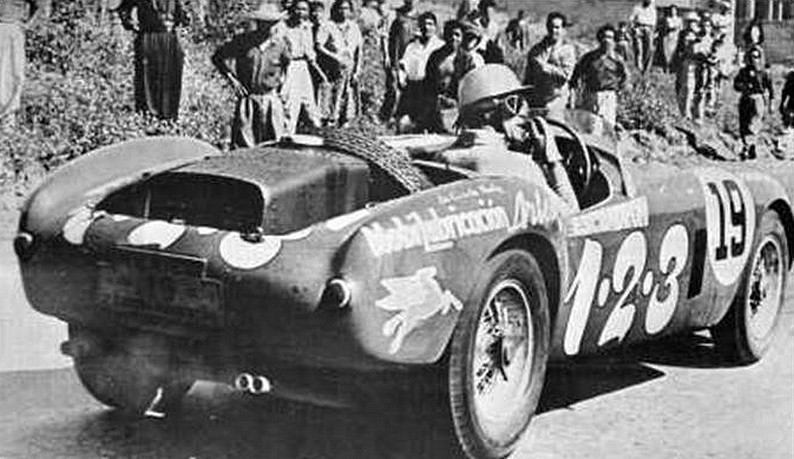
โดยบริษัท Ferrari ได้ส่ง Umberto Maglioli ลงแข่งด้วยรถ Ferrari 375 Plus ของเขา ในยุคนั้นแม้ว่า Ferrari จะเป็นรถที่มีชื่อเสียงในยุโรป แต่ก็ไม่ได้มีชื่อเสียงในทวีปอเมริกา โดยเฉพาะตลาดรถยนต์ในสหรัฐฯ และแบรนด์ Ferrari ในตอนนั้นยังห่างไกลจากการเป็นธุรกิจที่มีศักยภาพทางเศรษฐกิจ Ferrari จำเป็นอย่างยิ่งที่จะต้องพิสูจน์ให้คนอเมริกันเห็นว่า รถของพวกเขาเหนือกว่า รวดเร็วกว่า และเชื่อถือได้ การชนะการแข่งขัน Carrera Panamericana จะทำให้พวกเขาเป็นที่รู้จัก และสร้างยอดขายในสหรัฐอเมริกาได้ ซึ่งจะช่วยให้แบรนด์ Ferrari รอดพ้นจากการล้มละลาย


Umberto Maglioli เข้าร่วมการแข่งขันด้วยรถ Ferrari 375 Plus ในขณะเขาเป็นผู้นำใน Stage ที่ 4 และอยู่ระหว่างจากแข่งขันใน Stage ที่ 5 อันเป็น Stage สุดท้ายของการแข่งขัน ไม่นานก่อนจะจบ Stage ที่ 4 รถ Ferrari 375 Plus ของเขาเริ่มเสีย ด้วยอาการน้ำมันรั่วผ่านรูในคาร์บูเรเตอร์ ท่ามกลางความห่างไกลและไม่มีชิ้นส่วนอะไหล่สำหรับส่วนสำคัญของรถ ความหวังที่จะจบการแข่งขันแทบจะเป็นศูนย์

และเมื่อรถ Ferrari 375 Plus ของเขาจวนจะหยุดทำงาน Umberto Maglioli ก็ได้หยุดรถกลางถนนเมื่อเขาเห็นอู่ซ่อมรถยนต์เล็ก ๆ ชื่อว่า ‘El Milagro’ ซึ่งมี Renato Martinez เป็นเจ้าของและช่างเครื่องเพียงคนเดียวของอู่ ที่อยู่ในที่สถานที่ห่างไกลและกันดารแห่งนี้ หลังจากตรวจดูอาการขอรถ Ferrari 375 Plus แล้ว Martinez ช่างและเจ้าของอู่ก็ยืนยันกับ Maglioli ว่า อาการแท้จริงแล้วเกิดจากน้ำมันรั่วในห้องข้อเหวี่ยง และเขามีวิธีแก้ไขที่ ‘สร้างสรรค์’ เพื่อซ่อมแซมโดยใช้เวลาไม่นาน อย่างน้อยก็จะสามารถทำให้ Maglioli เสร็จสิ้นการแข่งขันของเขาได้

ว่าแล้ว Martinez ก็เอาถังน้ำและสบู่ก้อนใหญ่ออกมา ก่อนที่จะเริ่มทำงาน เขายังได้หยิบน้ำอัดลมสามขวดเล็กส่งให้ Maglioli แล้วพูดว่า “ในขณะที่คุณดื่มน้ำอัดลมนี้ ผมก็จะซ่อมรถของคุณ” แม้ Maglioli จะไม่เชื่อว่า Martinez ทำได้ แต่เขาก็ทำได้เพียงแค่ดื่มน้ำอัดลมและรอปาฏิหาริย์ ในขณะเดียวกัน Martinez ก็จัดการรื้อเครื่องยนต์ของรถ Ferrari 375 Plus แล้วใช้สบู่ค่อย ๆ ถูบริเวณที่ชำรุดเสียหายของเครื่องยนต์อย่างใจเย็น จากการถูเสียดสีสบู่ก็ค่อย ๆ ละลาย กลายเป็นแผ่นสบู่ที่สามารถปิดรูรั่ว โดยสบู่จะป้องกันน้ำมันรั่ว และเกาะติดกับโลหะในห้องข้อเหวี่ยง แล้วเมื่อแข็งตัวสบู่ก็จะแข็งเหมือนหิน
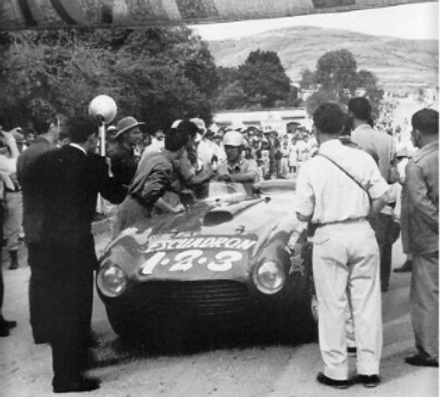
Maglioli รู้สึกประหลาดใจ และขอบคุณ Renato พร้อมทั้งดึงกล้อง Rolleiflex ขนาดเล็กออกมาจากรถ Ferrari ซึ่งเขาใช้จับภาพช่วงเวลาอันน่าอัศจรรย์นั้น เป็นภาพถ่าย ณ อู่ ‘El Milagro’ โดย Renato Martinez ซึ่งยืนถัดจากรถ Ferrari 375 Plus ซึ่งอยู่ระหว่างการซ่อมแซม และต่อมารูปนี้ถือว่าเป็นหนึ่งในรูปอมตะของบริษัท Ferrari
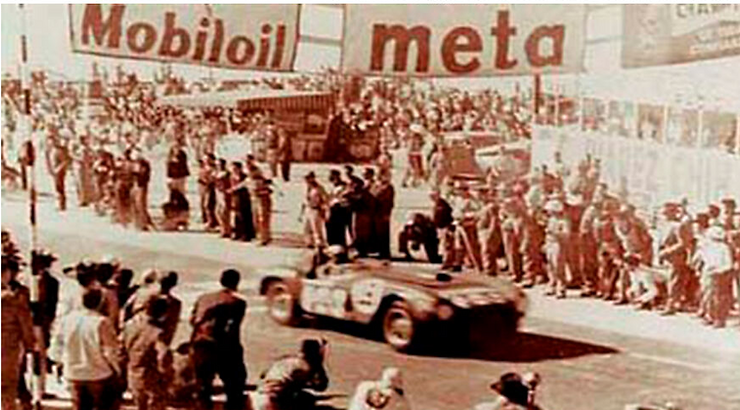
Umberto Maglioli ขับรถ Ferrari 375 Plus ของเขา จบการแข่งขันใน Stage ที่ 5 เป็นที่ 1 และเปลี่ยนประวัติศาสตร์ของบริษัท Ferrari ไปตลอดกาล หลังจากนั้นไม่นาน Renato Martinez ก็ได้รับรูปถ่ายที่ Maglioli ถ่ายในช่วงเวลานั้นทางไปรษณีย์ ภาพถ่ายได้รับมีข้อความว่า “ถึงเพื่อนของผม Renato M. จาก Umberto Maglioli” ภาพถ่ายนี้มาพร้อมกับจดหมายขอบคุณ Renato ซึ่งเขียนว่า “Renato, The Mexican Miracle ผู้ซึ่งได้ช่วยบริษัท Ferrari” เอาไว้ จดหมายนั้นลงนามโดย Enzo Ferrari
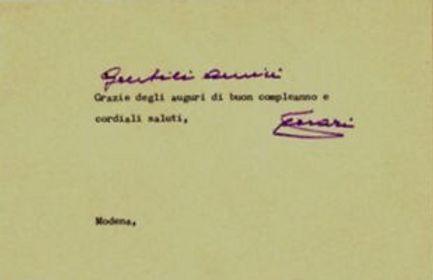
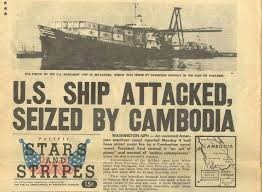
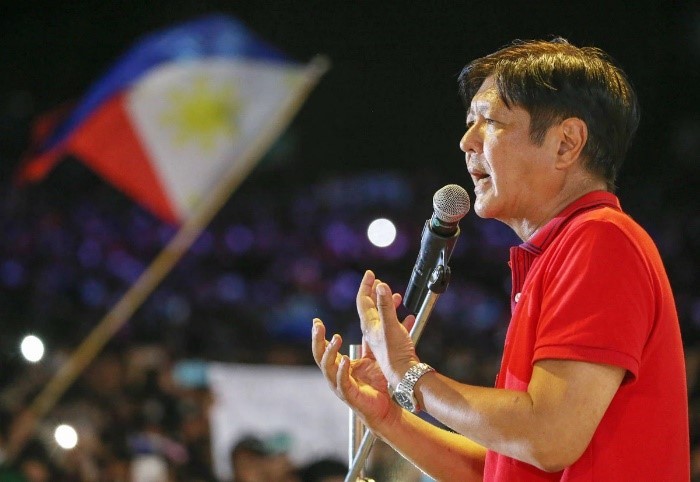
บอง บอง เฟอร์ดินาน มาร์กอส จูเนียร์ ประธานาธิบดีฟิลิปปินส์
เมื่อการเลือกตั้งในบ้านเราจบลง พรรคการเมืองที่มหาอำนาจชาติตะวันตกอย่างสหรัฐอเมริกา วาดหวังที่จะให้เป็นรัฐบาลก็ได้รับเลือกตั้งเข้ามาเป็นอันดับหนึ่งและสอง ด้วยหมายมั่นปั้นมือว่าจะกลับมามีบทบาทและอิทธิพลในภูมิภาคนี้ หลังจากที่ประสบความสำเร็จในการสนับสนุน บอง บอง เฟอร์ดินาน มาร์กอส จูเนียร์ จนได้เป็นประธานาธิบดีฟิลิปปินส์ และยินยอมเปิดรับการกลับเข้ามาฟิลิปปินส์ของสหรัฐฯ หลังจาก โรดรีโก โรอา ดูแตร์เต อดีตประธานาธิบดีฟิลิปปินส์แสดงบทบาทท่าที่แข็งกร้าวกับรัฐบาลสหรัฐฯ โดยตลอด
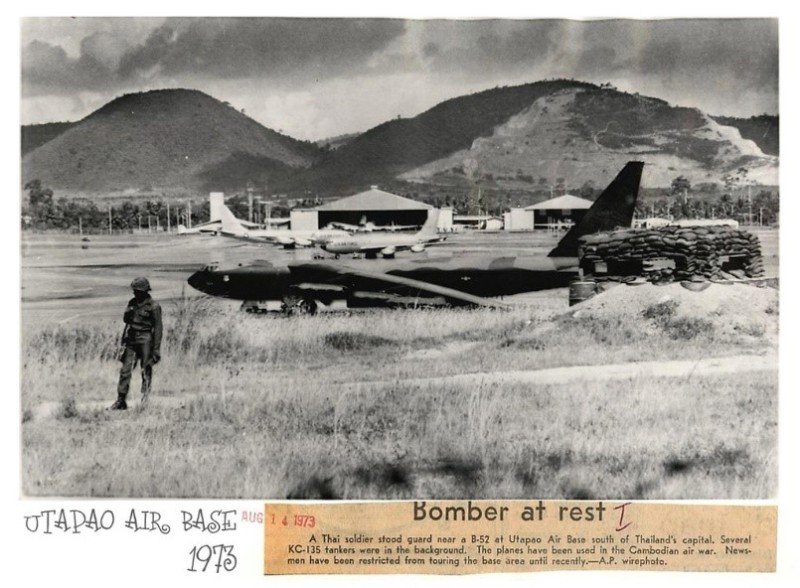
สนามบินอู่ตะเภา
ด้วยจุดมุ่งหมายของสหรัฐฯ ที่จะกลับมามีบทบาทและอิทธิพลในภูมิภาคนี้คือ การใช้ประเทศในภูมิภาคนี้เป็นพันธมิตรในการปิดล้อมจีน และสิ่งที่สหรัฐฯ หมายมั่นปั้นมือที่สุดในไทยคือ การกลับเข้ามาใช้สนามบินอู่ตะเภาอันเป็นสนามบินที่สหรัฐฯ สร้างเอาไว้ในยุคสงครามเย็น โดยเป็นฐานทัพอากาศที่มีเครื่องบินทิ้งระเบิดแบบ B-52 ประจำการ และใช้เป็นฐานปฏิบัติการในการทิ้งระเบิดในเวียดนาม ลาว เพราะสนามบินอู่ตะเภามีความพร้อมในการรองรับกองกำลังทางอากาศของสหรัฐฯ และยังเป็นจุดยุทธศาสตร์ทางทหารที่ดีที่สุดในภูมิภาคนี้ที่ครอบคลุมทะเลจีนใต้ (มหาสมุทรแปซิฟิก) และทะเลอันดามัน (มหาสมุทรอินเดีย) ซึ่งจะทำให้ราชอาณาจักรไทยอันเป็นที่รักยิ่งของเราทุกคน กลับมาอยู่ในวงของความขัดแย้งของสหรัฐฯ และจีนโดยตรง เช่นที่เคยเกิดขึ้นในยุคสงครามเย็น โดยเฉพาะสงครามอินโดจีนหรือสงครามเวียดนาม อีกครั้งหนึ่ง
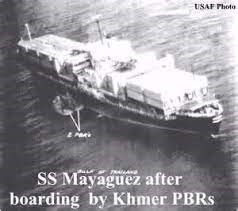
สำหรับวิกฤตการณ์ Mayaguez (มายาเกซ/มายาเกวซ) อันเป็นจุดจบของฐานทัพของสหรัฐฯ ในไทย และจุดเริ่มต้นแห่งความสัมพันธ์ไทย-จีน เกิดขึ้นเมื่อบ่ายวันที่ 12 พฤษภาคม พ.ศ. 2518 ขณะที่เรือสินค้า SS Mayaguez บรรทุกอาหาร และเวชภัณฑ์เดินเรือในน่านน้ำสากลจากฮ่องกง ผ่านใกล้ชายฝั่งกัมพูชาเพื่อไปยังท่าเรือสัตหีบ จังหวัดชลบุรี ได้ถูกเรือติดอาวุธของรัฐบาลกัมพูชาประชาธิปไตย (เขมรแดง) ยึดเรือ และจับลูกเรือ 39 คนเป็นตัวประกัน โดยอ้างเรือสินค้า SS Mayaguez ว่ารุกล้ำน่านน้ำกัมพูชา (ในเขตน่านน้ำซึ่งอยู่ห่างจากฝั่งของประเทศกัมพูชาประมาณ 60 ไมล์) รัฐบาลสหรัฐฯ ได้ทำการตอบโต้อย่างแข็งกร้าวและรวดเร็ว เพราะเห็นเป็นโอกาสอันดีที่ผู้นำสหรัฐฯ จะสามารถแสดงอำนาจและความเด็ดขาดให้ปรากฏแก่ชาวโลก เนื่องจากว่าเพียงแค่เดือนก่อนหน้านั้นทั้งกัมพูชาและเวียดนามใต้ได้พ่ายแพ้แก่กองกำลังคอมมิวนิสต์ ซึ่งสร้างความสั่นคลอนอย่างยิ่งแก่เกียรติภูมิและความภูมิใจแห่งชาติของชาวอเมริกัน
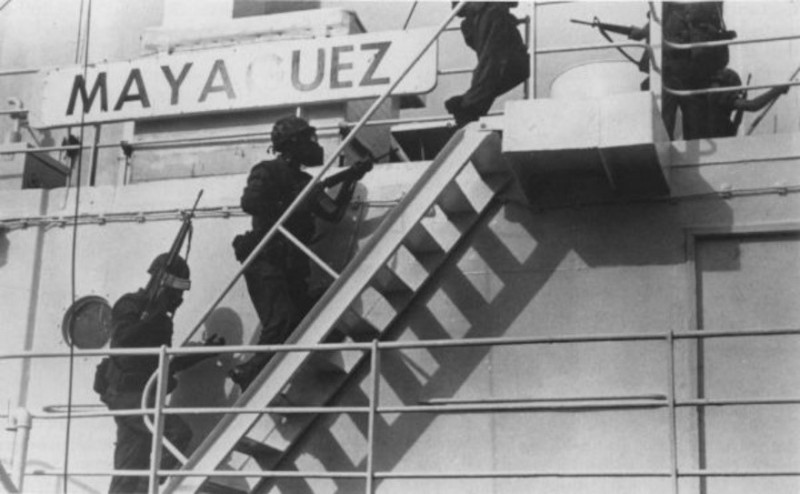
ปฏิบัติการทางทหารของสหรัฐฯ เพื่อชิงเรือ SS Mayaguez คืนเกิดขึ้นโดยนาวิกโยธินอเมริกันจากเกาะโอกินาวาและอ่าวซูบิก ที่ถูกส่งมายังฐานทัพอเมริกันที่อู่ตะเภาในวันที่ 13 พฤษภาคม ได้บุกจู่โจมชิงเรือ SS Mayaguez และลูกเรือคืนในเช้ามืดวันที่ 14 พฤษภาคม โดยมีเครื่องบินรบจากฐานทัพอเมริกันที่อุดรธานีและโคราชออกปฏิบัติการร่วมด้วย และประสบความสำเร็จในเวลาประมาณ 11.00 น. การใช้ดินแดนไทยเพื่อปฏิบัติการทางทหารครั้งนี้ เกิดขึ้นโดยขัดต่อเจตนารมณ์ของรัฐบาลไทย ซึ่งมิได้รับรู้ถึงปฏิบัติการครั้งนี้เลย ทั้งที่ก่อนหน้านี้ นายกรัฐมนตรี ม.ร.ว.คึกฤทธิ์ ปราโมช ได้แจ้งแก่อุปทูตสหรัฐฯ ประจำประเทศไทยในวันที่ 13 พฤษภาคม แล้วว่า ไทยไม่ยินยอมให้ใช้ดินแดนไทยในทางการทหารใด ๆ เพื่อตอบโต้กัมพูชา แม้ว่า ก่อนการดำเนินภารกิจนี้ สถานทูตสหรัฐฯ ได้แจ้งแผนการใช้กำลังต่อพลเอกเกรียงศักดิ์ ชมะนันท์ รองผู้บัญชาการทหารสูงสุด ซึ่งเป็นผู้ที่สหรัฐฯ ติดต่อด้านการทหารเป็นประจำ พลเอกเกรียงศักดิ์ได้ให้อนุญาต โดยมิได้แจ้งแก่รัฐบาลไทย และรัฐบาลไทยซึ่งรับรู้สถานการณ์ภายหลังจากที่สหรัฐฯ ดำเนินภารกิจเสร็จสิ้นแล้ว ก็ได้แถลงว่าการกระทำครั้งนี้เป็นการละเมิดอธิปไตยไทย และได้ยื่นบันทึกประท้วงต่ออุปทูตสหรัฐฯ พร้อมทั้งระบุให้ถอนนาวิกโยธินออกทั้งหมดภายใน 24 ชั่วโมง
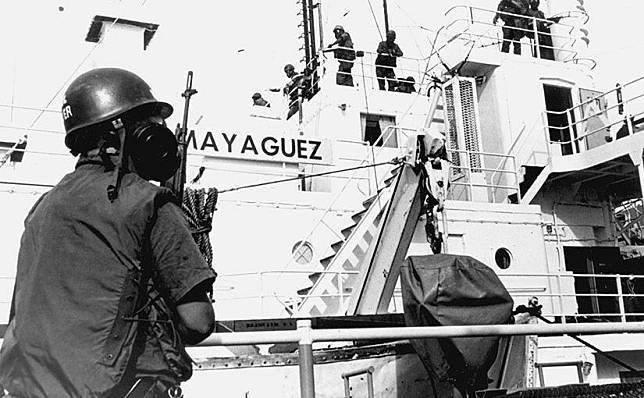
อย่างไรก็ตาม เหตุการณ์นี้ได้สร้างความสะเทือนกว้างไกล กลุ่มการเมืองต่าง ๆ ได้แสดงปฏิกิริยาประท้วงและประณามสหรัฐฯ อย่างรวดเร็วและอย่างสอดคล้องกัน ซึ่งขัดแย้งกับบริบทการเมืองไทยขณะนั้น ที่มีความขัดแย้งทางความคิดทางการเมืองอย่างรุนแรงในสังคม (ไม่ต่างไปจากเหตุการณ์ที่เกิดขึ้นในขณะนี้) ดังที่บทความหนึ่งในหนังสือพิมพ์สยามรัฐ วันที่ 16 พฤษภาคม พ.ศ. 2518 ระบุว่า “ไม่มีครั้งใดในการเมืองไทยที่คนไทยทั้งชาติจะแสดงปฏิกิริยาโต้ตอบต่อรัฐบาลสหรัฐฯรุนแรงเท่าครั้งนี้” การเคลื่อนไหวเริ่มขึ้นในวันที่ 15 พฤษภาคม โดยพรรคการเมืองฝ่ายค้านทุกพรรคได้เรียกร้องให้เปิดประชุมสภาวิสามัญ เพราะเห็นว่าเหตุการณ์เป็นภาวะคับขันและเกี่ยวข้องกับเอกราชและอธิปไตยของชาติ หนังสือพิมพ์แทบทุกฉบับของไทยได้เรียกร้องให้รัฐบาลทบทวนความสัมพันธ์ไทย – อเมริกัน เพื่อให้ตั้งอยู่บนพื้นฐานที่เท่าเทียมกัน แต่ปฏิกิริยาที่รุนแรงที่สุดมาจากศูนย์กลางนิสิตนักศึกษาแห่งประเทศไทย ซึ่งได้จัดการชุมนุมประท้วงสหรัฐฯ ที่สนามหลวงและมีผู้เข้าร่วมหลายพันคน ต่อมาในวันที่ 16 พฤษภาคม คณะรัฐมนตรีได้มีมติให้ส่งบันทึกประท้วงถึงรัฐมนตรีต่างประเทศสหรัฐฯ พร้อมทั้งเรียกตัวเอกอัครราชทูตไทยประจำสหรัฐฯ กลับ พร้อมทั้งประกาศที่จะทบทวนสัญญาและข้อผูกพันระหว่างไทยกับสหรัฐฯ ที่มีทั้งหมด ส่วนการชุมนุมที่นำโดยศูนย์นิสิตนักศึกษาฯ ที่มหาวิทยาลัยธรรมศาสตร์ได้ขีดเส้นตายให้รัฐบาลสหรัฐฯต้องขอโทษไทยภายใน 24 ชั่วโมง หลังจากที่ไม่มีปฏิกิริยาใด ๆ จากรัฐบาลสหรัฐฯ ในวันต่อมากลุ่มผู้ชุมนุมเคลื่อนขบวนจากมหาวิทยาลัยธรรมศาสตร์มายังหน้าสถานทูตสหรัฐฯ อดีตผู้นำนักศึกษาในเหตุการณ์ 14 ตุลาคม พ.ศ. 2516 ได้เข้าร่วมด้วย เช่น นายธีรยุทธ บุญมี และ นายเสกสรร ประเสริฐกุล เป็นต้น
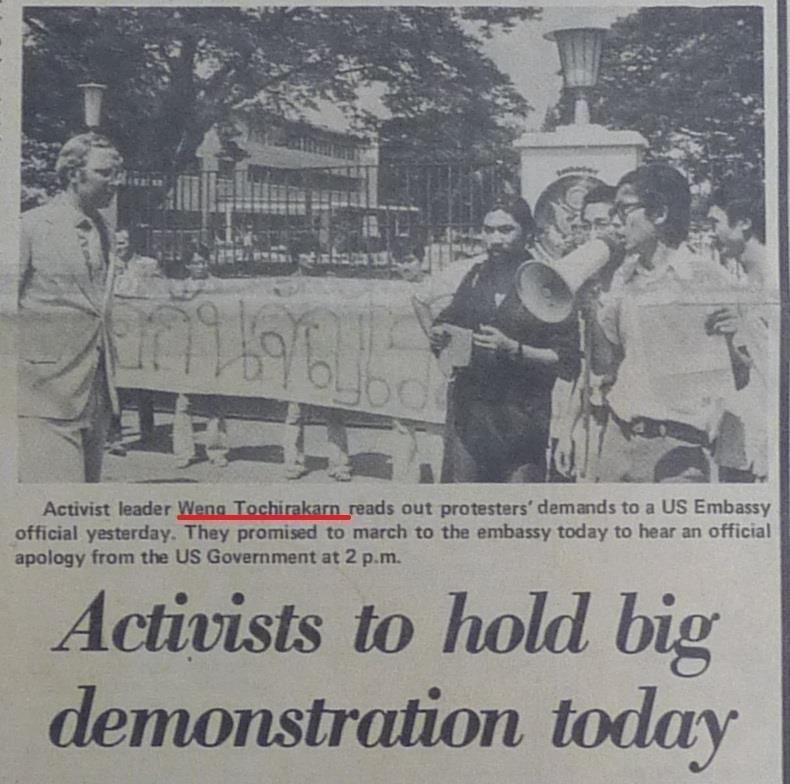
นพ.เหวง โตจิราการ หนึ่งแกนนำการประท้วงสหรัฐฯ ในขณะนั้น
ในวันที่สามของการชุมนุมประท้วงมีผู้เข้าร่วมการชุมนุมจำนวนถึงกว่าหนึ่งหมื่นคน สหภาพกรรมกร 61 แห่งได้ประกาศเข้าร่วมด้วย และขู่จะทำลายธุรกิจของบริษัทที่ชาวอเมริกันเป็นเจ้าของถ้าสหรัฐฯยังไม่ขอโทษไทย นอกจากนี้ ยังมีการชุมนุมของนักศึกษาที่มหาวิทยาลัยเชียงใหม่และมหาวิทยาลัยสงขลานครินทร์ด้วย ผู้ชุมนุมที่หน้าสถานทูตสหรัฐฯได้เผาหุ่นประธานาธิบดีฟอร์ดและ ดร.เฮนรี่ คิสซิงเจอร์ รัฐมนตรีต่างประเทศสหรัฐฯ ซึ่งมีความผิดตามคำพิพากษาของ “ศาลประชาชน” คือ “เป็นฆาตกรเลือดเย็น ฆ่าประชาชนหลายหมื่นคนในอินโดจีนและหลอกลวงประชาชนไทย”
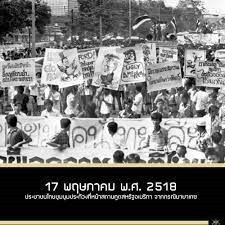
นายธีรยุทธ บุญมี ได้ประกาศด้วยว่าหากประธานาธิบดีฟอร์ดไม่ขอโทษประชาชนไทยเองภายใน 24 ชั่วโมง ก็จะเผาธงชาติอเมริกันซึ่ง “เป็นการทำลายสัญลักษณ์ของจักรวรรดินิยมอเมริกา” การชุมนุมได้เกิดความวุ่นวายขึ้นเมื่อผู้ชุมนุมกรูกันเข้าไปแกะตราสถานทูตฯซึ่งเป็นรูปนกอินทรีลงกระทืบและติดรูปอีแร้งแทน ป้ายชื่อสถานทูตถูกทับด้วยป้าย ‘ซ่องโจร’ และขณะที่เหตุการณ์กำลังชุลมุนนั้น ก็มีคนกลุ่มหนึ่งแต่งตัวเป็นชาวเวียดนามกระชากธงชาติอเมริกันลงมาปัสสาวะรดกลางที่ชุมนุม ซี่งในขณะเกิดเหตุการณ์ทั้งหมดนั้น กำลังตำรวจที่ดูแลบริเวณนั้นมิได้เข้าจัดการหรือขัดขวางใด ๆ

สถานการณ์ที่เกิดขึ้นสร้างความวิตกกังวลแก่ผู้นำรัฐบาลมาก และต้องการยุติการชุมนุมโดยเร็วที่สุด ดังนั้น เมื่ออุปทูตสหรัฐฯ ขอพบเพื่อหารือสถานการณ์ พลตรีชาติชาย ชุณหะวัณ รัฐมนตรีต่างประเทศก็ได้ขอให้ส่งสารขอโทษไทย ในเช้าวันต่อมาอุปทูตสหรัฐฯ ได้ยื่นบันทึกของอุปทูตต่อพลตรีชาติชาย ซึ่งมีใจความบางตอนว่า “รัฐบาลสหรัฐฯ เข้าใจถึงปัญหาที่ได้สร้างให้แก่รัฐบาลไทย…และขอย้ำว่า มีความเสียใจในเรื่องที่เกิดขึ้นนี้ สหรัฐฯ ยังคงมีนโยบายที่จะเคารพต่ออธิปไตยและเอกราชของไทยเสมอ…และเหตุการณ์ทำนองนี้จะไม่เกิดขึ้นอีก” พลตรีชาติชายกล่าวในเวลาต่อมาว่า พอใจต่อบันทึกนี้ และคำขอโทษจากประธานาธิบดีฟอร์ดก็ไม่จำเป็นอีกต่อไป และได้ส่งสำเนาบันทึกแก่ผู้นำการชุมนุมที่หน้าสถานทูต กลุ่มผู้ชุมนุมได้ประกาศว่า “รัฐบาลสหรัฐฯ ได้ขอขมาแล้ว” และประกาศก่อนเลิกการชุมนุมว่าการต่อสู้ครั้งนี้เป็นเพียงจุดเริ่มต้นเท่านั้น ส่วนจุดสุดท้ายคือการขับไล่ฐานทัพอเมริกันทั้งหมดออกไป
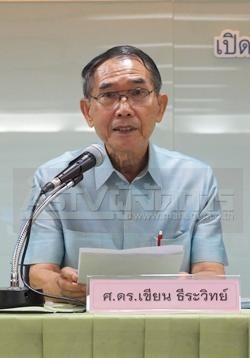
ปฏิกิริยารุนแรงของนักศึกษาและสาธารณชน ต่อเหตุการณ์มายาเกวซเกิดขึ้นในบริบทการเมืองไทยหลังเหตุการณ์ 14 ตุลาคม ที่มีข้อเรียกร้องจากหลายกลุ่มให้รัฐบาลดำเนินนโยบายที่เป็นอิสระจากสหรัฐฯ กลุ่มเหล่านี้ซึ่งมีทั้งนักวิชาการ นักหนังสือพิมพ์ นักการเมืองพลเรือนและนักศึกษา มีทัศนะว่า นโยบายต่างประเทศที่ผูกพันกับสหรัฐฯ อย่างแน่นแฟ้นนั้นถูกกำหนดโดยผู้นำทหารซึ่งมีผลประโยชน์สอดคล้องกับสหรัฐฯ และเป็นความสัมพันธ์ที่เป็นประโยชน์กับสหรัฐฯ มากกว่า โดยเฉพาะฐานทัพและทหารอเมริกันในประเทศไทยก็คือ สัญลักษณ์ของความสัมพันธ์ที่ไม่เท่าเทียมกันที่ต้องให้หมดไปโดยเร็ว อีกทั้งทำให้ไทยสูญเสียอธิปไตยและไร้เกียรติภูมิประเทศ นักวิชาการ เช่น ดร.เขียน ธีระวิทย์ กล่าวใน พ.ศ. 2518 ว่า หากฐานทัพอเมริกันยังอยู่ต่อไป “จะสร้างความแตกแยกให้คนในชาติมากขึ้น อาจเกิดการตั้งขบวนการสังหารชาวอเมริกันและทหารอเมริกันในไทย เพราะคนไทยทุกวันนี้มีความเกลียดชังทหารอเมริกัน” ส่วนนักศึกษาฝ่ายซ้ายกลุ่มหนึ่งในเวลานั้นก็ได้ผลิตงานเขียนหรือกล่าวเสมอในที่สาธารณะว่า สหรัฐฯ เป็น ‘จักรวรรดินิยม’ ที่เอาเปรียบประเทศเล็กทั่วไปรวมทั้งไทยด้วย การชุมนุมของนักศึกษาครั้งนี้ดูเหมือนประสบความสำเร็จเพราะรัฐบาลได้ตอบโต้สหรัฐฯ อย่างแข็งกร้าว อย่างไรก็ตาม การตอบโต้ของรัฐบาลยังเป็นเพราะสาเหตุอื่นด้วย กล่าวคือ ผู้นำพลเรือนกลุ่มหนึ่งก็มีทัศนะว่าจะต้องปรับเปลี่ยนความสัมพันธ์ไทย – อเมริกันที่มีลักษณะ ‘ลูกพี่ – ลูกน้อง’ และเน้นด้านการทหารให้มีลักษณะที่สมดุลมากขึ้น เหตุการณ์ ‘เรือ SS Mayaguez’ จึงเป็นโอกาสที่จะแสดงความเป็นตัวของตัวเองแก่สหรัฐฯ และประเทศเพื่อนบ้านอินโดจีนที่รัฐบาลกำลังพยายามสร้างไมตรีด้วย นอกจากนี้ ก็เป็นโอกาสที่รัฐบาลจะมีบทบาทในเรื่องความมั่นคงที่ก่อนหน้านั้น ถือเป็นเรื่องของฝ่ายทหารที่รัฐบาลพลเรือนช่วงหลังเหตุการณ์ 14 ตุลาคม แทบไม่มีส่วนร่วมในการตัดสินใจ
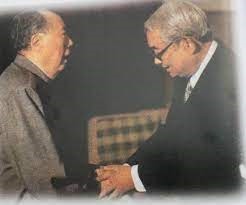
อย่างไรก็ตาม เหตุการณ์นี้ก็ทำให้รัฐบาลไทยอยู่ในฐานะลำบากเพราะฝ่ายทหารยังคงมีอำนาจในการเมืองไทย และต้องการความช่วยเหลือด้านการทหารจากสหรัฐฯ ต่อไป ขณะเดียวกัน สหรัฐฯ ยังคงเป็นมหาอำนาจที่ผู้นำไทยทุกกลุ่มให้ความสำคัญมากที่สุด และหากจำเป็นก็ยังคงหวังพึ่งพามากที่สุดด้วย ดังนั้น รัฐบาลไทยจึงต้องยุติเหตุการณ์ทั้งหมดอย่างรวดเร็วโดยการยอมรับ ‘สารแสดงความเสียใจ’ จากอุปทูตอเมริกันประจำประเทศไทยที่มิใช่ ‘คำขอโทษ’ จากรัฐบาลอเมริกัน ต่อมาในเดือนกรกฎาคม พ.ศ. 2518 ม.ร.ว.คึกฤทธิ์ ปราโมช นายกรัฐมนตรี จึงนำคณะเดินทางไปเยือนสาธารณรัฐประชาชนจีนเป็นครั้งแรก โดยมีโอกาสพบกับผู้นำของจีน ทั้งประธานเหมา เจ๋อตง นายกรัฐมนตรี โจว เอินไหล และ รองนายกรัฐมนตรี เติ้ง เสี่ยวผิง รวมทั้งได้มีพิธีลงนามสถาปนาความสัมพันธ์ทางการทูตต่อกันนับแต่นั้นมาจนถึงปัจจุบัน
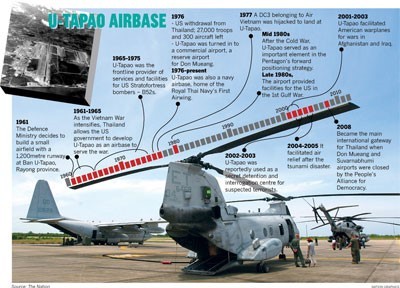
ในปี พ.ศ. 2518-2519 คนรุ่นใหม่สมัยนั้นเป็นคนไล่ฐานทัพอเมริกันออกไป แต่พอ พ.ศ. 2566 คนรุ่นใหม่สมัยนี้กลับมาสนับสนุนพรรคการเมือง ที่มีแนวโน้มจะให้ฐานทัพอเมริกันกลับมาในประเทศไทยอีก
เรื่อง : ดร.ปุณกฤษ ลลิตธนมงคล
ที่ปรึกษาด้านการบริหารจัดการสมัยใหม่ อาจารย์พิเศษหลักสูตรปริญญาโทและเอก นักเล่าเรื่องมากมายในหลากหลายมิติ เป็นผู้ที่ชื่นชมสนใจในประวัติศาสตร์สงครามสมัยใหม่ตลอดจนอาวุธยุทโธปกรณ์ต่างๆ
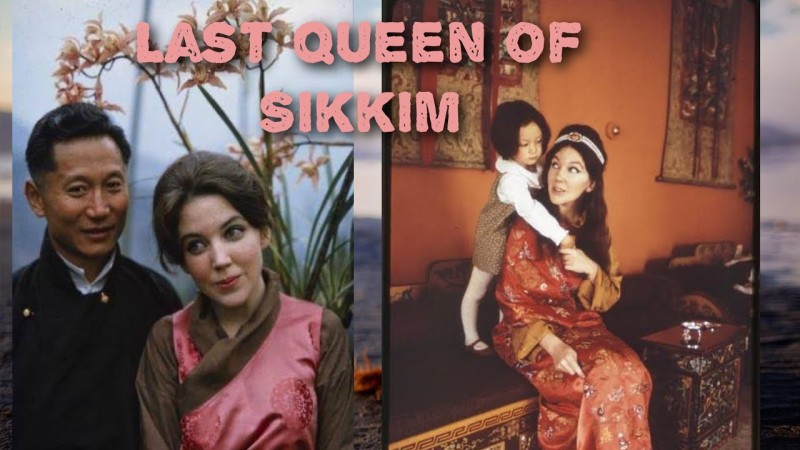
หลายคนอาจจะไม่คุ้นเคยกับคำว่า ‘ราชอาณาจักรสิกขิม’ ผมจึงขอเล่าถึง ‘ราชอาณาจักรสิกขิม’ ให้เพื่อน ๆ พี่ ๆ น้อง ๆ ได้ทราบเป็นสังเขปก่อนครับ
‘ราชอาณาจักรสิกขิม’ ก็คือ ‘รัฐสิกขิม’ ของสาธารณรัฐอินเดียในปัจจุบัน โดยรัฐสิกขิมเป็นรัฐทางตะวันออกเฉียงเหนือของประเทศอินเดีย มีพื้นที่ติดต่อกับทิเบต ประเทศภูฏาน ประเทศเนปาล และรัฐเบงกอลตะวันตก
รัฐสิกขิมเป็นรัฐที่มีประชากรน้อยที่สุดของอินเดีย และมีพื้นที่น้อยที่สุดเป็นอันดับสอง พื้นที่ของรัฐนี้ประมาณ 35% อยู่ในเขตอุทยานแห่งชาติคางเชนดองซา อันเป็นแหล่งมรดกโลก อีกทั้ง ‘ราชอาณาจักรสิกขิม’ เป็นประเทศที่สูญเสียเอกราชให้กับอินเดียด้วยลัทธิประชาธิปไตย
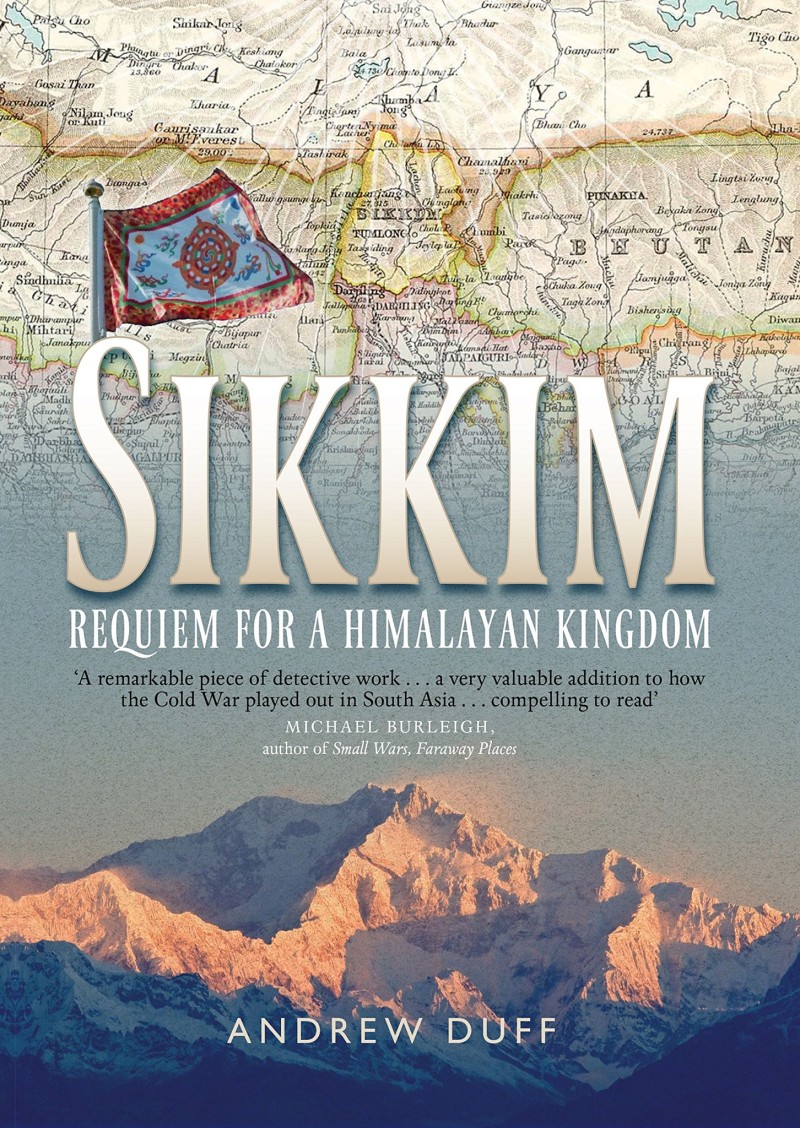
ราชอาณาจักรสิกขิม ก่อตั้งขึ้นในศตวรรษที่ 17 และปกครองโดยกษัตริย์นักบวชชาวพุทธซึ่งเรียกว่า ‘โชเกล (Chogyal)’ ราชอาณาจักรสิกขิมเป็นราชอาณาจักรที่ปกครองยาวนานมาเป็นเวลา 333 ปี ปกครองโดย ‘โชเกล’ ซึ่งได้รับการสถาปนาตั้งแต่ปี พ.ศ. 2185 (ค.ศ 1642) ราชอาณาจักรสิกขิมกลายเป็นเป็นรัฐในอารักขาของจักรวรรดิบริติชตั้งแต่ปี พ.ศ. 2404 (ค.ศ. 1861)
ต่อมาในปี พ.ศ. 2433 (ค.ศ. 1890) ภายใต้สนธิสัญญา Tumlong สิกขิมกลายเป็นรัฐมหาราชาหนึ่งภายใต้บริติชอินเดียจนถึงปี พ.ศ. 2490 (ค.ศ. 1947) และเป็นรัฐในอารักขาของประเทศอินเดียตั้งแต่ปี พ.ศ. 2493 (ค.ศ.1950) จนถึงปี พ.ศ. 2518 (ค.ศ. 1975) (โดยในปี พ.ศ. 2516 (ค.ศ. 1973) เกิดการจลาจล ฝ่ายปฏิกษัตริย์นิยมได้เข้ายึดพื้นที่บริเวณหน้าพระราชวังของช็อกยัลเพื่อต่อต้านระบอบกษัตริย์สิขขิม)
จนกระทั่งปี พ.ศ. 2518 (ค.ศ. 1975) อินเดียได้ส่งกองกำลังเข้ายึดครองกรุงกังต็อก นครหลวงของราชอาราจักรสิกขิมเพื่อปราบปรามการจลาจล และตามด้วยการจัดทำประชามติในเรื่องเกี่ยวกับการปกครองและสถาบันพระมหากษัตริย์ของสิกขิมในปี พ.ศ. 2518 (ค.ศ. 1975) ซึ่งปรากฏผลคะแนนให้ยกเลิกสถาบันพระมหากษัตริย์ และเข้าร่วมเป็นรัฐที่ 22 ของสาธารณรัฐอินเดีย วันที่ 16 พฤษภาคม ค.ศ. 1975 สิกขิมได้เข้าเป็นรัฐสมาชิกของสาธารณรัฐอินเดีย โดยรัฐสิกขิมเป็นรัฐมีอัตราการรู้หนังสือสูงที่สุดในบรรดารัฐหิมาลัย
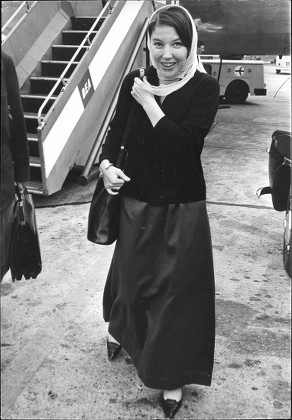
ในส่วนของสตรีที่เราจะพูดถึงในวันนี้ เธอมีชื่อว่า ‘Hope Cooke’ เกิดวันที่ 24 มิถุนายน พ.ศ. 2483 (ค.ศ. 1940) ที่นครซานฟรานซิสโก มลรัฐแคลิฟอร์เนีย สหรัฐอเมริกา บิดาของเธอ คือ John J. Cooke อเมริกันเชื้อสายไอริช ประกอบอาชีพเป็นครูการบิน ส่วนมารดาของเธอคือ Hope Noyes เป็นนักบินหญิง
Hope Cooke ถูกเลี้ยงดูและนับถือศาสนาคริสต์นิกาย Episcopal ด้วย Hope Noyes มารดาของเธอเสียชีวิตเมื่อเดือนมกราคม พ.ศ. 2485 (ค.ศ. 1942) ขณะมีอายุได้ 25 ปี จากเหตุเครื่องบินตก Hope Cooke และพี่สาวต่างบิดาถูกส่งไปให้คุณตา คุณยาย เลี้ยงดู ตาของเธอเป็นประธานบริษัท J. H. Winchester & Co ซึ่งเป็นนายหน้าขนส่งสินค้าระหว่างประเทศ แต่พอเมื่อคุณตา คุณยายของเธอเสียชีวิต เธอก็ถูกส่งไปอยู่ในการปกครองของคุณป้าและลุงเขย คือ Selden Chapin อดีตเอกอัครรัฐทูตสหรัฐประจำอิหร่านและเปรู ซึ่งทำให้เธอจบการศึกษาระดับไฮสคูลในอิหร่าน

Hope Cooke จัดว่า เป็นสตรีชั้นสูง (Celebrity) ของสังคมอเมริกัน ในปี พ.ศ. 2502 (ค.ศ. 1959) Cooke ได้เข้าศึกษาภาควิชาเอเชียศึกษาของวิทยาลัย Sarah Lawrence และเช่าห้องร่วมกับนักแสดงสาว Jane Alexander ซึ่งเรียนวิทยาลัยเดียวกัน
ในขณะเป็นนักศึกษาชั้นปีที่หนึ่งด้วยการศึกษาด้านประวัติศาสตร์ เธอได้เดินทางไปอินเดียในช่วงฤดูร้อน และได้พบกับ สมเด็จพระราชาธิบดี Palden Thondup Namgyal แห่งสิกขิมวัย 36 ชันษา ซึ่งเคยเสกสมรสแล้ว (ในขณะนั้นยังทรงเป็นมกุฎราชกุมารแห่งสิกขิม) ที่ภัตคารของโรงแรมวินดาเมียร์ เมืองดาร์จิลิงของอินเดีย (ขณะนั้น Cooke อายุเพียง 19 ปี)
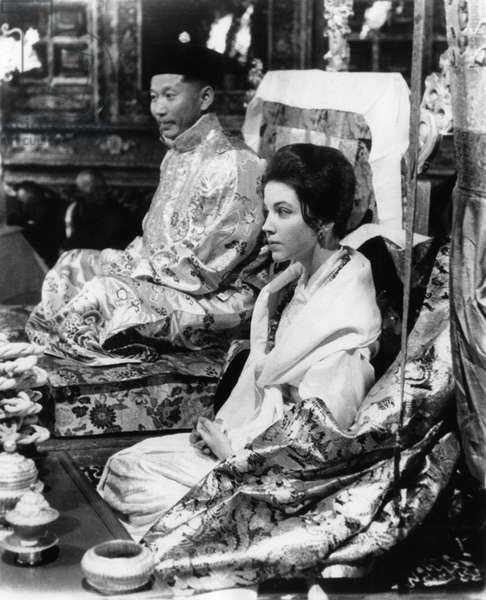
ทั้งสองรักใคร่ชอบพอกันด้วยเห็นว่า มีชีวิตวัยเด็กที่โดดเดี่ยวคล้ายคลึงกัน ในปี พ.ศ. 2504 (ค.ศ. 1961) มีการประกาศการหมั้น แต่พิธีอภิเษกสมรสถูกเลื่อนไปกว่าหนึ่งปี เพราะโหราจารย์ทั้งในสิกขิมและอินเดียต่างเตือนว่า ปี พ.ศ. 2505 (ค.ศ. 1962) นั้นเป็นปีไม่มงคลสำหรับการสมรส
ต่อมาในวันที่ 20 มีนาคม พศ. 2506 (ค.ศ. 1963) มกุฎราชกุมาร Palden Thondup Namgyal ได้อภิเษกสมรสกับ Hope Cooke ด้วยราชพิธีมงคลสมรสแบบศาสนาพุทธนิกายมหายาน โดยมีพระลามะ 14 รูป และผู้ที่มาร่วมราชพิธีดังกล่าวมีทั้งราชนิกุลของอินเดีย นายทหารชั้นผู้ใหญ่ของทั้งอินเดียและสิกขิม และเอกอัครรัฐทูตสหรัฐอเมริกาประจำอินเดีย
โดย Cooke ยอมสละสัญชาติอเมริกันตามกฎหมายของสิกขิม เพื่อไม่ให้ชาวสิกขิมเห็นว่า เธอยังเป็น ‘คนอเมริกัน’ ในประเทศแถบเทือกเขาหิมาลัย แม้ว่ามกุฎราชกุมารจะนับถือศาสนาพุทธ แต่ Hope Cooke ก็ไม่ได้เปลี่ยนศาสนาจากคริสต์เป็นพุทธอย่างเป็นทางการ แม้ว่าในช่วงยังเยาว์ เธอเคยปฏิบัติพิธีแบบพุทธศาสนาก็ตาม สื่อต่างชาติตีพิมพ์เรื่องราวที่ดูราวกับเทพนิยายของทั้งสอง ทั้งสองพระองค์ทรงมีพระโอรส 1 พระองค์ และพระธิดา 1 พระองค์
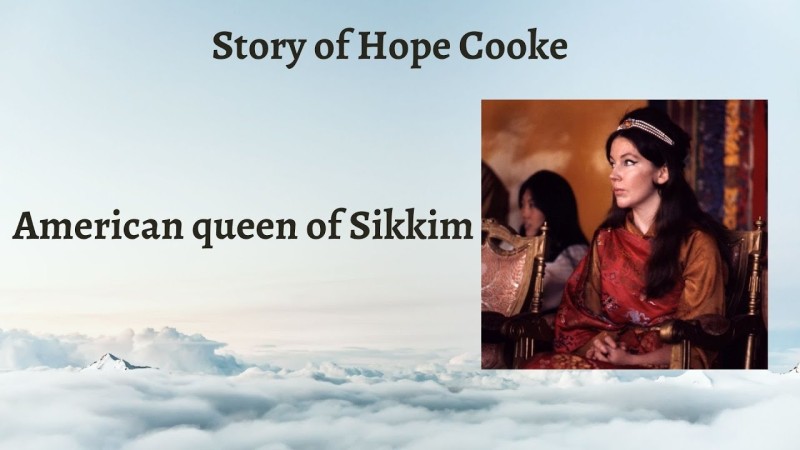
ในช่วงนั้นทั้งชาวอเมริกันและชาวโลกแทบไม่มีใครที่รู้จักราชอาณาจักรเล็ก ๆ อย่างสิกขิมเลย เมื่อมีการตีพิมพ์ลงข่าวเรื่องราวของการอภิเษกเสกสมรส พวกเขาก็เชื่อว่า ประเทศนี้เล็ก ๆ น่ารัก เป็นมิตร ผู้คนเคร่งศาสนา และสงบสุข แต่ความตึงเครียดเกิดขึ้นเมื่ออินเดียพยายามขยายลัทธิสาธารณรัฐนิยมไปยังประเทศเพื่อนบ้านข้างเคียง และความเปลี่ยนแปลงทางการเมืองทั้งในจีนและทิเบตก็ส่งผลกระทบต่อราชอาณาจักรสิกขิมด้วย
สมเด็จพระราชาธิบดี Tashi Namgyal ซึ่งทรงเป็นโชเกล (Chogyal) พระองค์ที่ 11 แห่งราชอาณาจักรสิกขิม ซึ่งครองราชย์มายาวนานตั้งแต่ปี พ.ศ. 2457 (ค.ศ. 1914) ได้ลงนามในสนธิสัญญากับอินเดียตั้งแต่ปี พ.ศ. 2493 (ค.ศ. 1950) โดยให้สาธารณรัฐอินเดียมีอำนาจเหนืออธิปไตยของราชอาราจักรสิกขิม ส่งผลให้อินเดียเข้ามาแทรกแซงกิจการภายในของสิกขิมบ่อยครั้ง เพื่อจะได้หาโอกาสผนวกเอาราชอาณาจักรสิกขิมเข้าเป็นรัฐหนึ่งของอินเดีย ด้วยอินเดียหวาดกลัวจีนคอมมิวนิสต์ที่อาจจะใช้สิกขิมและภูฏานเป็นด่านหน้าในการโจมตีอินเดีย
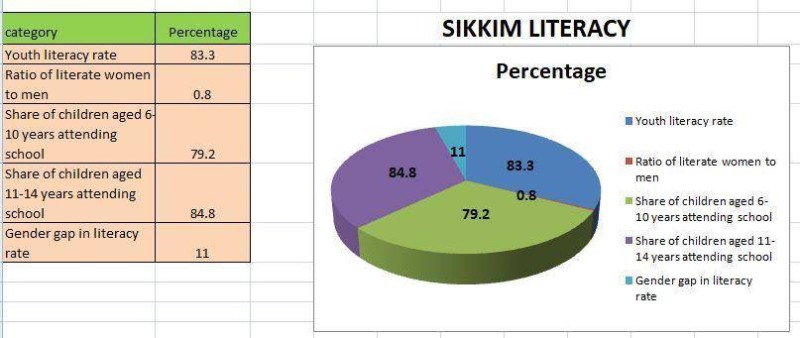
สมเด็จพระราชาธิบดี Tashi Namgyal ทรงประสบความสำเร็จในการพัฒนาประเทศ แม้ว่าสิกขิมจะเป็นราชอาณาจักรเล็ก ๆ โดดเดี่ยว ทรัพยากรน้อย แต่ชาวสิกขิมกลับมีความเป็นอยู่ที่ดีกว่าเพื่อนบ้านอย่าง เนปาล และภูฏาน อัตราการรู้หนังสือและรายได้เฉลี่ยต่อหัวของประชากรของราชอาณาจักรสิกขิมมีสูงกว่า อินเดีย (ช่วงที่เริ่มต้นการพัฒนา) เนปาล และภูฏาน แต่อำนาจทางการทหารนั้นมีน้อยกว่าอินเดียมากจนไม่อาจเทียบได้
วันที่ 2 ธันวาคม พศ. 2506 (ค.ศ. 1963) สมเด็จพระราชาธิบดี Tashi Namgyal สวรรคต มกุฎราชกุมารได้ครองราชย์เป็น สมเด็จพระราชาธิบดี Palden Thondup Namgya โชเกลพระองค์ที่ 12 แห่งสิกขิม และ Hope Cooke ได้รับการสถาปนาเป็นสมเด็จพระราชินี Hope (Queen Hope) พิธีราชาภิเษกของพระองค์ในปี พ.ศ. 2508 (ค.ศ. 1965) ได้รับความสนใจจากสังคมโลกไม่น้อย ด้วยสมเด็จพระราชาธิบดี Palden Thondup Namgya เมื่อคราวยังเป็นเจ้าชายมกุฏราชกุมารเคยทรงเป็นตัวแทนเจรจาความสัมพันธ์สิกขิมและอินเดียในคราวที่อินเดียได้รับเอกราช
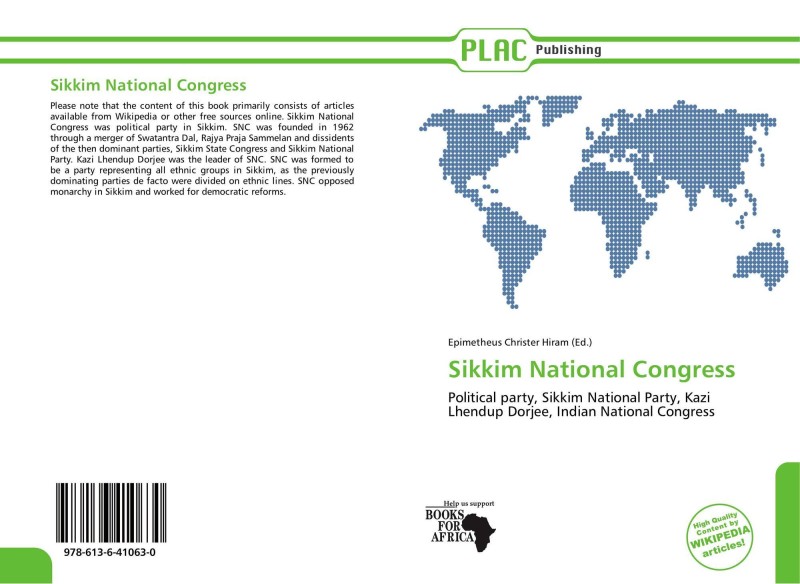
แต่เมื่อสมเด็จพระราชาธิบดี Palden Thondup Namgya ทรงราชย์สิ่งที่เป็นปัญหาใหญ่คือ บรรดาฝักฝ่ายทางการเมืองในสิกขิม โดยอินเดียให้การสนับสนุนพรรคคองเกรสแห่งชาติสิกขิม (Sikkim National Congress) อันเป็นพรรคการเมืองที่นิยมอินเดีย และปรารถนาให้อินเดียผนวกสิกขิมอย่างเบ็ดเสร็จ มีการให้ร้าย-โจมตีสมเด็จพระราชาธิบดี Palden Thondup Namgya ว่า ทรงไร้ความสามารถ เอาแน่เอานอนไม่ได้ ไม่เป็นที่เคารพของประชาชน และไม่มีประสิทธิภาพในการทรงงาน
ขบวนการต่อต้านพระมหากษัตริย์ดำเนินการโดยนักการเมืองมืออาชีพจากพรรคคองเกรสที่อินเดียสนับสนุน จากนั้นก็ขยายกลุ่มไปสู่ข้าราชการชาวเนปาลที่เข้ามาทำงานในประเทศ ได้เดินขบวนเพื่อเรียกร้องให้ยกเลิกสถาบันพระมหากษัตริย์ ในเดือนเมษายน พ.ศ. 2516 (ค.ศ. 1973) ซึ่งเป็นการเดินขบวนครั้งใหญ่ที่สั่นสะเทือนระบอบสมบูรณาญาสิทธิราชย์กว่า 300 ปีของราชอาณาจักรสิกขิม โดยมองว่า การปกครองขององค์โชเกลไม่เป็นประชาธิปไตย จึงต้องการให้ ‘อินเดียเข้ามาชี้นำประชาธิปไตยในประเทศ’
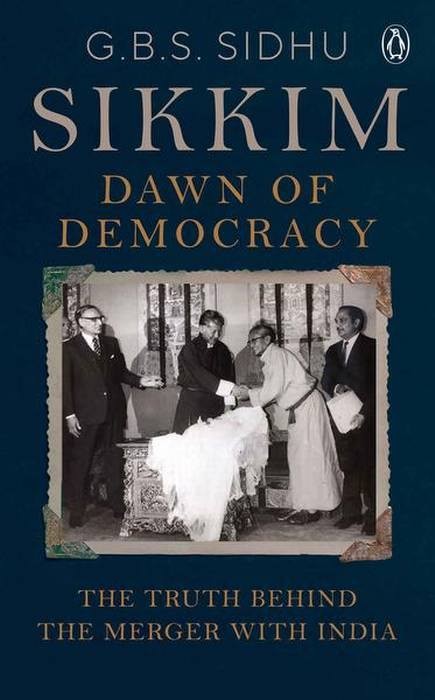
ความล้มเหลวของสถาบันพระมหากษัตริย์สิกขิมเกิดจากอำนาจและมนต์ขลังความเป็นพระมหากษัตริย์ในพระพุทธศาสนาเสื่อมลงตามกาลเวลา การขาดปฏิสัมพันธ์กับประชาชนส่วนใหญ่ของประเทศ การเรียกร้องประชาธิปไตยเกิดขึ้นหลังจากที่อำนาจการปกครองอยู่ในมือขององค์โชเกลเป็นเวลานาน แต่พระมหากษัตริย์พระองค์ก่อนหรือแม้กระทั่ง สมเด็จพระราชาธิบดี Palden Thondup Namgya ที่ทรงมีแนวคิดสมัยใหม่ แต่ก็ไม่ทรงปฏิรูปการเมืองให้เป็นไปในแนวทางประชาธิปไตยเลย แม้จะมีการเลือกตั้ง แต่ฝ่ายการเมืองนั้นก็ขึ้นอยู่กับองค์โชเกล พอมาถึงปี พ.ศ. 2516 (ค.ศ. 1973) ระบอบเดิมจึงสั่นคลอน
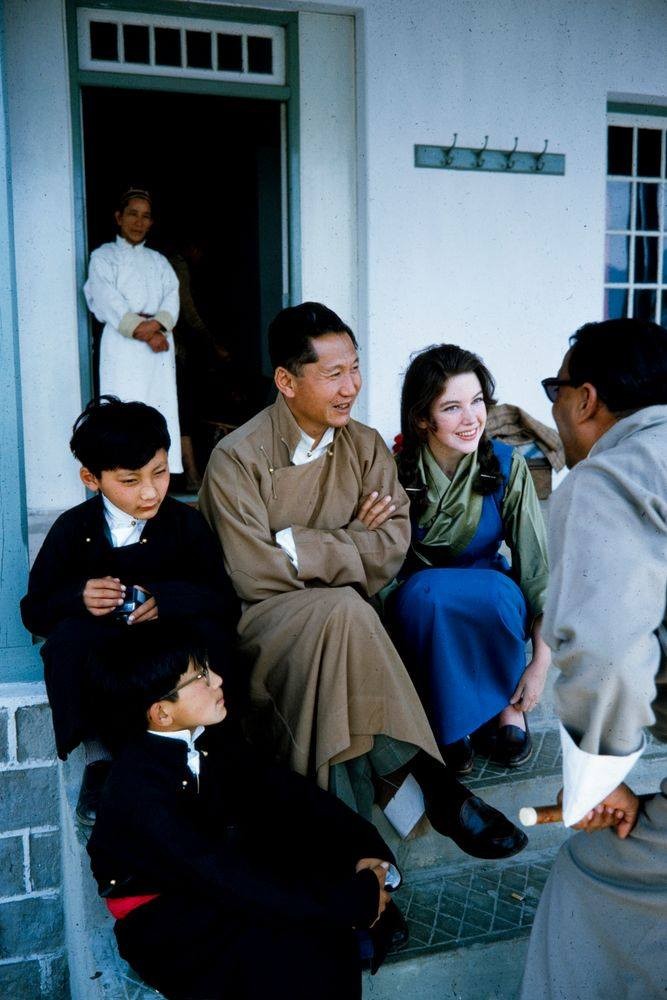
จากความตึงเครียดทางการเมืองส่งผลถึงความตึงเครียดในครอบครัวด้วย สมเด็จพระราชินี Hope ซึ่งทรงมีความรักอันหวานชื่นกับ สมเด็จพระราชาธิบดี Palden Thondup Namgya กลับต้องเกิดความระหองระแหง ด้วยสมเด็จพระราชาธิบดี Palden Thondup Namgya ทรงหลบลี้พระมเหสีไปคบหากับสตรีชาวเบลเยียมที่มีสามีแล้ว
ส่วนสมเด็จพระราชินี Hpoe ก็ทรงแก้แค้นด้วยการไปคบหากับเพื่อนชายชาวอเมริกัน ในปี พ.ศ. 2516 (ค.ศ. 1973) ในช่วงที่สถานการณ์ทางการเมืองวุ่นวายนี้ สมเด็จพระราชินี Hope ทรงละทิ้งพระสวามี และเสด็จไปนครนิวยอร์กพร้อม พระโอรส พระธิดา ทรงปล่อยให้ สมเด็จพระราชาธิบดี Palden Thondup Namgya ต้องทรงรับมือกับสภาวะความวุ่นวายในสิกขิม
Hope ได้เล่าให้สัมภาษณ์ในเวลาหลายปีต่อมาว่า "ฉันทูลพระองค์แล้วว่า ฉันเกลียดหล่อน ฉันทนไม่ได้"
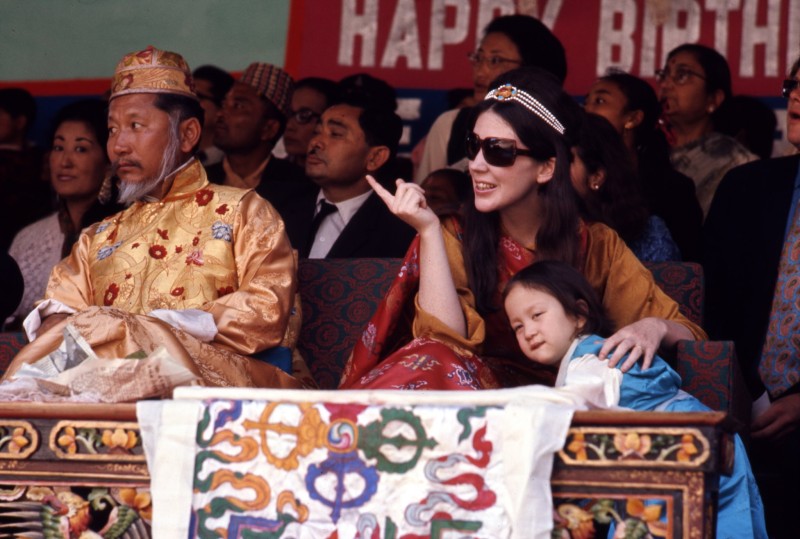
การเลือกตั้งในปี พ.ศ. 2517 (ค.ศ. 1974) ฝ่ายพรรคการเมืองนิยมอินเดียได้รับเสียงข้างมาก และสามารถจัดตั้งรัฐบาลได้ สมเด็จพระราชาธิบดี Palden Thondup Namgya ทรงเดินหมากทางการเมืองผิดพลาด พระองค์ทรงกีดกั้นรังเกียจรัฐบาลนี้ และทรงปฏิเสธรัฐธรรมนูญฉบับใหม่ที่พรรคนี้ร่าง
สมเด็จพระราชาธิบดี Palden Thondup Namgya ทรงต่อต้านแต่ก็ไร้ซึ่งพลัง พระองค์ไม่สามารถเอาชนะในช่วงที่การเมืองถูกครอบงำโดยพรรคคองเกรสแห่งชาติสิกขิม พระองค์จึงทรงต้องยอมรับรัฐธรรมนูญที่กำหนดให้ราชอาราจักรสิกขิมกลายเป็นรัฐหนึ่งของอินเดีย และรัฐบาลจึงเสนอให้มีการจัดให้มีการลงประชามติเพื่อยกเลิกระบอบพระมหากษัตริย์ ซึ่งรัฐบาลเห็นว่ามีปัญหาในวันที่ 8 กันยายน พ.ศ. 2517 (ค.ศ. 1974) แต่ก็ไม่ได้มีการจัดการลงประชามติดังกล่าวขึ้น เพราะสมเด็จพระราชาธิบดี Palden Thondup Namgya ไม่ทรงยอม โดยพระองค์ทรงเรียกร้องให้เป็นการลงประชามติที่อิสระและยุติธรรม ไม่ใช่ภายใต้การครอบงำของพรรคคองเกรสแห่งชาติสิกขิม
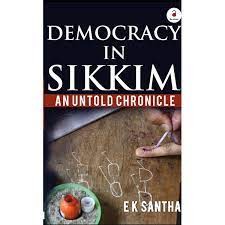
ในวันที่ 9 เมษายน พ.ศ. 2518 (ค.ศ. 1975) กลุ่มฝูงชนที่รัฐบาลพรรคคองเกรสแห่งชาติสิกขิมซึ่งรัฐบาลอินเดียสนับสนุนได้บุกเข้าพระราชวังเพื่อล้มล้างสถาบันพระมหากษัตริย์ ความวุ่นวายทางการเมือง ทำให้นายกรัฐมนตรี Indira Gandhi แห่งอินเดียส่งกองทัพเข้ายึดครองราชอาณาจักรสิกขิม อินเดียจึงจัดประชามติเพื่อยกเลิกระบอบพระมหากษัตริย์ในปีเดียวกันและผลคือให้ยกเลิกระบอบพระมหากษัตริย์และราชอาณาจักรสิกขิม จากนั้นก็ผนวกสิกขิมเข้ากับอินเดียในเวลาเดียวกัน ด้วยคะแนนกว่า 97% เห็นชอบให้เป็นรัฐของอินเดีย (มีรายงานว่า ผู้ที่มีสิทธิลงคะแนนในครั้งนั้นกลับเป็นชาวอินเดียที่เข้ามาอาศัยในสิกขิม แต่ชาวสิกขิมพื้นถิ่นไม่ได้รับสิทธิในการลงคะแนนเลย)
สมเด็จพระราชาธิบดี Palden Thondup Namgya ทรงประณามการลงคะแนนประชามติครั้งนี้ว่า “ผิดกฎหมายและไม่เป็นไปตามกรอบรัฐธรรมนูญ” อดีตสมเด็จพระราชาธิบดี Palden Thondup Namgya ทรงถูกเนรเทศ และสุดท้ายทรงหย่ากับอดีตพระราชินี Hope ในปี พ.ศ. 2523 (ค.ศ. 1980) และในปี พ.ศ. 2525 (ค.ศ. 1982) อดีตสมเด็จพระราชาธิบดี Palden Thondup Namgya ก็สวรรคตในนครนิวยอร์ก ด้วยโรคมะเร็ง สิริพระชนมายุ 58 พรรษา
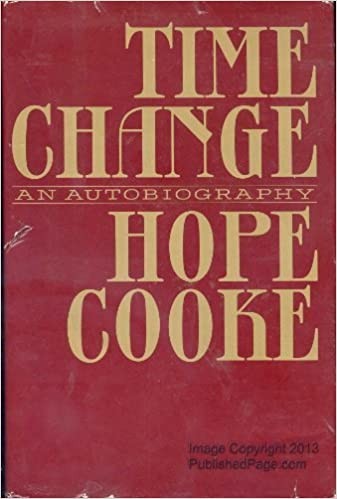
อดีตสมเด็จพระราชินี Hope กลับมาเป็น Hope Cooke เช่นเดิม เธอเลี้ยงดูโอรสธิดาที่เมืองแมนฮัตตัน แต่ก็ไม่ได้รับสัญชาติอเมริกันคืน ด้วยเพราะทำการละสัญชาติไปแล้ว เธอจึงเป็นชาวสิกขิม Hope Cooke ได้รับเงินค่าเลี้ยงดูโอรสธิดาจากอดีตสมเด็จพระราชาธิบดี Palden Thondup Namgya และได้รับมรดกจาก ปู่ ย่า ตา ยาย ของเธอเอง จึงสามารถเช่าอพาร์ตเมนต์ที่ย่าน Yorkville ในนครนิวยอร์ก และเริ่มสร้างตัวด้วยตนเอง ในฐานะที่เคยศึกษาด้านประวัติศาสตร์ เธอเริ่มศึกษาเอกสารเก่าของชาวดัตช์ จากคำเทศนาในโบสถ์เก่า ๆ และบทความหนังสือพิมพ์เก่า ๆ เกี่ยวกับเมืองนิวยอร์ก และได้เป็นอาจารย์สอนเกี่ยวกับประวัติศาสตร์สังคมของนครนิวยอร์ก รวมทั้งได้เขียนคอลัมน์ประจำสัปดาห์ในเรื่อง ‘Undiscovered Manhattan’ ลงในหนังสือพิมพ์ New York Daily News จากนั้นเธอได้เขียนหนังสือที่ได้รับรางวัล คืออัตชีวประวัติของเธอในช่วงที่อยู่สิกขิมในชื่อ Sikkim, Time Change: An Autobiography (1981)
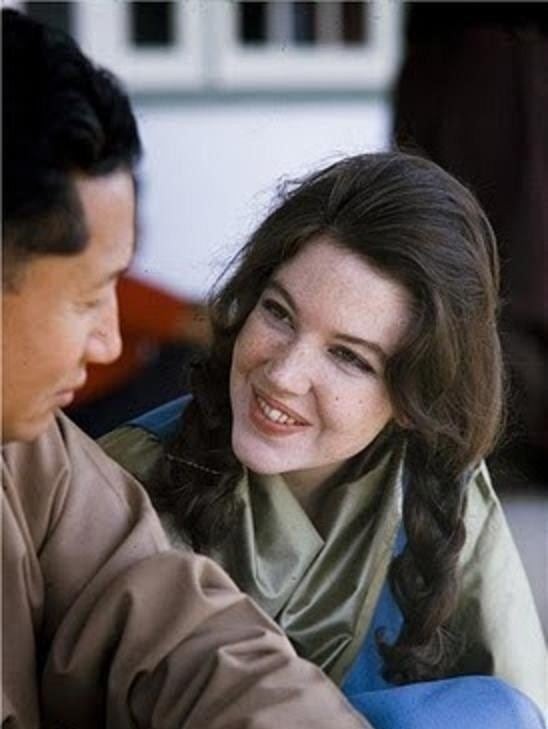
Hope Cooke แต่งงานใหม่ในปี พ.ศ. 2526 (ค.ศ. 1983) กับ Mike Wallace นักประวัติศาสตร์และศาสตราจารย์ด้านประวัติศาสตร์ดีเด่นจากวิทยาลัยกระบวนการยุติธรรมทางอาญา John Jay (John JayCollege of Criminal Justice)
แต่ต่อมาก็หย่ากัน บุตรชายของ Hope คือ เจ้าชาย Palden เป็นนายธนาคารและที่ปรึกษาการเงินในนครนิวยอร์ก ปัจจุบัน Hope Cooke อาศัยอยู่ในเมือง Brooklyn ทำงานเป็นนักเขียน นักประวัติศาสตร์ และอาจารย์สอนในวิทยาลัย และมีงานเขียนมากมายเกี่ยวกับทิเบตวิทยา ปัจจุบันอายุ 80 ปี
เธอเคยถูกสัมภาษณ์จากนักข่าวในช่วงที่เอกราชของสิกขิมสิ้นสุดลงว่า "คุณยังคิดถึงราชอาณาจักรแห่งเทพนิยายนั้นอยู่หรือไม่" เธอตอบว่า "ถ้าฉันมีความเป็นตัวของตัวเองในช่วงชีวิตตอนแต่งงาน ฉันก็คงไม่สูญเสียราชอาณาจักรเอเชียแห่งนี้ไป"
Hope ได้สาบานว่า จะไม่กลับไปเหยียบสิกขิมอีก “ไม่ ไม่” เธอกล่าวด้วยเสียงเบาลง “มันเจ็บปวดเกินไป (ที่จะกลับไปสิกขิมอีก)”
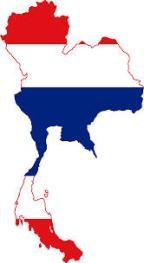
มีผู้คนในสังคมไทยมากมายที่สนใจและห่วงใยในเรื่องราวแบบนี้ ซึ่งเกิดในภูมิภาคต่าง ๆ โดยเฉพาะ ประเทศแถบเทือกเขาหิมาลัย ความล่มสลายของราชอาณาจักรต่าง ๆ นั้น เกิดจากความห่างเหิน ความไม่เข้าใจ การขาดปฏิสัมพันธ์ ความมุ่งมั่น ความอดทน ความเสียสละ ตลอดจนความรักระหว่างสถาบันฯ กับประชาชน ฯลฯ
ซึ่งเป็นเรื่องที่ไม่เคยเกิดและจะไม่มีวันเกิดในบ้านเมืองของเรา อย่าได้สนแรงยุ เรื่องราวที่เสกสรรค์ปั้นแต่งขึ้นเพื่อค่อยป่วน การรับฟังเรื่องราวต่าง ๆ ด้วยสติที่หนักแน่นมั่นคง ไตร่ตรองเหตุและผลในความจริงที่เป็นและเห็นอยู่ ไม่ใช่ด้วยลมปาก หรือคำพูด ความจริงนั้นเป็นสิ่งที่ไม่มีวันตายและปรากฏอยู่ตลอดไป ขอยืนยันว่า ชาติบ้านเมืองจะอยู่รอดด้วยความมั่นคง แข็งแรง ปลอดภัย เจริญก้าวหน้าอย่างสงบสุข ก็ด้วยเราท่านคนไทยทุกคน ดั่งเช่นที่เป็นมาร่วมพันปี และจะเป็นไปเช่นนี้ตลอดไป

สารพัดข่าวและเรื่องราวที่สื่อตะวันตกสาดสีใส่ไข่รัฐบาลจีน กรณีการปฏิบัติต่อชนกลุ่มน้อย ‘ชาวอุยกูร์’ อย่างโหดร้ายและไร้มนุษยธรรม ย้อนแย้งอย่างสิ้นเชิงกับเหตุการณ์จากภาพยนตร์เรื่องนี้
วีรชน...คนธรรมดา! (Ordinary Hero) ซึ่งสร้างจากเรื่องจริงที่เกิดขึ้นเมื่อ 30 เมษายน ค.ศ. 2021 ด้วยมีผู้คนมากมายที่ต้องทำงานแข่งขันกับเวลาเพื่อช่วยชีวิตเด็กชายชาวอุยกูร์วัย 7 ขวบจากเมือง Hotan เขตปกครองตนเอง Xinjian ซึ่งประสบอุบัติเหตุถูกรถไถตัดแขนขวาขาด

ภาพยนตร์เรื่องนี้ดัดแปลงมาจากเรื่องจริงของทีมแพทย์ ลูกเรือ ผู้โดยสาร ตำรวจ และผู้คนอื่น ๆ อีกมากมายจากทุกสาขาอาชีพในเขตปกครองตนเอง Xinjian ซึ่งต่างได้ร่วมมือร่วมใจกันเพื่อที่จะพาเด็กชายชาวอุยกูร์วัย 7 ขวบจากเมือง Hotan เดินทาง 1,400 กิโลเมตรมายังโรงพยาบาลที่ทันสมัยและมีความพร้อมในนคร Urumqi เพื่อที่จะรับการผ่าตัดต่อแขนที่ขาดให้ทันภายในเวลา 8 ชั่วโมงนับจากเวลาที่เกิดอุบัติเหตุ
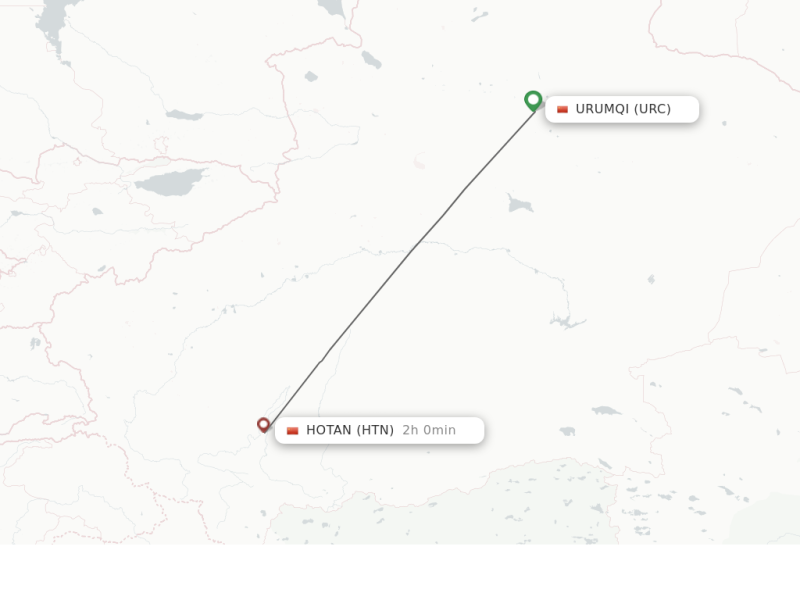 ทั้งนี้ Hotan เป็นจังหวัดที่ตั้งอยู่ทางทางตะวันตกเฉียงใต้ของเขตปกครองตนเอง Xinjian ซึ่งอยู่ทางตะวันตกเฉียงเหนือของจีน
ทั้งนี้ Hotan เป็นจังหวัดที่ตั้งอยู่ทางทางตะวันตกเฉียงใต้ของเขตปกครองตนเอง Xinjian ซึ่งอยู่ทางตะวันตกเฉียงเหนือของจีน
ย้อนกลับไปเมื่อวันที่ 30 เมษายน ค.ศ. 2021 ณ หมู่บ้าน Kumairik เกิดอุบัติเหตุกับ Merdan เด็กชายชาวอุยกูร์วัย 7 ขวบถูกเครื่องมือเก็บเกี่ยวของรถไถตัดแขนขวาตรงไหล่จนขาด หลังจากเกิดเหตุทันทีที่ตั้งสติได้ Abdul ผู้เป็นพี่ชายรีบขับรถพา Merdan น้องชายกับแม่เข้าเมืองเพื่อไปโรงพยาบาลทันที
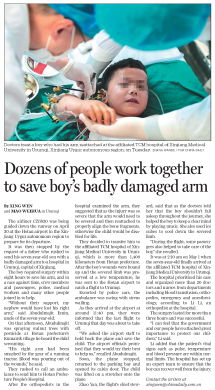
เมื่อมาถึงตัวเมืองรถของ Abdul ก็เจอเข้ากับตลาดนัดซึ่งมีฝูงชนมากมาย เขาบีบแตรเพื่อขอทางจนพ่อค้าผู้หนึ่งซึ่งกำลังเข็นรถเข็นขายของอยู่ไม่พอใจ จึงเดินมาที่รถแต่เมื่อมองเข้าไปในรถก็เห็น Merdan ซึ่งเลือดโชกอยู่บนตักแม่ เขารีบหันกลับไปยังรถเข็นหยิบโทรโข่งขึ้นมาประกาศขอทางให้รถของ Abdul จนสามารถแล่นผ่านไปได้
เมื่อรถของ Abdul สามารถผ่านย่านชุมชนที่แสนจะแออัดและจอแจไปได้แล้ว Abdul ก็รีบขับต่อไปยังโรงพยาบาล โดยพยายามฝ่าไฟแดงจนถูก Ainur ตำรวจจราจรหญิงสกัดไว้ เมื่อเธอเข้ามาถึงรถแล้วเห็นสถานการณ์ที่เกิดขึ้น เธอจึงรีบวิทยุแจ้งศูนย์ควบคุมจราจรทันที ศูนย์ฯ ได้ประสานให้รถพยาบาลออกมารับ Merdan ทันที จากนั้นตำรวจจราจรหญิง Ainur รีบขี่มอเตอร์ไซต์เปิดไฟฉุกเฉินพารถของ Abdul ไปจนพบกับรถพยาบาล ด้วยความช่วยเหลือของศูนย์ฯ และได้ย้าย Merdan ไปยังรถพยาบาลแล้วเดินทางต่อจนถึงโรงพยาบาลประจำจังหวัด Hotan
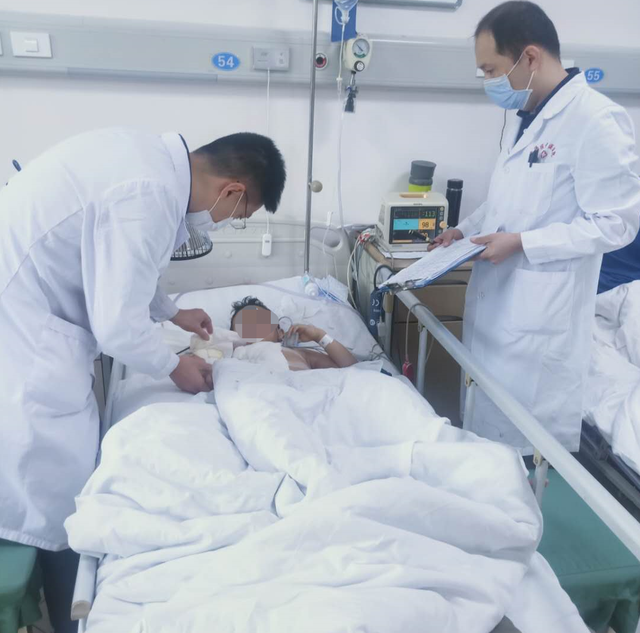
ภาพจากเหตุการณ์จริง
ที่โรงพยาบาลประจำจังหวัด Hotan นายแพทย์ Akbar ศัลยแพทย์กระดูกและข้ออาวุโสได้ทำการตรวจและทำความสะอาดบาดแผล หลังจากตรวจดูแขนแล้ว เขาแนะนำว่าเนื่องจากอาการบาดเจ็บของ Merdan รุนแรงมาก จึงต้องผ่าตัดนำแขนที่ขาดต่อกลับเข้าไปใหม่เพื่อให้เส้นประสาทและชิ้นส่วนกระดูกเรียงตัวกันอย่างเหมาะสม มิฉะนั้น Merdan จะพิการไปตลอดชีวิต
นายแพทย์ Akbar ได้แจ้งพี่ชายกับแม่ของ Merdan ว่า โรงพยาบาลประจำจังหวัด Hotan ไม่มีศักยภาพพอที่จะทำการผ่าตัดเพื่อต่อแขนของ Merdan ได้ วิธีเดียวที่จะรักษาแขนของ Merdan คือ การพาเขาไปรับการผ่าตัดต่อแขนยังโรงพยาบาลของมหาวิทยาลัยแพทย์แห่ง Xinjian ที่นคร Urumqi ซึ่งอยู่ห่างออกไป 1,400 กิโลเมตร ซึ่งมีสิ่งอำนวยความสะดวกต่าง ๆ พร้อมกว่ามาก เนื่องจากอุบัติเหตุเกิดขึ้นประมาณ 19.30 น. ดังนั้นต้องต่อผ่าตัดต่อหลอดเลือดใหม่ให้ทันภายในเวลา 03.30 น.
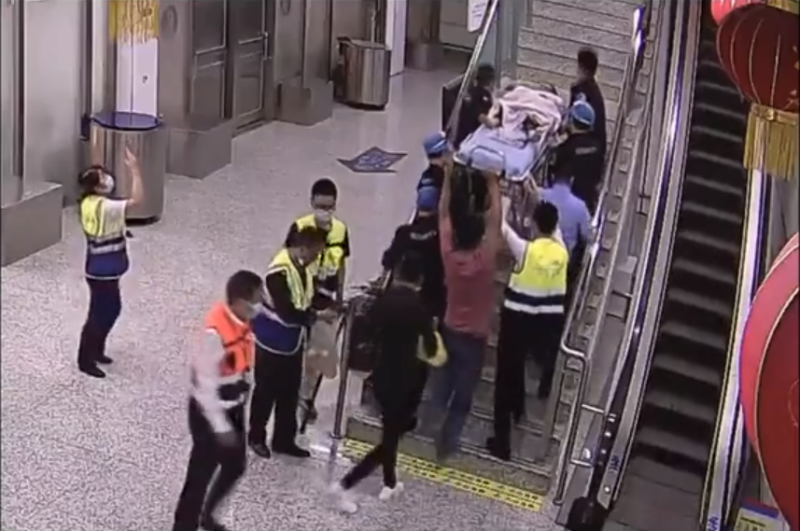
ภาพจากเหตุการณ์จริง
เมื่องได้ยินอย่างนั้น พี่ชายและแม่ของ Merdan ก็พยายามทำทุกวิธีทางเพื่อให้มาถึงสนามบินให้ทันเที่ยวบิน CZ6820 ของสายการบิน China Southern Airlines เที่ยวบินสุดท้ายจากจังหวัด Hotan ไปยังนคร Urumqi ในคืนวันนั้น
เมื่อ Merdan และ Abdul พี่ชายไปถึงสนามบิน เมื่อกัปตัน Xie Huiyang และลูกเรือ ซึ่งมี Zhou Yan หัวหน้าพนักงานต้อนรับของเที่ยวบิน CZ6820 รวมทั้งสำนักงานประจำสนามบิน Hotan ของ China Southern Airlines และหอบังคับการบิน Hotan เมื่อทราบเรื่องของ Merdan ต่างก็ให้ความร่วมมืออย่างเต็มที่ โดยรายงานสถานการณ์นี้ต่อหน่วยงานระดับสูงอย่างรวดเร็ว หลังจากการประสานงานอย่างเร่งด่วนจากฝ่ายต่าง ๆ และความยินยอมของผู้โดยสาร 101 คน China Southern Airlines จึงอนุญาตให้กัปตัน นำเครื่องกลับหลุมจอดและเปิดประตูรับ Merdan ทั้ง ๆ ที่เครื่องบินอยู่บนรันเวย์แล้ว เพื่อให้ทันช่วงเวลาทอง 8 ชั่วโมงในการรักษา
ทางสนามบิน Hotan ได้เปิดทางเดินสีเขียว และใช้เปลขนาดเล็กเพื่อส่ง Merdan ไปยังเครื่องบิน เนื่องจากมีที่นั่งเต็มแต่ก็มีครอบครัวที่มีสมาชิกสามคนยอมสละที่นั่งให้ ในที่สุดเที่ยวบิน CZ6820 ก็ออกเดินทางจากสนามบิน Hotan ในเวลา 00:09 น.
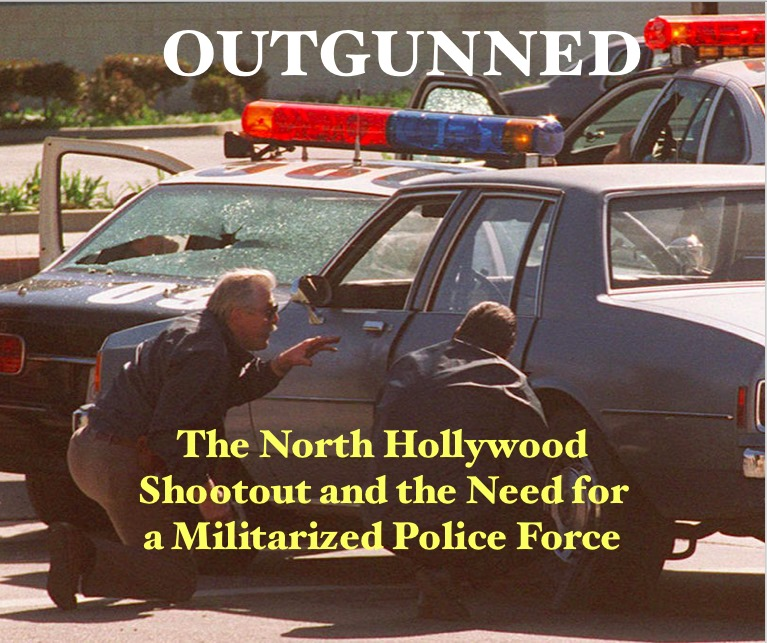
สวัสดีนักอ่านทุกท่านครับ วันนี้ผมหยิบยกเรื่องราวการยิงปะทะกันระหว่างคนร้ายและตำรวจสหรัฐฯ มาเล่าสู่กันฟังครับ หลายๆ ท่านคงคุ้นชินกับเรื่องการพกพาปืนของชาวสหรัฐฯ กันมาพอสมควร เนื่องด้วยมักจะมีข่าวออกมาบ่อยๆ ว่าเกิดเหตุกราดยิงระทึกขวัญตามสถานที่ต่างๆ สุดท้ายมักจบลงด้วยคราบน้ำตาของผู้สูญเสีย ทว่า ปัญหากราดยิงของสหรัฐฯ ก็ยังไม่ได้รับการแก้ไขจนเป็นที่น่าพอใจของคนในประเทศ
เรื่องที่ผมยกมาเล่านี้ ต้องกล่าวย้อนกลับไปเมื่อ 28 กุมภาพันธ์ ค.ศ. 1997 เกิดเหตุการปล้นในนครลอสแองเจลลิส และต่อมาก็กลายเป็นการยิงปะทะกันต่อสู้กันอย่างดุเดือดระหว่างตำรวจกับผู้ร้าย และถือเป็นการยิงปะทะที่ดุเดือดมากที่สุดในประวัติศาสตร์ของกรมตำรวจแห่งนครลอสแองเจลลิส (LAPD)
เหตุการณ์ครั้งนั้น ทั้งสองฝ่ายสาดกระสุนใส่กันเกือบสองพันนัด โดยฝ่ายตำรวจยิงไปราว 650 นัด และคนร้ายยิงอีกราว 1,100 นัด มีผู้เสียชีวิต 2 คน เป็นคนร้ายทั้งคู่ และมีผู้ได้รับบาดเจ็บอีก 20 คน
นับเป็นเหตุการณ์อีกครั้งหนึ่งที่เจ้าหน้าที่ตำรวจมีอำนาจการยิงที่ด้อยกว่าคนร้าย
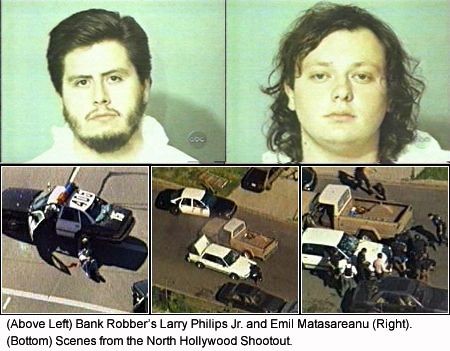
คนร้ายทั้งสองคือ Larry Eugene Phillips Jr. และ Ștefan Emilian ‘Emil’ Mătăsăreanu (เกิดที่ประเทศโรมาเนีย) พบกันครั้งแรกที่โรงยิม Gold เมืองเวนิส มลรัฐแคลิฟอร์เนีย ในปี ค.ศ. 1989 พวกเขามีความสนใจร่วมกันในเรื่องการยกน้ำหนัก การเพาะกาย และอาวุธปืน
แต่ก่อนรู้จักกัน ‘Phillips’ เป็นผู้ที่พฤติกรรมเป็นคนร้ายเกี่ยวข้องกับการต้มตุ๋นด้านอสังหาริมทรัพย์ และการโจรกรรมในร้านค้า ส่วน Emil เป็นวิศวกรไฟฟ้าและทำธุรกิจซ่อมคอมพิวเตอร์ที่ค่อนข้างจะไม่ประสบความสำเร็จ

20 กรกฎาคม ค.ศ. 1993 Phillips และ Emil ได้ปล้นรถหุ้มเกราะซึ่งจอดอยู่นอกธนาคาร First Bank ในเมือง Littleton มลรัฐโคโลราโด
วันที่ 29 ตุลาคม ค.ศ. 1993 ทั้งสองถูกจับที่เมือง Glendale ทางตะวันออกเฉียงเหนือของนครลอสแองเจลิสในข้อหาขับรถเร็วเกินกำหนด จากการค้นรถ หลังจากที่ Phillips ยอมจำนนพร้อมอาวุธปืนที่พกติดตัว ตำรวจพบปืน AK-47 กึ่งอัตโนมัติ 2 กระบอก, ปืนพก 2 กระบอก, กระสุนปืนขนาด 7.62 × 39 มม. มากกว่า 1,600 นัด, กระสุนขนาด 9 × 19 มม. และ .45 ACP อีก 1,200 นัด, วิทยุรับฟังความถี่ตำรวจ, ระเบิดควัน, อุปกรณ์ประกอบระเบิด, เสื้อเกราะ, และป้ายทะเบียนของรัฐแคลิฟอร์เนีย 3 แผ่นที่เลขแตกต่างกัน
ในขั้นต้นทั้งสองถูกข้อหาสมรู้ร่วมคิดที่จะก่อการปล้น ทั้งสองติดคุก 100 วัน และถูกคุมประพฤติ 3 ปี หลังจากได้รับการปล่อยตัวทั้งสองได้รับคืนทรัพย์สินส่วนใหญ่ ยกเว้นอาวุธปืนและวัตถุระเบิด

14 มิถุนายน ค.ศ. 1995 ทั้งคู่ได้ปล้นรถหุ้มเกราะของบริษัท Brinks ในเมือง Winnetka มลรัฐแคลิฟอร์เนีย โดยได้สังหาร Herman Cook พนักงานรักษาความปลอดภัย และพนักงานรักษาความปลอดภัยอีกคนถูกยิงบาดเจ็บสาหัส
ในเดือนพฤษภาคม ค.ศ. 1996 ได้ปล้นธนาคารแห่งอเมริกา 2 สาขาในพื้นที่ San Fernando Valley ในนครลอสแองเจลิสได้เงินไปประมาณ 1.5 ล้านดอลลาร์สหรัฐ
Phillips และ Emil ถูกขนานนามว่าเป็น ‘จอมโจรอุบัติการณ์สูง (High Incident Bandits)’ โดยเจ้าหน้าที่สอบสวน จากอาวุธที่ใช้ในการปล้น 3 ครั้งก่อนที่จะเกิดเหตุการยิงกันที่เขต North Hollywood

วันเกิดเหตุ Phillips และ Emil ขับรถ Chevrolet Celebrity สีขาว ปี ค.ศ.1987 มาถึงธนาคารแห่งอเมริกาสาขาแยกถนน Laurel Canyon และถนน Archwood ในเขต North Hollywood ราว 09.17 น. และได้ตั้งนาฬิกาปลุกไว้แปดนาที เป็นการประมาณเวลาที่ตำรวจจะมาถึงหลังจากที่ได้รับแจ้งเหตุ
ในช่วงเวลานี้ Phillips ใช้วิทยุรับฟังความถี่ตำรวจ เพื่อตรวจสอบการเคลื่อนไหวของตำรวจก่อนการปล้น ขณะที่ทั้งสองกำลังเดินไปยังธนาคารก็ถูกพบโดยเจ้าหน้าที่ตำรวจ LAPD 2 นาย Loren Farrell และ Martin Perello ที่กำลังขับรถสายตรวจเพื่อตรวจตราตามถนน Laurel Canyon เจ้าหน้าที่ Perello แจ้งวิทยุขอความช่วยเหลือ ว่ามีความเป็นไปได้ที่จะเกิดเหตุ 211 ที่ธนาคารแห่งอเมริกา ‘211’ คือรหัสแจ้งว่ามีการปล้น
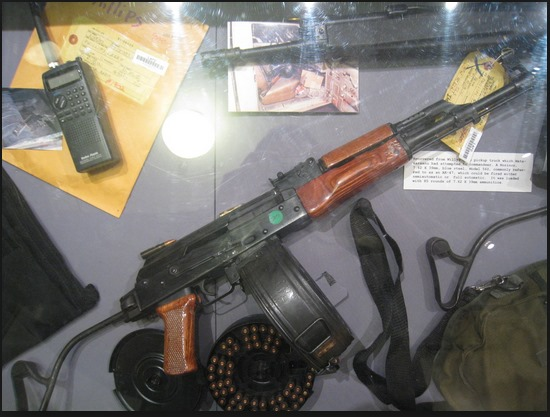
ขณะที่ Phillips และ Emil เข้าไปในธนาคาร พวกเขาอาวุธประกอบด้วย ปืนไรเฟิล Norinco Type 56 S-1 Phillips และ Emil สั่งให้ลูกค้าออกจากโถงที่มี ATM ใกล้กับทางเข้าธนาคารและนอนลงกับพื้น เจ้าหน้าที่รักษาความปลอดภัยของธนาคารเห็นเหตุการณ์ดังกล่าว และเห็นโจร 2 คนพร้อมอาวุธหนัก จึงวิทยุเพื่อนร่วมงานซึ่งอยู่ที่ลานจอดรถให้เรียกตำรวจ แต่ไม่มีการตอบรับ
Phillips ตะโกนว่า "ชูมือขึ้น! ก่อนที่จะเปิดฉากยิงเพดานเพื่อข่มขู่พนักงานธนาคารและลูกค้าประมาณ 30 คน เพื่อไม่ให้ขัดขืน Phillips ยิงเพื่อเปิดประตูกันกระสุน (ซึ่งถูกออกแบบมาเพื่อป้องกันกระสุนความเร็วต่ำเท่านั้น) และสามารถเข้าถึงเคาเตอร์และตู้นิรภัย ได้บังคับให้ John Villigrana ผู้ช่วยผู้จัดการ เปิดตู้นิรภัย Villigrana จึงจำเป็นต้องเปิดและเริ่มนำเงินใส่ถุงเงิน เนื่องจากมีการเปลี่ยนแปลงกำหนดเวลารับมอบของธนาคารห้องนิรภัยจึงมีเงินน้อยกว่า 750,000 ดอลลาร์ตามที่ Phillips และ Emil คาดเอาไว้ ทำให้ Phillips โกรธจนเกิดการโต้เถียงกับ Villigrana และเรียกให้ Villigrana หาเงินให้มากขึ้น และแสดงความหงุดหงิดที่ชัดเจนด้วยการยิงปืนเข้าไปในตู้เซฟของธนาคารถึง 75 นัด ทำลายเงินที่เหลืออยู่
Phillips พยายามที่จะเปิดตู้ ATM ของธนาคาร แต่มีการเปลี่ยนแปลงนโยบายผู้จัดการสาขาไม่สามารถเข้าถึงเงิน ATM ได้อีก
ก่อนจะหนี Phillips และ Emil ได้ขังตัวประกันในห้องนิรภัยของธนาคาร ท้ายที่สุดทั้งสองก็เหลือเงินสด 303,305 ดอลลาร์ ซึ่งมีสีระเบิดสามซองซึ่งต่อมาก็เกิดระเบิดทำให้เกิดตำหนิบนเงินที่พึ่งปล้นมาทั้งหมด

ด้านนอกเมื่อเจ้าหน้าที่ชุดแรกได้ยินเสียงปืนจากธนาคาร และวิทยุเรียกกำลังเสริม ก่อนที่จะหลบเข้าหลังรถสายตรวจเล็งปืนไปยังประตูธนาคาร ในขณะที่โจรยังคงอยู่ข้างใน ตำรวจสายตรวจและสายสืบมาถึง และเข้าประจำตำแหน่งกำบังที่เหมาะสมทั้งสี่มุมรอบ ๆ ธนาคารอย่างมีประสิทธิภาพ
เวลาประมาณ 9:24 น. Phillips เดินออกทางประตูทางเหนือ และพบกับตำรวจห่างราว 200 ฟุต (60 ม.) จึงเปิดฉากยิงเป็นเวลาหลายนาที ทำให้ตำรวจบาดเจ็บ 7 นาย และพลเรือนอีก 3 คน
นอกจากนี้ Phillips ยังยิงเข้าใส่เฮลิคอปเตอร์ตำรวจซึ่งบินตรวจการณ์ด้านบน จนต้องบินห่างออกมาในระยะปลอดภัย Phillips ถอยกลับเข้ามาข้างในสักพัก ก่อนโผล่ออกทางประตูด้านเหนือ ขณะที่ Emil เดินออกจากประตูทางทิศใต้

Phillips และ Emil เริ่มยิงปะทะกับเจ้าหน้าที่ โดยยิงไปยังรถสายตรวจที่จอดอยู่ตามถนน Laurel Canyon หน้าธนาคาร เจ้าหน้าที่ตำรวจมีอาวุธปืนมาตรฐาน ได้แก่ ปืนพกแบบ Beretta 92F/FS ขนาด 9 มม. ปืนพกลูกโม่ S&W Model 15 ขนาด .38 และปืนลูกซอง Ithaca แบบโยนลำ (Pump action) Model 37 ขนาด 12 ทันทีที่เจ้าหน้าที่ยิงตอบโต้กระสุนของเจ้าหน้าที่ไม่สามารถเจาะผ่านชุดเกราะที่ Phillips และ Emil สวมใส่ได้ ด้วยปืนพกของเจ้าหน้าที่ LAPD ส่วนใหญ่ไม่มีอานุภาพเพียงพอ และในระยะไกลมีความแม่นยำต่ำ มีเสียงตำรวจ LAPD เตือนเจ้าหน้าที่คนอื่นว่า "อย่าหยุดยานพาหนะหลบหนี เพราะพวกเขามีอาวุธปืนอัตโนมัติ ไม่มีอะไรที่จะสามารถหยุดยั้งพวกเขาได้"
นอกจากนี้เจ้าหน้าที่ยังถูกตรึงไว้ด้วยห่ากระสุนจาก Phillips และ Emil ทำให้ยากต่อการพยายามยิงตรงศีรษะ (ซึ่งไม่มีเกราะป้องกัน) เจ้าหน้าที่ตำรวจหลายนายจึงได้ไปขอยืมปืน AR-15 จำนวน 5 กระบอกจากร้านขายปืนใกล้เคียงเพื่อนำมาใช้ยิงต่อสู้กับ Phillips และ Emil
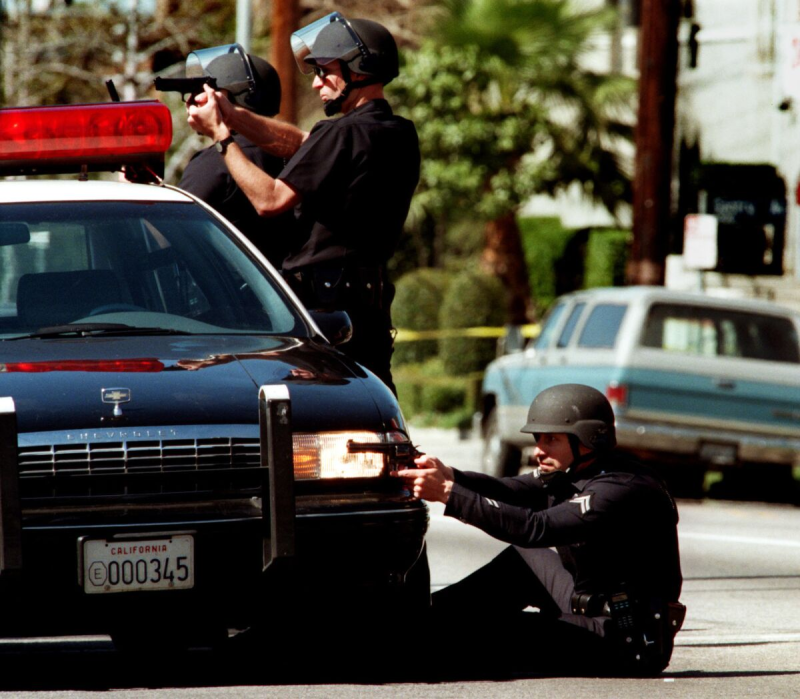
มีสองตำแหน่งที่อยู่ติดกับลานจอดรถด้านทิศเหนือที่เหมาะจะกำบังเจ้าหน้าที่ และสามารถยิง Phillips ด้วยปืนพก ขณะที่ Phillips กำลังยิง และหลบใกล้กับรถ 4 คันที่จอดอยู่ติดกับกำแพงด้านเหนือของธนาคาร และสถานที่แห่งหนึ่งที่ เจ้าหน้าที่ Zielenski กองตำรวจจราจร Valley ใช้เป็นที่กำบังคือ ร้านอาหาร Del Taco สาขา West wall ห่างจาก Phillips ราว 351 ฟุต เจ้าหน้าที่ Zielenski ยิง Phillips ไป 86 นัด และอาจยิงถูกอย่างน้อยหนึ่งนัด ตำแหน่งอื่นที่เป็นประโยชน์เจ้าหน้าที่ LAPD คือสนามหลังบ้านเลขที่ 6641 ถนน Agnes ผนังบล็อกช่วยกำบังเจ้าหน้าที่ที่ทำการยิงต่อสู้ และอาจยิงถูก Phillips ด้วยกระสุน 9 มม. จากปืนพกของนักสืบ Bancroft ซึ่งยิงไป 17 นัด และนักสืบ Harley ยิงไปอีกราว 15 ถึง 24 นัด ถูก Phillips ในระยะประมาณ 55 ฟุต
หลังจากที่ Emil เคลื่อนรถ Chevrolet Celebrity ออกจากพื้นที่จอดรถคนพิการในลานจอดรถทางตอนเหนือ Phillips อาจถูกยิงที่มือซ้าย (อ้างอิงจากภาพข่าวเฮลิคอปเตอร์ที่แสดงให้เห็นว่า เขามีอาการบาดเจ็บ) ในเวลาเดียวกันกระสุนปืนจากเจ้าหน้าที่ LAPD ยิงถูกปืน H&K 91 ที่ Phillips ใช้ยิงจนขัดข้องและใช้งานไม่ได้ เจ้าหน้าที่ LAPD ยิง Phillips บาดเจ็บจากสองจุดกำบังและป้องกันไม่ให้ Phillips สามารถหลบหนีได้ง่าย ๆ

เรื่องนี้ คนที่สนใจอยากจะอพยพไปอยู่ในบ้านอื่นเมืองอื่นคงสนใจ แม้ว่าในปัจจุบันนี้จะมีมากมายหลายประเทศที่ยอมให้สัญชาติแก่ผู้คนที่อพยพมาจากประเทศต่าง ๆ ทั่วโลก แต่ก็มีรัฐบาลของหลายประเทศเช่นกันที่ชาวต่างชาติจะขอสัญชาติได้ยากยิ่ง หรือแทบจะเป็นไปไม่ได้เลย เพื่อให้สามารถใช้ชีวิตอยู่อย่างถาวรในประเทศนั้น ๆ ได้ ในบทความนี้มี 15 ประเทศที่ขอสัญชาติเพื่อเป็นพลเมืองได้ยากที่สุด

1. กาตาร์ (Qatar) เป็นหนึ่งในประเทศที่ยากที่สุดในการขอสัญชาติ กระบวนการนี้ยาวนานและมีความซับซ้อน และมีช่องทางน้อยมากที่จะสมัครเป็นพลเมืองได้ พลเมืองส่วนใหญ่เกิดในครอบครัวชาวกาตาร์หรือได้รับสัญชาติผ่านการแต่งงานกับชาวกาตาร์ มิฉะนั้นโดยทั่วไปแล้ว สัญชาติจะให้เฉพาะผู้ที่รัฐบาลจ้างมาติดต่อกันเป็นเวลาหลายปี หรือเป็นผู้ที่มีการลงทุนเป็นจำนวนมากในประเทศเท่านั้น

2. นครรัฐวาติกัน (Vatican City) นครรัฐวาติกันเป็นประเทศที่เล็กที่สุดในโลก มีประชากรเพียง 800 กว่าคน และยังเป็นหนึ่งในประเทศที่ยากที่สุดในการขอสัญชาติอีกด้วย มีเพียงสองวิธีในการเป็นพลเมืองของนครวาติกันคือ (1) เกิดที่นั่น หรือ (2) ได้รับการแต่งตั้งจากสมเด็จพระสันตะปาปา หากคุณไม่ได้เกิดในนครรัฐวาติกัน
ความหวังเดียวในการเป็นพลเมืองคือการได้รับการแต่งตั้งจากสมเด็จพระสันตะปาปา และนั่นค่อนข้างจะเป็นเรื่องใหญ่เพราะสมเด็จพระสันตะปาปาจะทรงแต่งตั้งบุคคลเป็นพลเมืองสำหรับผู้ที่มีบทบาทเฉพาะภายในวาติกันเท่านั้น เช่น เป็นพระคาร์ดินัลที่อาศัยอยู่ในนครรัฐวาติกันหรือกรุงโรม หรือหากอาศัยอยู่ในนครวาติกันเพราะเป็นพนักงานอย่างเป็นทางการของคริสตจักรคาทอลิก นักการทูต หรือสมาชิกของ Swiss Guard ดังนั้นจึงยากมาก ๆ ที่จะได้เป็นพลเมืองของนครรัฐวาติกัน

3. ลิกเตนสไตน์ (Liechtenstein) เป็นหนึ่งในประเทศที่เล็กที่สุดและร่ำรวยที่สุดในยุโรป โดยอาณาเขตซึ่งตั้งอยู่ระหว่างออสเตรียและสวิตเซอร์แลนด์ มีประชากรเพียง 37,000 คน ข้อกำหนดการเป็นพลเมืองของประเทศนี้เป็นข้อกำหนดที่เข้มงวดที่สุดในโลก ผู้สมัครจะต้องอาศัยอยู่ในลิกเตนสไตน์เป็นเวลาอย่างน้อย 30 ปี หรือหากแต่งงานกับพลเมืองลิกเตนสไตน์ และอาศัยอยู่ในประเทศลิกเตนสไตน์อยู่แล้ว ระยะเวลาก็จะสั้นลงเหลือ 5 ปีของการแต่งงาน และต้องสามารถพิสูจน์ได้ว่า มีความมั่นคงทางการเงิน และได้รวมเข้ากิจกรรมต่าง ๆ กับชุมชน แล้วยังต้องผ่านการทดสอบภาษาด้วย ด้วยข้อกำหนดเหล่านี้ จึงไม่แปลกใจเลยที่การได้รับสัญชาติลิกเตนสไตน์เป็นเรื่องยากมาก ๆ ในความเป็นจริงแล้ว แต่ละปีมีเพียงประมาณ 20 คนเท่านั้นที่ได้รับสัญชาติด้วยการอนุมัติจากรัฐสภาของลิกเตนสไตน์

4. ภูฏาน (Bhutan) เป็นหนึ่งในประเทศที่ยากที่สุดในการขอสัญชาติ ประเทศเล็ก ๆ ที่ไม่มีทางออกสู่ทะเลบนเทือกเขาหิมาลัย มีประชากรเพียง 700,000 คน และมีอัตราการแปลงสัญชาติที่ต่ำมาก นับตั้งแต่ปี ค.ศ. 1949 เป็นต้นมา มีชาวต่างชาติเพียงประมาณ 1,000 คนที่ได้รับสัญชาติภูฏาน ขั้นตอนการเป็นพลเมืองภูฏานนั้นใช้เวลานานและซับซ้อน ผู้ยื่นขอสัญชาติจะต้องอาศัยอยู่ในประเทศอย่างน้อยเป็นเวลา 20 ปี ไม่มีประวัติอาชญากรรม และต้องปฏิบัติตามข้อกำหนดต่าง ๆ ซึ่งรวมถึงไม่มีประวัติการพูดหรือการกระทำการอันเป็นการต่อต้านพระมหากษัตริย์หรือประเทศมาก่อน มีความเชี่ยวชาญในภาษาซองคา และยังต้องผ่านการสอบอันเข้มงวดเพื่อทดสอบความรู้เกี่ยวกับประวัติศาสตร์ วัฒนธรรม และศาสนาของภูฏาน ถึงกระนั้น ก็ไม่รับประกันการเป็นพลเมือง ด้วยขึ้นอยู่กับดุลยพินิจของรัฐบาลว่า จะให้สัญชาติแก่ผู้สมัครหรือไม่ เหตุที่การเป็นพลเมืองภูฏานเป็นเรื่องยากมาก ๆ ส่วนหนึ่งเป็นเพราะภูฏานต้องการรักษาวัฒนธรรมอันเป็นเอกลักษณ์ของชาติท่ามกลางกระแสโลกาภิวัตน์ รัฐบาลยังกังวลเกี่ยวกับความเสี่ยงด้านความปลอดภัยที่เกิดจากผู้อพยพ โดยเฉพาะผู้ที่มาจากประเทศเพื่อนบ้าน เช่น อินเดีย และจีน ไม่ว่าจะด้วยเหตุผลใดก็ตาม เห็นได้ชัดว่า การขอสัญชาติภูฏานไม่ใช่เรื่องที่ง่ายเลย

5. ซาอุดีอาระเบีย (Saudi Arabia) ถือเป็นประเทศที่ขอ Permanent Residence (PR) หรือใบอนุญาตอยู่ถาวรยากที่สุดในโลก มีเหตุผลหลายประการ รวมถึงความจริงที่ว่า ซาอุดีอาระเบียไม่อนุญาตให้ถือสองสัญชาติ และกำหนดให้พลเมืองทุกคนต้องเป็นมุสลิม นอกจากนี้ ซาอุดีอาระเบียมีข้อกำหนดที่เข้มงวดสำหรับผู้ที่ต้องการเป็นพลเมือง ซึ่งรวมถึงอายุขั้นต่ำ 21 ปีและข้อกำหนดในการพำนักในประเทศเป็นเวลาห้าปี

6. คูเวต (Kuwait) เป็นหนึ่งในประเทศที่ยากที่สุดในการขอสัญชาติ สาเหตุหลักเป็นเพราะคูเวตมีมาตรฐานการครองชีพที่สูงมาก ซึ่งพวกเขาต้องการให้เป็นเช่นนั้น
รัฐบาลมีการคัดเลือกอย่างมากกว่าจะอนุญาตให้ใครเข้ามาในประเทศ และพวกเขามีข้อกำหนดที่เข้มงวดซึ่งต้องปฏิบัติตามจึงจะได้รับสัญชาติ ในการได้รับการพิจารณาให้เป็นพลเมืองคูเวต ต้องได้รับใบอนุญาตมีถิ่นที่อยู่ก่อน นี่อาจเป็นกระบวนการที่ยากในตัวเอง เนื่องจากมีจำนวนใบอนุญาตที่จำกัดในแต่ละปี เมื่อได้รับใบอนุญาตมีถิ่นที่อยู่แล้ว ต้องอาศัยอยู่ในคูเวตเป็นเวลา 20 ปีหรือ 15 ปีสำหรับพลเมืองของประเทศอาหรับอื่น ๆ สามารถยื่นขอสัญชาติได้ แต่ต้องเป็นมุสลิมโดยกำเนิดหรือเปลี่ยนใจเลื่อมใส หากเปลี่ยนศาสนา ต้องผ่านการฝึกฝนด้านศาสนามาแล้วห้าปี และต้องพูดภาษาอาหรับได้อย่างคล่องแคล่ว และแม้ว่าจะมีคุณสมบัติตรงตามข้อกำหนดเหล่านี้ทั้งหมด แต่ก็ไม่มีการรับประกันว่าจะได้รับสัญชาติ การตัดสินใจขั้นสุดท้ายขึ้นอยู่กับรัฐบาลคูเวต และพวกเขาสามารถปฏิเสธใบสมัครขอสัญชาติไม่ว่าด้วยเหตุผลใดก็ตาม

7. สวิตเซอร์แลนด์ (Switzerland) ประเทศซึ่งเป็นที่รู้จักจากภูมิประเทศที่เป็นภูเขาและหมู่บ้านที่งดงาม รวมถึงนโยบายตรวจคนเข้าเมืองที่เข้มงวด การเป็นพลเมืองในสวิตเซอร์แลนด์เป็นเรื่องยากกว่าจะได้มา และกระบวนการอาจใช้เวลายาวนานและค่าใช้จ่ายค่อนข้างสูง มีข้อกำหนดหลายประการที่ต้องปฏิบัติตามจึงจะมีสิทธิ์ได้รับสัญชาติสวิส ประการแรก ผู้สมัครขอสัญชาติจะต้องอาศัยอยู่ในสวิตเซอร์แลนด์เป็นเวลาอย่างน้อย 12 ปี โดยมีใบอนุญาตทำงานที่เรียกว่าใบอนุญาต C ซึ่งอนุญาตให้อยู่อาศัยและทำงานในประเทศได้ ประการที่สอง เขาต้องแสดงให้เห็นถึงการรวมเข้ากับสังคมสวิสผ่านความรู้ในภาษาประจำชาติและการมีส่วนร่วมในชุมชน ในที่สุดจะต้องผ่านการสอบพลเมืองซึ่งทดสอบความรู้ด้านประวัติศาสตร์และวัฒนธรรมของสวิส แม้ว่าจะเป็นไปตามข้อกำหนดเหล่านี้ทั้งหมด ก็ไม่มีการรับประกันว่าจะได้รับสัญชาติ เพราะที่สุดแล้วการตัดสินใจจะขึ้นอยู่กับหน่วยงานของรัฐที่ตรวจสอบแต่ละคำขอเป็นกรณีไป
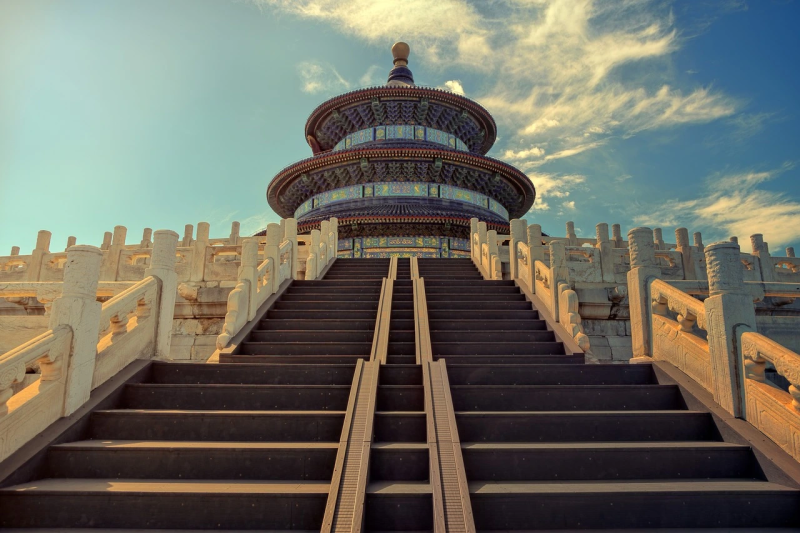
8. จีน (China) หากกำลังคิดว่าประเทศใดยากที่สุดในการขอสัญชาติ คำตอบคือประเทศจีน ในการเป็นพลเมืองจีน ผู้สมัครขอสัญชาติต้องมีเชื้อสายจีน ซึ่งหมายความว่า ต้องมีญาติพี่น้องที่มีสัญชาติจีนอย่างน้อยหนึ่งคน หากไม่มีเชื้อสายจีนแล้วจะไม่มีสิทธิ์ได้รับสัญชาติเลย แม้จะมีข้อยกเว้นบางประการสำหรับกฎนี้ แต่ก็เป็นเรื่องที่ยากมาก ๆ สัญชาติจีนสามารถได้รับจากการแต่งงานกับพลเมืองจีน อย่างไรก็ตามการสมรสจะต้องจดทะเบียนกับหน่วยงานของรัฐบาลจีนเพื่อให้ได้รับการยอมรับ นอกจากนี้ ทั้งคู่ต้องอาศัยอยู่ในประเทศจีนเป็นเวลาอย่างน้อยสองปีก่อนที่จะสามารถยื่นขอสัญชาติได้ หากมีคุณสมบัติตรงตามข้อกำหนด สามารถเริ่มขั้นตอนการสมัครได้โดยส่งเอกสารที่จำเป็นไปยังสถานทูตหรือสถานกงสุลจีนที่ใกล้ที่สุด ขั้นตอนการสมัครอาจใช้เวลาหลายเดือนจึงจะเสร็จสมบูรณ์ (แนะนำให้ใช้บริการทนายความเพื่อช่วยในเรื่องเอกสาร)
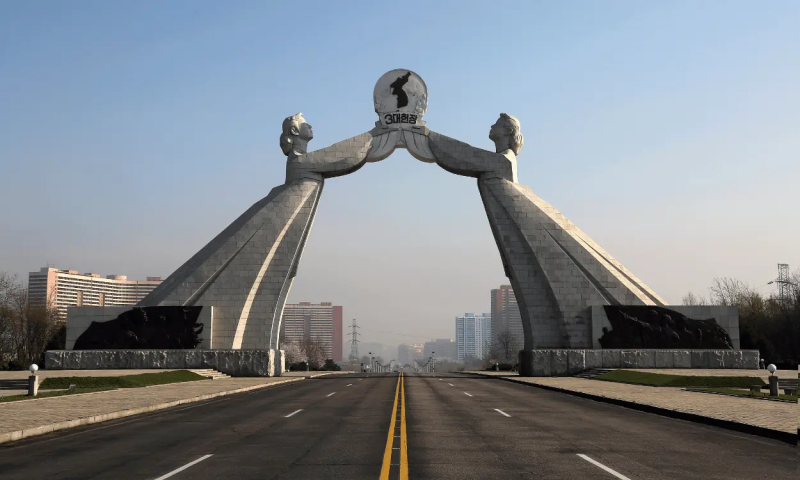
9. เกาหลีเหนือ (North Korea) เป็นอีกประเทศที่ยากที่สุดในการขอ Permanent Residence (PR) หรือใบอนุญาตอยู่ถาวร เหตุผลหลายประการรวมถึงข้อเท็จจริงที่ว่าเกาหลีเหนือไม่อนุญาตให้ถือสองสัญชาติ และกำหนดให้พลเมืองทุกคนต้องสละสัญชาติเดิมของตน นอกจากนี้ เกาหลีเหนือยังมีข้อกำหนดที่เข้มงวดสำหรับผู้สมัคร ซึ่งรวมถึงอายุขั้นต่ำ 21 ปี ประวัติอาชญากรรมที่สะอาด และการศึกษาในระดับหนึ่ง นอกจากนี้ ผู้ขอสัญชาติเกาหลีเหนือยังต้องผ่านขั้นตอนการสมัครที่ใช้เวลานานและยุ่งยาก ซึ่งรวมถึงการสัมภาษณ์และการสอบที่ไม่ง่ายเลยอีกด้วย

10. ญี่ปุ่น (Japan) ประเทศหมู่เกาะซึ่งเป็นหนึ่งในประเทศที่ขอสัญชาติได้ยากที่สุดประเทศหนึ่ง กระบวนการนี้ใช้เวลานานและลำบาก และต้องใช้ทั้งเวลาและเงินจำนวนมาก ในการเริ่มต้น ผู้สมัครที่คาดหวังจะต้องอาศัยอยู่ในญี่ปุ่นเป็นเวลาอย่างน้อยห้าปี ในช่วงเวลาดังกล่าว ต้องมีวีซ่าทำงานที่ถูกต้องและไม่มีประวัติอาชญากรรม และยังต้องผ่านการทดสอบภาษาญี่ปุ่นที่เข้มงวดด้วย เมื่อคุณสมบัติครบตามข้อกำหนดเหล่านี้แล้ว จะต้องส่งใบสมัครโดยละเอียดไปยังกระทรวงยุติธรรม ใบสมัครประกอบด้วยลายนิ้วมือ รูปถ่าย และข้อมูลส่วนตัวอื่น ๆ โดยอาจใช้เวลาหลายเดือนหรือหลายปีกว่าจะได้รับการตอบกลับจากกระทรวงว่า ใบสมัครได้รับการอนุมัติหรือปฏิเสธ และแม้ว่าผู้สมัครจะโชคดีพอที่จะได้รับสัญชาติญี่ปุ่น แต่ก็มีข้อจำกัดบางประการที่มาพร้อมกับการขอสัญชาติ ตัวอย่างเช่น ชาวญี่ปุ่นไม่ได้รับอนุญาตให้ถือสองสัญชาติ โดยต้องสละสัญชาติเดิม และสาบานว่าจะจงรักภักดีต่อจักรพรรดิแห่งญี่ปุ่น
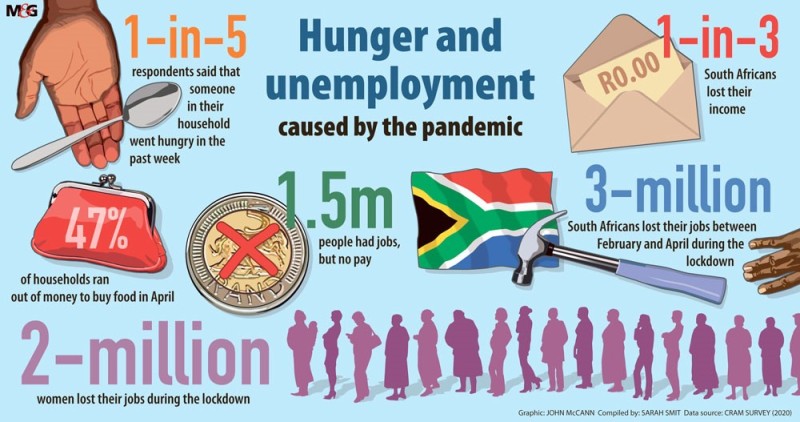
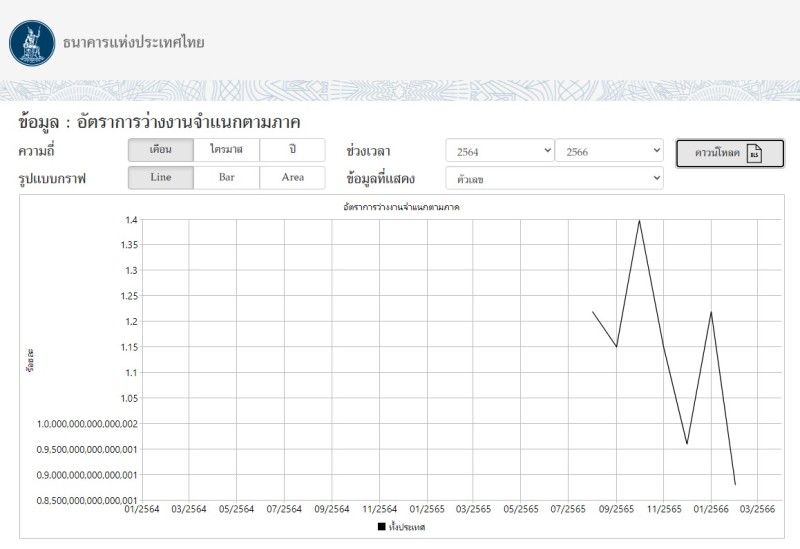
ปัญหาการว่างงานเป็นปัญหาที่เกิดขึ้นทั่วโลก แต่สำหรับบ้านเราแล้วอัตราว่างงานเมื่อเดือนมีนาคม พ.ศ. 2566 ต่ำกว่าร้อยละ 1 กว่าสิบปีแล้วที่หน่วยงานด้านแรงงานของไทยสามารถทำงานอย่างได้ผล อัตราว่างงานแกว่งตัวระหว่างต่ำกว่าหนึ่งและหนึ่งกว่า ๆ มาอย่างต่อเนื่อง และปัญหาการว่างงานที่หนักหนาสาหัสบนโลกนี้ ขณะนี้เกิดขึ้นในทวีปแอฟริกา
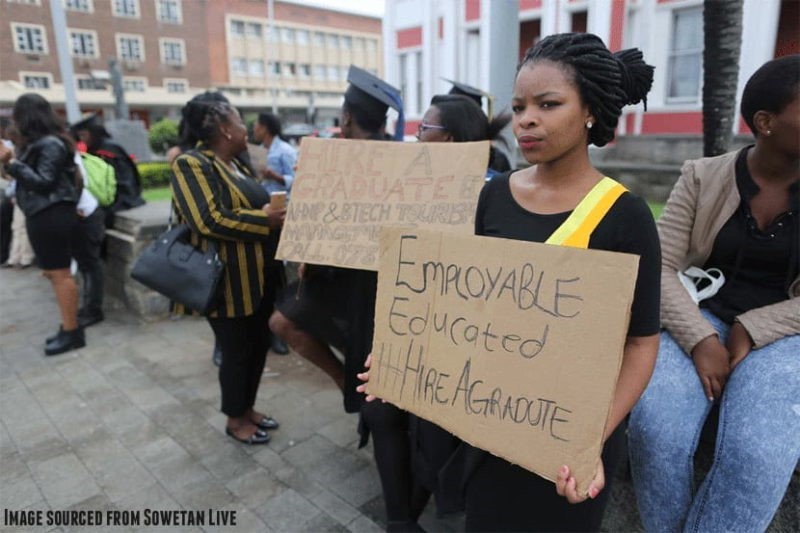
บัณฑิตจบใหม่ในแอฟริกาใส่ครุยประท้วงเพื่อเรียกร้องให้ได้งานทำ
คนหนุ่มสาวราวครึ่งหนึ่งในแอฟริกาใต้ว่างงาน ขณะที่ในยูกันดา บัณฑิตกว่า 1.2 ล้านคนไม่มีงานทำ ซึ่งผู้เชี่ยวชาญด้านแรงงานกล่าวว่า การริเริ่มในการทำธุรกิจเป็นของตัวเองมากขึ้นช่วยบรรเทาปัญหาการว่างงานในทวีปแอฟริกาได้
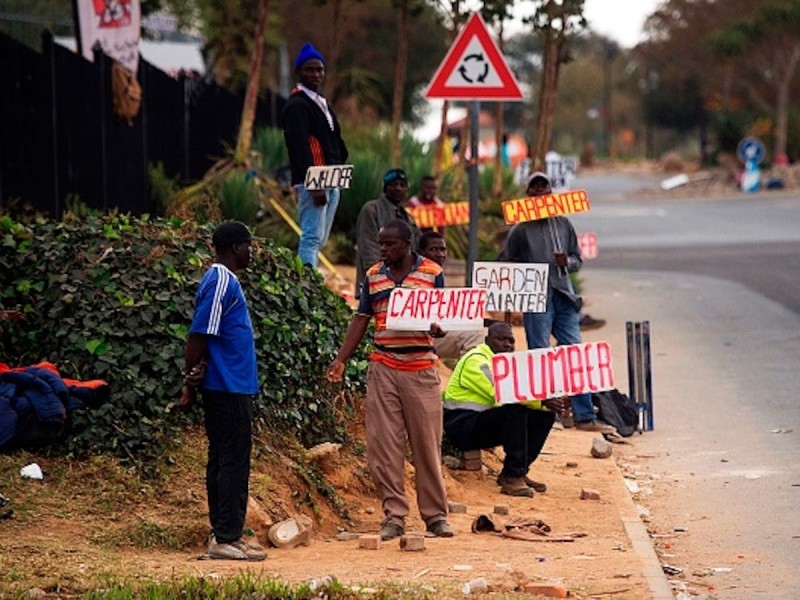
ผู้คนต้องถือป้ายบอกความถนัดของแต่ละคนให้ผู้สัญจรไปมาได้เห็น
‘Steven Moyo’ ตื่นนอนทุกวันเวลาตี 5 เพื่อหางานทำตามท้องถนนในนครโจฮันเนสเบิร์ก เมืองสำคัญทางเศรษฐกิจของแอฟริกาใต้ Moyo เป็นช่างไฟฟ้า ในวันที่อากาศดี เขามีรายได้สูงสุด 30 ยูโร (ประมาณ 31.50 ดอลลาร์สหรัฐฯ) แต่นับวันจะมีน้อยลง
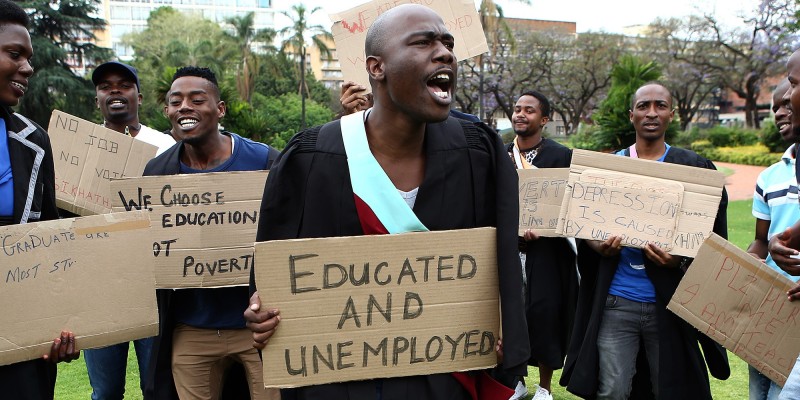
บัณฑิตจบใหม่ในแอฟริกาประท้วงเพื่อเรียกร้องให้ได้งานทำ
กลายเป็นเรื่องปกติที่ผู้คนพบเห็นจนคุ้นชินแล้ว
แอฟริกาใต้อยู่ในภาวะเศรษฐกิจถดถอยที่รุนแรง หลังจากการระบาดของโควิด-19 “สถานการณ์แย่ลง ไม่มีใครจ้างเรา” Moyo บอก และไม่รู้จะหาเงินค่าอาหารและค่าเช่าห้องได้จากไหน เรื่องราวอย่างที่เกิดขึ้นกับ Moyo ไม่ใช่เรื่องแปลกเลยในประเทศแอฟริกาใต้ ในแอฟริกาใต้มีผู้สำเร็จการศึกษามากกว่าตำแหน่งงาน
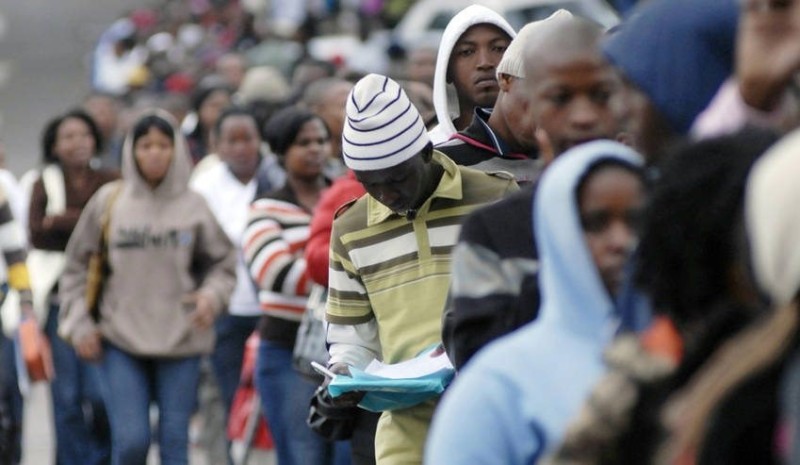
ในเมืองเคปทาวน์ ‘Namhla Mcimbi’ บอกว่า เธอต้องละทิ้งการศึกษาด้านจิตวิทยา เพราะเธอไม่สามารถจ่ายค่าเล่าเรียนได้ เช่นเดียวกับเพื่อนนักเรียนหลายคนของเธอ ตอนนี้ Mcimbi ตกอยู่ในภาวะว่างงาน “ผู้คนให้ญาติพี่น้องของพวกเขาทำงานในบริษัทที่พวกเขาทำงานอยู่ ดังนั้นจึงเป็นเรื่องยากสำหรับบุคคลภายนอกที่จะได้งาน” เธอกล่าว
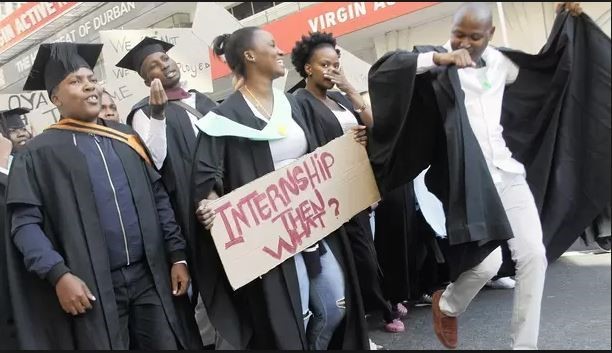
นามิเบียก็เช่นกัน บัณฑิตจบใหม่สวมครุยออกมาประท้วงเพื่อเรียกร้องให้ได้งานทำ
อัตราการว่างงานสุดเลวร้ายก็เกิดขึ้นในนามิเบียและไนจีเรียเช่นกัน สถานการณ์ทางเศรษฐกิจในแอฟริกาใต้ย่ำแย่ โดยประมาณครึ่งหนึ่งของผู้ที่มีอายุต่ำกว่า 34 ปีตกงาน ตัวเลขอย่างเป็นทางการแสดงให้เห็นว่าอัตราการว่างงานฟื้นตัวขึ้นเล็กน้อย แต่อยู่ที่ 32.7% ในไตรมาสที่สี่ของปี 2565 ซึ่งยังคงเป็นอัตราที่สูงที่สุดในแอฟริกาและทั่วโลก

มีรายงานว่า Demi Moore นักแสดงสาวใหญ่ วัย 60 ปี ได้ย้ายมาอยู่กับครอบครัวของ Bruce Willis อดีตสามีของเธอ ซึ่งใช้ชีวิตอยู่กับ Emma Heming ภรรยาคนปัจจุบันของเขา และลูกสาวสองคนของพวกเขาเพื่อให้ความช่วยเหลือหลังจากการวินิจฉัยของ Willis พบอาการของภาวะสมองส่วนหน้าเสื่อม

นักแสดงหญิงวัย 60 ปี Demi Moore และ Bruce Willis อดีตสามีของเธอยังคงมีความสัมพันธ์ที่ดีต่อกันนับตั้งแต่แยกทางกันและยังคงแบ่งปันการเลี้ยงดูลูกสาวสามคนด้วยกัน

Moore ย้ายเข้ามาเพื่อบรรเทาเบาคลายความกดดันของครอบครัว Bruce Willis เมื่ออาการของเขาแย่ลง ตามรายงาน หญิงทั้งสองทำงานร่วมกันเพื่อดูแล Bruce Willis ดาราฮอลลีวูดวัย 67 ปีให้ดีที่สุด

Emma Heming ภรรยาคนปัจจุบันของ Bruce Willis ซึ่งอายุ 44 ปี กล่าวว่า เธอหวังว่า จะใช้อาการป่วยของสามีและเสียงของเธอเพื่อช่วย ‘สร้างความตระหนัก’ ถึงอาการของภาวะสมองส่วนหน้าเสื่อม เธอยกย่องผู้ดูแลและเรียกพวกเขาว่า ‘วีรบุรุษที่ไม่มีใครรู้จัก’

แหล่งข่าวบอกระบุว่า Moore ย้ายเข้ามาแล้ว และเธอจะไม่จากไปจนกว่าจะถึงวาระสุดท้ายของ Willis
มีรายงานว่า Demi Moore นักแสดงสาวใช้เวลาส่วนใหญ่กับครอบครัวของ Willis ในช่วงที่ไวรัสโคโรน่าระบาด

แหล่งข่าวกล่าวเพิ่มเติมว่า ในตอนแรกไม่มีใครนอกครอบครัวสามารถเข้าใจได้ว่า Demi Moore กำลังทำอะไรอยู่กับอดีตสามีและภรรยาใหม่ของเขา แต่ตอนนี้เข้าใจเหตุผลแล้ว
Moore ช่วยทำหน้าที่เป็นเสาหลักของครอบครัว และมุ่งมั่นที่จะทำให้แน่ใจว่า ทุกวันก่อนที่ Willis จะจากไป ในโลกของเขาจะเต็มไปด้วยความรัก
สวัสดีนักอ่านทุกท่านครับ วันนี้ผมมีเรื่องราวน่าสนใจมาเล่าให้อ่านอีกเช่นเคยครับ บทความในครั้งนี้จะพาทุกท่านย้อนกลับไปในช่วงยุค 50s นะครับ ต้องบอกก่อนว่าในยุคนั้นไม่ได้มีเทคโนโลยีล้ำ ๆ เหมือนกับสมัยนี้ ถนนหนทางไม่ได้มีมากมาย รถยนต์ที่ใช้สำหรับเดินทางก็ไม่ได้แพร่หลายเท่าทุกวันนี้ และดูจะเป็นของแพงที่จับต้องได้ยากเสียด้วยครับ
ทำไมวันนี้ผมถึงเกริ่นถึงเรื่องการเดินทาง...เพราะวันนี้ผมจะเล่าเรื่องการเดินทางของหญิงคนหนึ่ง ที่มีชีวิตอยู่ในยุค 50s กอปรกับเธอป่วยเป็นโรคร้าย ซ้ำยังไม่มีเงินทองมากพอที่จะนำมารักษาตัวเอง แต่สิ่งที่เธอตัดสินทำกลับเป็นสิ่งที่หลายคนไม่คาดคิด เธอตัดสินใจออกเดินทางข้ามประเทศด้วยการขี่ม้าไปพร้อมกับสุนัขคู่ใจ
บอกเลยว่า...การเดินทางครั้งนี้เป็นความฝันของเธอครับ

เกริ่นมามากขนาดนี้แล้ว เราไปทำความรู้จักผู้หญิงคนนี้กันดีกว่าครับ เธอมีชื่อว่า Annie Wilkins เดิมทีเป็นเกษตรกรจากมลรัฐ Maine เธอป่วยเป็นโรคร้ายที่ยากจะรักษา และเธอก็ไม่ได้แต่งงานมีครอบครัว Annie Wilkins นิยามตัวเองว่า เธอเป็นคนค่อนข้างนอกรีด ทำอะไรที่ผิดแปลกไปจากผู้หญิงในยุคเดียวกัน เช่น เธอสวมกางเกงเป็นประจำ ทั้งๆ ที่ผู้หญิงส่วนใหญ่นิยมสวมกางเกง เธอเขียนคิ้ว เธอขี่ม้าไปทำงานที่โรงงานรองเท้าในเมืองลูอิสตัน ทุกอย่างที่เธอทำเป็นจุดสนใจของผู้คน แต่ในทางกลับกัน ผู้คนก็มองไปที่เธออย่างระแวดระวังด้วย

ในปี ค.ศ.1954 ขณะนั้น Annie Wilkins มีอายุ 63 ปี เธอได้รับการวินิจฉัยจากแพทย์ว่าเธอป่วยเป็นโรคร้ายในระยะสุดท้าย และแพทย์ก็ระบุว่าเธอจะมีชีวิตอยู่ได้อีกเพียง 2 ปีเท่านั้น ความกลัวและความหดหู่ถาโถมเข้าหาเธอแบบไม่ยั้ง เธอไม่มีเงิน และลุงที่เป็นครอบครัวเพียงคนเดียวของเธอก็เพิ่งเสียชีวิตไป หนำซ้ำเธอยังต้องสูญเสียฟาร์มของเธออีกด้วย
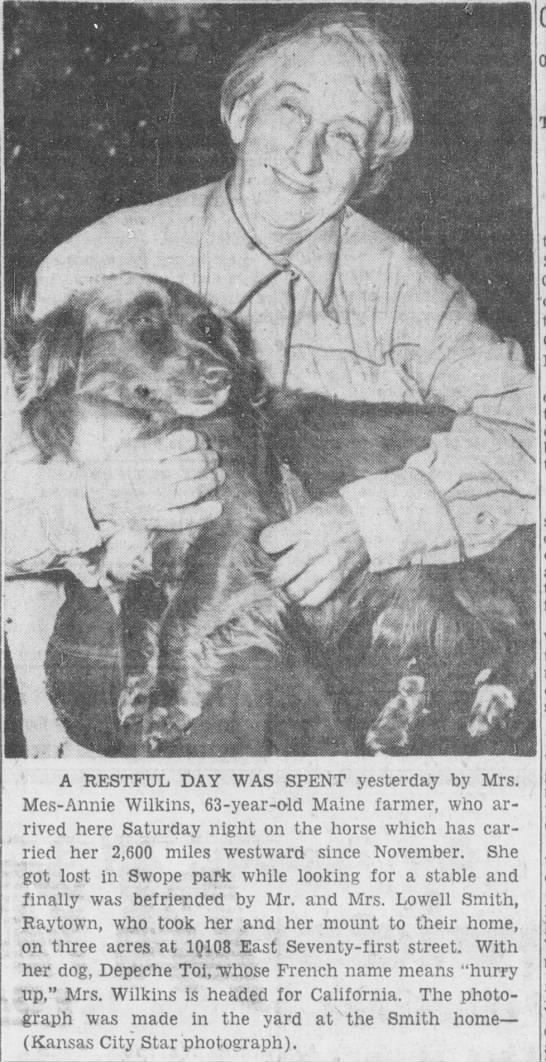
Annie Wilkins ทบทวนเรื่องราวต่างๆ ในชีวิตของเธอ และก็คิดไปถึงแม่ของเธอที่เคยบอกไว้ว่า อยากจะไปเที่ยวที่มลรัฐแคลิฟอร์เนียนมาตลอด แต่ก็ไม่เคยมีโอกาสได้ทำ เนื่องจากความยุ่งเหยิงในชีวิตตลอดที่ผ่านมา
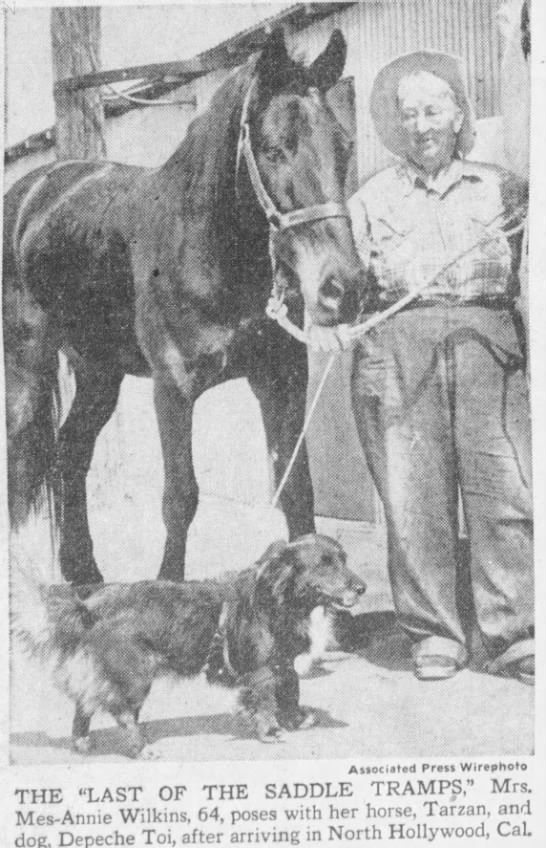
Annie Wilkins ตัดสินใจจะใช้เวลาอีก 2 ปีที่เหลือให้เกิดประโยชน์สูงสุด และต้องการเดินทางข้ามประเทศเป็นครั้งสุดท้ายในชีวิต อีกทั้งเธอต้องการเห็นมหาสมุทรแปซิฟิกก่อนที่เธอจะตาย (มลรัฐ Maine อยู่ทางตอนเหนือของสหรัฐฯ ติดกับมหาสมุทรแอตแลนติก) เธอจึงไม่สนใจคำแนะนำของคุณหมอที่จะให้เธอย้ายเข้าไปอยู่ในบ้านสงเคราะห์ของเทศมณฑลเพื่อใช้ชีวิตในวาระสุดท้าย
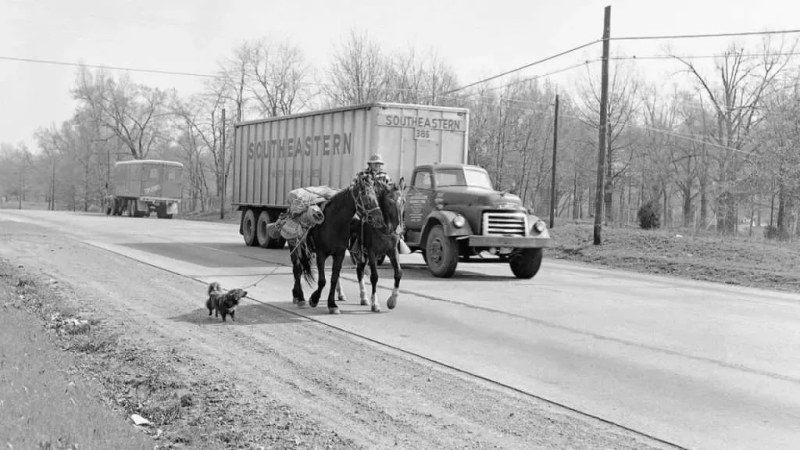
เมื่อตัดสินใจแน่วแน่แล้ว Annie Wilkins จึงซื้อม้ารูปร่างดีสีน้ำตาลมาไว้สำหรับเป็นยานพานะ โดยเธอตั้งชื่อให้มันว่า ‘Tarzan’ นอกจากนี้เธอยังต้องจำนองบ้านหลังเล็กของเธอเพื่อเปลี่ยนมาเป็นเงินไว้ใช้สำหรับการเดินทางอีกด้วย
Annie Wilkins เริ่มต้นเดินทางในวันที่ 6 พฤศจิกายน ค.ศ. 1954 โดยเธอสวมชุดเอี๊ยมของผู้ชาย และเดินมุ่งหน้าไปทางใต้พร้อมกับ ม้า 2 ตัว ได้แก่ Tarzan และ Rex และสุนัขชื่อ Depeche Toi (แปลว่า ‘เร็วเข้า’ ในภาษาฝรั่งเศส) โดยหวังเพียงว่าจะผ่านทุ่งหิมะก่อนฤดูหนาวไปให้ได้
โอกาสริบหรี่!! ‘José Salvador Alvarenga’ ชายผู้รอดชีวิต หลังลอยเรือกลางมหาสมุทรแปซิฟิกนานถึง 438 วัน
สวัสดีนักอ่านทุกท่านครับ วันนี้ผมมีเรื่องราวน่าสนใจมาเล่าให้ทุกท่านได้อ่านกันอีกแล้ว วันนี้จะขอเล่าเกี่ยวกับเรื่องการเอาชีวิตรอดกลางทะเลของผู้ชายที่ชื่อว่า José Salvador Alvarenga ผู้ซึ่งลอยเรืออยู่ในมหาสมุทรแปซิฟิกเป็นเวลากว่า 438 วัน เป็นระยะเวลากว่า 6,700 ไมล์ ต้องบอกเลยว่าเรื่องราวของเขานั้นนับเป็นเรื่องเหลือเชื่อและมีโอกาสเกิดขึ้นได้น้อยมาก ๆ
แต่ก่อนจะเล่าเรื่องของ José Salvador Alvarenga ผมขอเล่าเรื่องที่คล้าย ๆ กันก่อน โดยเรื่องนี้เกิดขึ้นราว ๆ 200 ปีก่อน สมัยนั้นการขนส่งที่ได้รับความนิยมมากที่สุดคือการขนส่งทางเรือ ซึ่ง ณ ตอนนั้นเรื่องราวที่เกิดขึ้น เกิดกับกัปตันเรือที่ชื่อ Jukichi และลูกเรืออีกสี่คน โดยพวกเขาได้ออกเดินเรือ Tokujomaru เพื่อนำถั่วเหลืองไปส่งที่เมืองเอโดะ (เมืองโตเกียวในปัจจุบัน) แต่โชคร้ายที่พวกเขาประสบกับพายุลูกใหญ่ และพายุก็ทำให้เสากระโดงเรือของพวกเขาเสียหายหนัก
แม้เรือจะเสียหาย แต่ก็ยังสามารถลอยลำอยู่กลางทะเลอันเวิ้งว้างได้ กัปตันเรือแลลูกเรือกินอาหารและดื่มน้ำที่บรรทุกมาจนหมด ทำให้ต้องรองน้ำฝนเก็บไว้ดื่ม และต้องกินถั่วเหลืองที่บรรจุกมาแทน
เวลาผ่านไปหลายเดือน พวกเขาก็เริ่มป่วยด้วยโรคเลือดออกตามไรฟัน เนื่องจากร่ากายขาดสารอาหาร และเมื่อเวลาผ่านไปอีก ลูกเรือบางคนก็เสียชีวิตไปทีละคน เวลาผ่านไปราวๆ หนึ่งปี ก็เหลือเพียงแค่กัปตันเรือและลูกเรืออีกสองคน (Otokichi และ Hanbe) เท่านั้น
สุขภาพของพวกเขาเริ่มย่ำแย่ และมีแววว่าจะเสียชีวิตในอีกไม่นาน แต่ท้ายที่สุดเรือของพวกเขาก็ลอยมาติดที่นอกชายฝั่ง California ในปี 1815 ทำให้พวกเขาทั้งสามคนเป็นชาวญี่ปุ่นกลุ่มแรกที่มาเหยียบชายฝั่งของสหรัฐอเมริกา
ทั้งสามได้รับความช่วยเหลือจนสุขภาพดีขึ้น และได้เดินทางกลับประเทศญี่ปุ่น แต่น่าเศร้าที่ Hanbe เสียชีวิตระหว่างการเดินทางกลับ จึงเหลือเพียงแค่กัปตัน Jukichi และ Otokichi ที่รอดชีวิตกลับมาเหยียบแผ่นดินเกิด
เมื่อมาถึง Jukichi ได้รับเกียรติมากมาย และได้รับนามสกุล Oguri ด้วย
จวบจนถึงปัจจุบันนี้เรื่องราวของทั้งสี่คนยังเป็นสถิติโลกในเรื่องการรอดชีวิตในทะเลเป็นเวลาที่ยาวนานที่สุด โดยพวกเขาใช้ชีวิตกลางทะเลรวมทั้งสิ้น 484 วัน ระยะทางกว่า 5,000 ไมล์
สำหรับเรื่องราวการรอดชีวิตของ José Salvador Alvarenga นั้นนับเป็นเรื่องราวที่ถููกพูดถึงในหลากหลายแง่มุม บางคนก็เคลือบแคลงใจที่เขาสามารถรอดชีวิตมาได้ บางคนก็ชื่นชมในความอทนของเขา
ย้อนกลับไปเมื่อวันที่ 30 มกราคม 2014 ขณะนั้นตัวเขาอายุราวๆ 37 ปี ได้ว่ายน้ำเข้าฝั่งที่ Tile Islet ซึ่งเป็นเกาะเล็ก ๆ ซึ่งเป็นส่วนหนึ่งของ Ebon Atoll บนหมู่เกาะ Marshall ในสภาพเปลือยกาย ถือมีด และตะโกนเป็นภาษาสเปน เขาได้รับการรักษาในโรงพยาบาลในเมืองมาจูโร ก่อนที่จะบินกลับไปหาครอบครัวในเอลซัลวาดอร์ในวันที่ 10 กุมภาพันธ์ 2014
สื่อรายงานว่าเขาใช้ชีวิตในทะเลตั้งแต่วันที่ 17 พฤศจิกายน 2012 และรอดชีวิตจากการกินปลาดิบ เต่า นกตัวเล็ก ปลาฉลาม และน้ำฝน โดยใช้ชีวิตแบบนั้นอยู่ประมาณ 14 เดือนก่อนถูกพบ
ย้อนกลับไปเมื่อวันที่ 17 พฤศจิกายน 2012 José Salvador Alvarenga ได้ออกเรือจากหมู่บ้านชาวประมง Costa Azul ในเม็กซิโก พร้อมด้วย Ezequiel Córdoba ชาวประมงวัย 23 ปี เพื่อนร่วมงานของเขา ซึ่งพวกเขาไม่เคยทำงานร่วมกันมาก่อน
Alvarenga ตั้งใจจะใช้เวลา 30 ชั่วโมงในการตกปลาทะเลน้ำลึก ซึ่งในระหว่างนั้นเขาหวังว่าจะจับปลามาร์ลิน และปลากะพง แต่เพื่อนร่วมงานที่คุ้นเคยของเขาไม่สามารถทำงานได้ เจ้านายจึงให้ Córdoba ที่ไม่มีประสบการณ์มาก่อนเลยไปกับเขาแทน
ทั้งสองออกเรือกรรเชียงเล็กไฟเบอร์กลาสขนาด 7 เมตร (23 ฟุต) ซึ่งติดตั้งเครื่องยนต์เพียงเครื่องเดียว และถังน้ำแข็งสำหรับเก็บปลา (ซึ่งต่อมาเป็นที่เก็บน้ำฝนสำหรับดื่ม)
แต่เมื่อออกจากฝั่งได้ไม่นานเรือของทั้งคู่ก็ถูกพายุพัดจนเรือออกนอกเส้นทาง เครื่องยนต์รวมทั้งอุปกรณ์อิเล็กทรอนิกส์แบบพกพาในเรือส่วนใหญ่เสียหาย แม้ว่า Alvarenga จะพยายามติดต่อเจ้านายของเขาทางวิทยุก่อนที่มันจะใช้การไม่ได้ เพราะแบตเตอรี่หมด แต่ก็ไม่เป็นผล
พายุกินเวลานาน 5 วัน เมื่อพายุสงบลง Alvarenga และ Córdoba ต่างก็ไม่รู้ว่าพวกเขาอยู่ที่ไหน หรือจะกลับบ้านได้อย่างไร พายุได้ทำลายเครื่องมือประมงส่วนใหญ่ของพวกเขา เหลือเพียงอุปกรณ์พื้นฐาน ไม่มีเครื่องยนต์ ไม่มีใบเรือ และไม่มีกระทั่งไม้พาย
และแม้ว่าพวกเขาจะจับปลาสดได้เกือบ 500 กิโลกรัม (1,100 ปอนด์) แต่ก็ต้องทิ้งลงน้ำ เพื่อรักษาสมดุลของเรือให้ลอยอยู่ได้
ขณะที่ทางด้าน เจ้านายของ Alvarenga ก็ได้ให้ทีมค้นหาออกตามหาพวกเขา แต่ก็ต้องล้มเลิกไป เนื่องจากทัศนวิสัยไม่ดี
เวลาหลายวันผ่านไป Alvarenga และ Córdoba ได้เรียนรู้วิธีหาอาหาร Alvarenga สามารถจับ ปลา เต่า แมงกะพรุน และนกทะเล ได้ด้วยมือเปล่า และเก็บเศษอาหารและเศษพลาสติกที่ลอยอยู่ในน้ำมาใช้บ้างเป็นครั้งคราว พวกเขาต้องดื่มน้ำจากน้ำฝนที่ตกลงมา แต่ก็มีบ่อยครั้งที่ต้องดื่มเลือดเต่า หรือปัสสาวะของตัวเอง
เรืองประมงลำเล็ก ๆ ลอยไปเรื่อย ๆ โดยไร้ซึ่งทั้งจุดหมายและความหวัง สี่เดือนผ่านไป Córdoba มีอาการอาหารเป็นพิษ และเริ่มหมดความหวัง เขาตัดสินใจหยุดกินอาหารจนตาย
Alvarenga เล่าว่า สี่วันหลังการตายของ Córdoba เขาคิดจะยอมแพ้ด้วยการฆ่าตัวตายเช่นกัน แต่ด้วยความเชื่ออันแรงกล้าทางศาสนาจึงพยายามอดทนต่อไป
Alvarenga อ้างว่า Córdoba ขอให้เขาสัญญาว่าจะไม่กินศพของเขา หากเขาเสียชีวิต ดังนั้น Alvarenga จึงเก็บศพของ Córdoba ไว้บนเรือ และพูดกับศพนั้นด้วยซ้ำ
หลังจากหกวันที่เพื่อนเพียงคนเดียวของเขาตายไป Alvarenga ก็ตระหนักว่า ตนเองกำลังใกล้ที่จะวิกลจริตแล้ว จึงทิ้งศพลงน้ำ
‘Seattle’ เมืองศูนย์รวมความหลากหลายระดับโลก มัดรวม ‘แหล่งท่องเที่ยว-กิจกรรมน่าสนใจ’ ที่ไม่ควรพลาด
ใครเคยดูหนังรักโรแมนติกเรื่อง ‘Sleepless in Seattle’ ก็จะเห็นบรรยากาศน่าอยู่น่าท่องเที่ยวของเมืองอันมีชื่อเสียงโด่งดังแห่งนี้ นอกจากนี้ ‘ซีแอตเติล’ ยังเป็นฉากประกอบในหนังอีกนับไม่ถ้วน และถ้าพูดถึงเมืองท่องเที่ยวทางฝั่งตะวันตกของประเทศสหรัฐอเมริกาแล้ว คนไทยมักคุ้นเคยกับเมืองลอสแอนเจลีส ซานฟรานซิสโก พอร์ตแลนด์ และซีแอตเติล ซึ่งแต่ละแห่งก็มีเอกลักษณ์โดดเด่นเฉพาะ ราวกับหยิบยื่นความแปลกใหม่ให้แก่ผู้ไปเยือนแบบไม่ซ้ำกัน
‘ซีแอตเติล’ เมืองในรัฐวอชิงตัน ซึ่งอยู่ทางตอนเหนือสุดติดกับชายแดนประเทศแคนาดา หากใครอยากลองไปก็สามารถไปเยือนได้ตลอดปี ซึ่งแต่ละช่วงเวลาและฤดูก็จะมีความน่าสนใจแตกต่างกันไป เช่น ช่วงฤดูใบไม้ร่วงแม้จะค่อนข้างเปียกเฉอะแฉะเพราะฝนตกลงมามาก แต่ใบไม้ที่เปลี่ยนสีก็สวยงามมากพอที่จะแลกกับความเหน็บหนาวของลมฝน เรียกว่า คุ้มค่าที่มาเยือน
แม้เมืองนี้จะเต็มไปด้วยตึกสูงระฟ้า แต่ก็เดินทางสัญจรสะดวกสบาย เพราะมีทางจักรยานเชื่อมต่อทั้งเมือง ดังนั้น การเช่าจักรยานปั่นเล่นจึงเป็นกิจกรรมแสนเพลินและสามารถเก็บจุดท่องเที่ยวได้มากกว่าการเดินหลายเท่าตัว จะเลือกปั่นเลาะไปตามริมทะเล เพื่อไปยังด้านตรงกันข้ามของอ่าว หรือจะปั่นขึ้นลงเนินไปยังสวนสาธารณะต่าง ๆ ก็สามารถได้ อีกทั้งเมืองนี้เป็นเมืองที่คนใช้จักรยานเป็นพาหนะในชีวิตประจำวันหรือเพื่อสันทนาการกันค่อนข้างแพร่หลาย ส่วนหนึ่งเพราะอากาศเย็นสบายตลอดทั้งปี
หรือถ้าไม่ชอบเดินหรือปั่นจักรยานก็ใช้วิธีโดยสารขนส่งสาธารณะก็ได้ตามสะดวก แถมราคาไม่แพง หรือหากอยากนั่งเฟอรี่ข้ามฟากก็เป็นอีกกิจกรรมที่ทำเพลินเช่นเดียวกัน แต่ขอกระซิบบอกตรงนี้เลยว่าหากใครที่ประสงค์ใช้รถยนต์อาจจะต้องเผื่อใจกับการหาที่จอดรถ เพราะนั่นคือเรื่องยากสำหรับเมืองนี้พอควร หรือไม่ก็อาจจะเจอค่าจอดรถที่แพงหูฉี่ โดยเฉพาะย่านธุรกิจหรือย่านท่องเที่ยวทั้งหลาย
เมืองแห่งนี้มีสถานที่ท่องเที่ยวที่ได้รับความนิยมสูง หรือแทบจะเรียกว่าเป็นไฮไลต์สำคัญเลย นั่นคือตลาดสดไพค์เพลส (Pike Place Market) เพราะมีของกินและของใช้ให้ช็อปอย่างเพลิดเพลิน ร้านรวงและแผงขายของเบียดกันอยู่ในตลาดแห่งนี้ มีสินค้าวางเรียงอยู่หน้าร้านอย่างเป็นระเบียบ เมื่องมองแล้วก็ทำให้เกิดความรู้สึกอยากจับจ่ายซื้อขอ
.
นอกจากนี้ตลาดแห่งนี้นับว่าเป็นตลาดสดที่เก่าแก่ที่สุดแห่งหนึ่งในสหรัฐอเมริกาเลยทีเดียว ซึ่งโซนขายปลาจะคึกคักเป็นพิเศษ เพราะคนนิยมไปมุงดูและถ่ายรูปเพราะพนักงานตะโกนขายของกันอย่างออกรสออกชาติ ทำให้เกิดความสนุกทั้งคนซื้อ คนขาย และคนดู
หากเดินไปอีกหน่อยจะเป็นโรงงานผลิตชีสที่ติดกระจกโดยรอบ โชว์ให้เห็นกรรมวิธีแทบจะทุกขั้นตอน ใกล้ ๆ กันเป็นห้องแถวชั้นเดียวซึ่งก็คือร้านกาแฟยี่ห้อสตาร์บัคส์สาขาแรก เปิดแต่เช้ามืด คนต่อแถวยาวตลอดวันเพื่อเช็กอิน ริมถนนมีนักดนตรีร้องรำทำเพลงเปิดหมวก มีจุดชมวิวเวิ้งอ่าวด้วย ตรอกเล็กบางแห่งมีร้านกาแฟเล็กเก๋แทรกซุกอยู่ แต่ก็มีความน่าสนใจไม่แพ้ร้านรวงบนถนนใหญ่เลย

อีกหนึ่งแลนด์มาร์กของเมืองนี้คือ หอคอย Space Needle ซึ่งชั้นสูงสุดมีรูปทรงคล้ายจานบินต่างดาว นักท่องเที่ยวสามารถจ่ายเงินซื้อตั๋วแล้วขึ้นลิฟท์ไปได้เลย สามารถเดินได้โดยรอบ ได้วิวมุมสูงแบบ 360 องศา แต่ราคาค่าขึ้นไปชมวิวค่อนข้างแพง แต่หากใครเห็นว่าครั้งหนึ่งในชีวิตขอเก็บไฮไลต์การเที่ยวเมืองให้ครบจะยอมจ่ายเพื่อการนี้ก็ถือว่าคุ้มค่า คิดเสียว่าเงินทองหาเมื่อไหร่ก็ได้ เวลาพิเศษนี่สิที่ต้องหวงแหน ขึ้นหอคอยเสร็จแล้วก็สามารถเดินเล่นในสวนสาธารณะกว้าง มีลานน้ำพุสวย ดอกไม้หลากชนิด ทางเดินคดเคี้ยวลัดเลาะโดยมีงานศิลปะจัดวางตามจุดต่าง ๆ เดินเล่นเพลิดเพลิน หากใครชอบถ่ายรูปหรือเซลฟี่รับรองถูกใจเป็นแน่
เท่านั้นยังไม่พอ ยังมีพิพิธภัณฑ์หลายแห่ง สวนสัตว์ และพิพิธภัณฑ์สัตว์น้ำมีหลากหลายให้เลือกไปเที่ยวชม เหล่านี้ล้วนแล้วแต่เหมาะกับครอบครัว โดยเฉพาะอย่างยิ่งเด็ก ๆ หรือผู้ใหญ่ที่ต้องการสอดแทรกความรู้ด้านต่าง ๆ ให้แก่ตัวเองในขณะท่องเที่ยว เป็นวิธีเสริมประสบการณ์ชีวิตที่ดีมากอีกอย่างหนึ่งเลยล่ะ
จุดต่อมาที่น่าสนใจก็คือ ชิงช้าสวรรค์หรือ Seattle Great Wheel ลักษณะคล้าย London Eye และในอีกหลายต่อหลายเมืองทั่วโลกนั้นก็เป็นอีกจุดท่องเที่ยวสำคัญ นักท่องเที่ยวนิยมจ่ายเงินขึ้นนั่งชมวิวทิวทัศน์กับเพื่อนฝูง คนรัก หรือครอบครัว ในช่วงค่ำบางวันก็มีการเปิดไฟเป็นระบบแสงสีตระการตาชวนชม
ไชน่าทาวน์ก็เป็นอีกจุดหนึ่งที่น่าสนใจ โดยเฉพาะอย่างยิ่งคนที่ไม่คุ้นชินกับอาหารตะวันตก แค่ได้ไปเดินเล่นแถวนี้ก็หาของกินรสชาติดั้งเดิมแบบเอเชีย กินแล้วถูกปากถูกลิ้น มีทั้งที่เป็นร้านอาหารหรูและร้านข้าวราดแกง อันที่จริง ไม่เฉพาะคนจีนเท่านั้นที่กระจุกกันอยู่ย่านนี้ คนเชื้อชาติอื่น ๆ จากซีกโลกฝั่งตะวันออก อย่างญี่ปุ่น เกาหลี เวียดนามก็อาศัยอยู่และทำมาค้าขายปะปนกัน ร้านขายของชำและซูเปอร์มาร์เก็ตที่หาวัตถุดิบจำพวกของสดของคาวมีหลายแห่ง
ถัดมาคือย่าน Capitol Hill อันที่จริงแต่เดิมเคยเป็นย่านพักอาศัย ปัจจุบันเต็มไปด้วยร้านรวง ร้านอาหาร ผับบาร์ บรรดาศิลปินมักมาซุ่มทำงานศิลปะกันที่ย่านนี้ อาคารบางหลังดูภายนอกธรรมดา แต่ภายในเป็นสตูดิโอ แกเลอรี่ และโรงงานขนาดเล็กสำหรับผลิตชิ้นงานทั้งภาพและดนตรี นอกจากนี้ ย่านนี้ยังขึ้นชื่อว่าเป็นศูนย์รวมของชาว LGBTQ อีกด้วย
หากใครชื่นชอบสินค้าสภาพดีราคาถูกแนะนำให้ไปเที่ยวร้านขายของมือสอง บางแห่งดำเนินกิจการโดยองค์กรการกุศลอย่าง Goodwill ซึ่งมีร้านสาขานับไม่ถ้วนอยู่แทบทุกเมืองในทุกรัฐ แค่ในเมืองนี้ก็น่าจะไม่ต่ำกว่าห้าแห่ง หาสาขาใกล้สุดได้อย่างง่ายดายด้วยการค้นในแผนที่ Google ของที่ขายส่วนใหญ่คือเสื้อผ้าเครื่องแต่งกาย กระเป๋า รองเท้า และเครื่องใช้ในครัวเรือนสภาพดี แต่ราคาถูกกว่ามือหนึ่งเกินครึ่ง
ที่พูดมาทั้งหมดเป็นเพียงน้ำจิ้มชิมลางและข้อมูลคร่าว ๆ หากใครอยากรู้ว่าซีแอตเติลมีดีอย่างที่ใครต่อใครกล่าวขานกันหรือไม่ ก็คงต้องหาโอกาสไปเที่ยวเอง ไม่แน่ เมืองนี้อาจจะกลายเป็นเมืองสุดประทับใจแห่งหนึ่งก็เป็นได้
สว่าง ทองดี
จบการศึกษาด้านวิทยาศาสตร์ (ชีววิทยา) จากมหาวิทยาลัยขอนแก่น เริ่มต้นด้วยอาชีพด้วยการเป็นครู ควบคู่ไปกับการใช้เวลาในช่วงปิดเทอมไปท่องเที่ยวทั้งในและต่างประเทศ สอนหนังสืออยู่เก้าปีจึงตัดสินใจลาออก และเริ่มเดินทางจริงจัง หลัก ๆ เป็นการไปด้วยจักรยาน รอนแรม ค่ำไหนนอนนั่น
ช่วงนี้เรื่องฝุ่น PM 2.5 ได้กลับมาเป็นหัวข้อที่คนเริ่มพูดถึงกันอีกครั้ง เนื่องจากผู้คนสมัยใหม่เน้นดูแลเรื่องสุขภาพมากขึ้น จึงกังวลเกี่ยวกับปัญหาฝุ่นละอองขนาดเล็กเกินมาตรฐาน ที่ส่งผลกระทบต่อสุขภาพในหลาย ๆ ด้าน ได้แก่ ระบบทางเดินหายใจ ระบบหัวใจและหลอดเลือด ระบบตา ระบบผิวหนัง นอกจากนี้ยังเพิ่มอัตราการเสียชีวิตจากภาวะเส้นเลือดอุดตันในสมองอีกด้วย
ฝุ่นละอองขนาดขนาดเล็ก แบ่งเป็น 2 ชนิด คือ
1. ฝุ่นละเอียด เป็นอนุภาคที่มีเส้นผ่านศูนย์กลางเล็กกว่า 2.5 ไมครอน (PM2.5) ฝุ่นละเอียดเกิดจากการเผาไหม้ทั้งจากยานพาหนะและผลผลิตทางการเกษตร กระบวนการผลิตในโรงไฟฟ้าหรือโรงงานอุตสาหกรรม ควันที่เกิดจากหุงต้มอาหาร นอกจากนี้ก๊าซซัลเฟอร์ไดออกไซด์ (SO2) ออกไซด์ของไนโตรเจน (NOX) และสารอินทรีย์ระเหยง่าย (VOCs) จะทำปฏิกิริยากับสารอื่นในอากาศทำให้เกิดเป็นฝุ่นละเอียดได้
2. ฝุ่นหยาบ เป็นอนุภาคที่มีเส้นผ่านศูนย์กลาง 2.5-10 ไมครอน (PM10) เกิดจากการจราจร, การขนส่งหรือฝุ่นจากการบดย่อยหิน
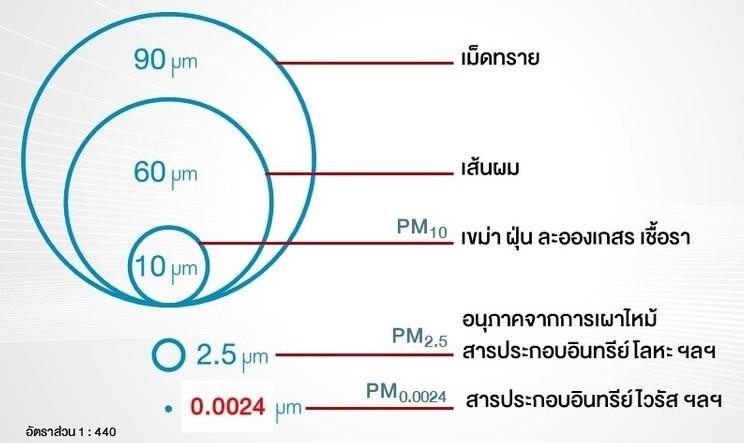
ปัจจุบันพบว่าหลายพื้นที่มีฝุ่นละเอียด (PM2.5) เกินระดับมาตรฐาน ซึ่งมีสาเหตุมาจากสภาพอากาศและความกดอากาศ ทำให้การลอยตัวและการกระจายตัวของฝุ่นละเอียดอยู่ในระดับต่ำ การไหลเวียนและถ่ายเทอากาศไม่ดี จึงทำให้เกิดการสะสมของฝุ่นละเอียดเพิ่มสูงขึ้น ประกอบกับควันไอเสียรถยนต์และรถบรรทุกในที่มีการจราจรหนาแน่นหรือเขตอุตสาหกรรม รวมทั้งการเผาป่าหรือการเผาพื้นที่ทางการเกษตรเพื่อเตรียมดินสำหรับการเพาะปลูกในฤดูกาลต่อไป
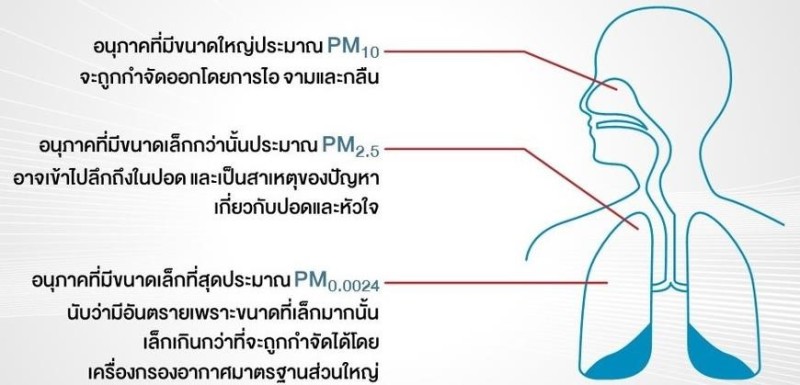
>> ดัชนีคุณภาพอากาศ 0 - 25 ไมโครกรัมต่อลูกบาศก์เมตร
-คุณภาพอากาศดีมาก
-สามารถทำกิจกรรมหรือออกกำลังกายกลางแจ้งได้
>> ดัชนีคุณภาพอากาศ 26 - 37 ไมโครกรัมต่อลูกบาศก์เมตร
-มีผลกระทบต่อสุขภาพเล็กน้อยถึงปานกลาง โดยเฉพาะในกลุ่มเสี่ยง (ผู้สูงอายุ, หญิงตั้งครรภ์, เด็กเล็กหรือผู้ที่มีโรคประจำตัว)
-ควรหลีกเลี่ยงการทำกิจกรรมหรือออกกําลังกายกลางแจ้ง เช่น ปั่นจักรยานหรือวิ่ง
-เฝ้าระวังปัญหาสุขภาพที่อาจเกิดขึ้น เช่น หายใจลําบาก หายใจถี่ หายใจไม่ออก หายใจมีเสียงวี้ด แน่นหน้าอก เจ็บหน้าอก ใจสั่น คลื่นไส้ เมื่อยล้าหรือวิงเวียนศีรษะ ให้รีบพบแพทย์
>> ดัชนีคุณภาพอากาศ 38 - 50 ไมโครกรัมต่อลูกบาศก์เมตร
-มีผลกระทบต่อสุขภาพปานกลางโดยเฉพาะในกลุ่มเสี่ยง
-ลดระยะเวลาการทำกิจกรรมนอกบ้านหรือออกกำลังกายกลางแจ้ง
-เมื่อต้องออกนอกบ้านควรสวมหน้ากากอนามัยที่ป้องกัน PM2.5
-หากมีอาการไอบ่อย หายใจลำบาก หายใจถี่ หายใจไม่ออก หายใจมีเสียงวี้ด แน่นหน้าอก เจ็บหน้าอก ใจสั่น คลื่นไส้ เมื่อยล้าผิดปกติหรือวิงเวียนศีรษะ ให้รีบพบแพทย์
-ผู้ที่มีโรคประจำตัว เตรียมยาประจำตัวให้พร้อมและปฏิบัติตามคำแนะนำของแพทย์
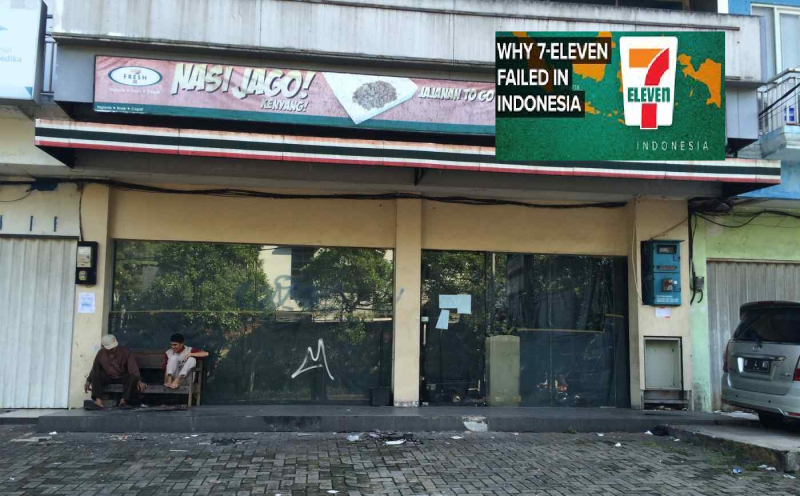
สวัสดีนักอ่านทุกท่านครับ วันนี้ผมมีเรื่องราวน่าสนใจจากประเทศเพื่อนบ้านมาเล่าสู่กันฟังครับ หากพูดถึงร้านสะดวกซื้อในไทยที่เราเห็นได้บ่อย เข้าใช้บริการบ่อย ก็ต้องนึกถึง 7-Eleven ถูกต้องไหมครับ และเป็นที่รู้กันโดยทั่วว่า 7-Eleven ประสบความสำเร็จในประเทศไทยอย่างยิ่ง
แต่ถึงแม้ว่า 7-Eleven จะประสบความสำเร็จอย่างถล่มทลายในหลาย ๆ ประเทศทั่วภูมิภาคเอเชียตะวันออกเฉียงใต้ ไม่ว่าจะเป็น ไทย มาเลเซีย ฟิลิปปินส์ เวียดนาม กัมพูชา และเมียนมาร์ แต่ใน ‘อินโดนีเซีย’ แล้วนั่น กลับเป็นเรื่องที่ยากแสนยาก และไม่มีทีท่าว่าจะสามารถเจาะตลาดร้านสะดวกซื้อของประเทศนี้ได้
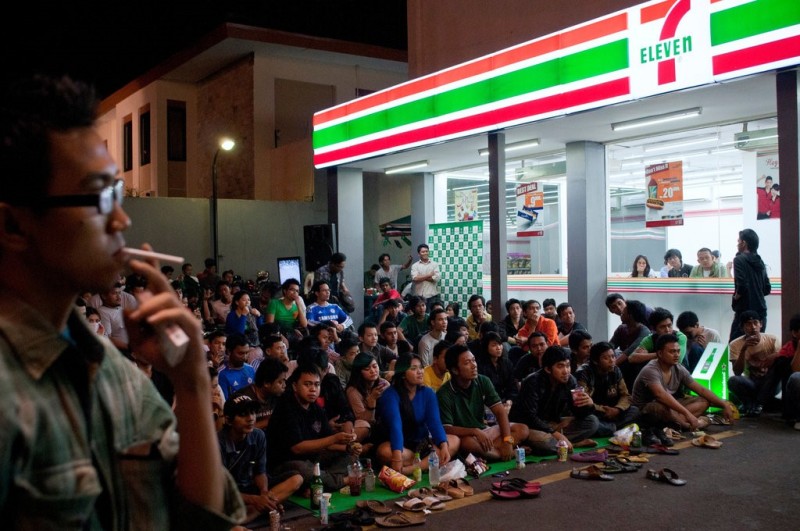
เหตุผลหลัก ๆ ที่เป็นเช่นนั้น คือ ‘อินโดนีเซีย’ มีเครือข่ายร้านค้าสะดวกซื้ออยู่แล้ว เช่น ‘Indomaret’ และ ‘Alfamart’ ที่สามารถพบเจอได้เกือบทุก ๆ ๑ กม. หรือน้อยกว่านั้น และร้านค้า ๒ เจ้านี้จะกระจายตัวอยู่ตามเมืองใหญ่หรือเมืองเล็ก ซึ่งเป็นวิธีเดียวกับที่ 7-Eleven ทำแล้วได้ผลดีในประเทศสิงคโปร์ นอกจากนี้ร้านสะดวกซื้ออย่าง Lawson's และ Family Mart ก็ใช้วิธีการนี้ด้วยเช่นกัน

นอกจาก 7-Eleven จะนิยมเปิดร้านสะดวกซื้อภายในอาคาร สำนักงาน หรือในพื้นที่ที่มีคนพลุกพล่าน โดยกำหนดเป้าหมายไปยังพื้นที่ที่ Indomaret และ Alfamart ตั้งอยู่ หวังให้มีลูกค้าเข้ามาใช้บริการแล้ว 7-Eleven ยังอัปเกรดร้านให้เป็นร้าน ‘ระดับพรีเมียม’ โดยมีบริการสถานที่นั่งรับประทานอาการ ดื่มเครื่องดื่ม และมี Wi-Fi ให้ใช้ฟรีอีกด้วย
ดูเหมือนว่ากลยุทธ์นี้จะดึงดูดความสนใจจากลูกค้าได้ แต่ก็เพียงแค่ในระยะแรกที่เป็นกระแสเท่านั้น เพราะเมื่อเวลาผ่านไปผู้คนมักจะเข้ามาซื้อเพียงเครื่องดื่มที่มีราคาถูก เพียงหวังจะได้นั่งในร้านเพื่อใช้ Wi-Fi ฟรีเป็นเวลาหลายชั่วโมง ด้วยสาเหตุนี้จึงทำให้ 7-Eleven มีรายได้น้อย ในขณะที่ค่าใช้จ่ายสูง (ค่าไฟฟ้า อินเทอร์เน็ต และค่าเช่าพื้นที่ในพื้นที่ระดับพรีเมียม)
7-Eleven เป็นที่นิยมในกลุ่มวัยรุ่น นักเรียนนักศึกษา อายุระหว่าง 18 - 25 ปี โดยลูกค้ากลุ่มนี้จะใช้ 7-Eleven เป็นสถานที่แฮงก์เอาต์ และสถานที่ท่องเที่ยวทั้งในกลางวันและกลางคืน (24 ชม.) โดยมีการนำเสนอรายการอาหารและเครื่องดื่มของ 7-Eleven แบบดั้งเดิมเช่น Slurpee และของว่างพร้อมกับอาหารท้องถิ่นและเครื่องดื่มแอลกอฮอล์ นั่นจึงไม่แปลกใจว่าทำไมถึงฮิตในกล่มวัยรุ่น

ในปี ค.ศ. 2020 7-Eleven มีสาขามากถึง 70,750 แห่งทั่วโลก แต่ร้าน 7-Eleven แต่กลับไม่มีสักสาขาเดียวในอินโดนีเซีย เนื่องจากในปี ค.ศ. 2017 7-Eleven ได้ประกาศปิดสาขาทั้งหมด หลังเข้ามารุกธุรกิจในประเทศนี้ตั้งแต่ปี ค.ศ. 2009
การดำเนินงานของ 7-Eleven ในอินโดนีเซียจะดำเนินงานผ่านผู้ให้บริการท้องถิ่นคือ PT Modern Internasional ซึ่งจัดการบริการที่ตรงกันข้ามกับร้านสะดวกซื้อในอเมริกาที่เน้นการซื้อกลับบ้านและของกินเล่นยามดึก หลังเริ่มธุรกิจได้ไม่นาน บริษัท PT Modern Internasional ก็เริ่มขยายตัวภายในกรุงจาการ์ตา โดย 7-Eleven เปิดสาขาแห่งที่ 21 ภายในปี ค.ศ. 2010 และมีสาขาครบ 100 แห่งในปี ค.ศ. 2012
ในปี ค.ศ. 2013 บริษัทมียอดขายสูงสุดประมาณ 78 แห่งจากร้านค้าทั้งหมด 190 แห่ง ดูเหมือนว่าอนาคตของ 7-Eleven ในอินโดนีเซียจะสดใส แต่ในความเป็นจริงกลับไม่ใช่ เนื่องจากประสบปัญหาที่แก้ไม่ตกเพราะลูกค้าไม่ยอมใช้เงินในร้าน แม้ว่าจะมีลูกค้าจำนวนมากใน 7-Eleven แต่ก็จ่ายเงินซื้อเครื่องดื่มเพียงแก้วเดียว แล้วนั่งนาน ๆ หลายชั่วโมง
บริษัท PT Modern Internasional ได้ออกมาบอกด้วยว่า “ยอดขายที่ขาดหายไปเป็นเพราะการแข่งขันที่รุนแรงจากคู่แข่งรายเดิมและรายใหม่ เช่น Family Mart และ Alfamart”
ทุกวันนี้สังคมไทยยังคงขาดความรู้ความเข้าใจในเรื่องราวทางการแพทย์อยู่อีกมากมาย โดยเฉพาะเรื่องของกระบวนการรักษาที่มีความสลับซับซ้อน แต่สิ่งซึ่งผู้เขียนอยากนำมาเสนอในบทความนี้คือ ความปรารถนาให้ผู้คนได้รู้และเข้าใจเรื่องราวของการเข้าถึงกระบวนการการรักษาด้วยหลักเมตตาธรรมทางการแพทย์ รวมทั้งไม่เพิกเฉยละเลยในศาสตร์ต่าง ๆ ที่อาจเกี่ยวข้องกับการช่วยเหลือและรักษาชีวิตมนุษย์ทุกผู้ทุกคนบนโลกใบนี้
ในการรักษาตามศาสตร์ทางการแพทย์แผนปัจจุบันนั้น กระบวนการในการรักษาต้องเป็นไปตามหลักเกณฑ์ที่เป็นมาตรฐานทางการแพทย์โดยหน่วยงานภาครัฐและองค์กรต่าง ๆ ที่เกี่ยวข้องกำหนดขึ้นมา ครอบคลุมตั้งแต่ บุคลากร วิธีการปฏิบัติ ยาและอุปกรณ์ทางการแพทย์ที่ใช้ ฯลฯ ดังนั้นกระบวนการรักษาโดยรวมจึงเป็นไปตามหลักเกณฑ์และมาตรฐานต่าง ๆ ที่ถูกกำหนดขึ้นมา แต่ก่อนถึงการกำหนดหลักเกณฑ์และมาตรฐานต่าง ๆ เหล่านั้นจะมีกระบวนการที่เรียกว่า “การวิจัยทางคลินิก” (Clinical Trial) อันเป็นหนึ่งในกระบวนการทดสอบใน “มนุษย์” ว่า ยา วัคซีน วิธีการรักษา วิตามิน อาหารเสริม หรืออุปกรณ์ทางการแพทย์ ฯลฯ ที่คิดค้นขึ้นมาใหม่นั้น สามารถรักษาโรคได้ตรงตามวัตถุประสงค์ที่ตั้งไว้หรือไม่ และปลอดภัยเพียงพอสำหรับการขึ้นทะเบียนเพื่อใช้และจำหน่ายแล้วหรือยัง
แต่ในความเป็นจริงแล้ว วิทยาการทางการแพทย์ในยุคปัจจุบันมีการศึกษาค้นคว้าวิจัยอยู่ตลอดเวลา ทำให้มียาและอุปกรณ์ทางการแพทย์ใหม่ ๆ ที่ยังไม่ผ่านการรับรองตามมาตรฐานสากล แต่ยาและอุปกรณ์ทางการแพทย์ดังกล่าวเหล่านี้ได้ผ่านการทดลองในสัตว์เลี้ยงลูกด้วยนมเช่นเดียวกับมนุษย์ในแต่ละสิ่งอย่างนับร้อย ๆ ชีวิต เป็นร้อย ๆ ครั้ง ไม่ว่าจะเป็น หนู สุกร กระต่าย หรือ ลิง ซึ่งผ่านการทดลองอย่างปลอดภัยจนมั่นใจว่า สามารถนำไปใช้ในมนุษย์ได้แล้ว แต่อาจจะใช้ในการรักษาโรคผู้ป่วยที่หมดหนทางในการรักษาตามมาตรฐานสากลเท่าที่มีอยู่ และได้ใช้วิธีการรักษาที่มีอยู่จนหมดแล้ว
โดยเฉพาะผู้ป่วยในกลุ่มที่เรียกว่า “ผู้ป่วยสิ้นหวัง” (Desperate patient) อันได้แก่ ผู้ป่วยที่ป่วยด้วยโรคทางกายและ/หรือทางใจ โดยไม่มีโอกาสที่จะพ้นทุกข์ทรมาน และไม่สามารถใช้เวลาที่เหลือในชีวิตของตนให้เป็นประโยชน์แก่ตนเองและผู้อื่นได้ ยาและอุปกรณ์ทางการแพทย์ใหม่ ๆ ดังกล่าวอาจสามารถใช้รักษาผู้ป่วยกลุ่มนี้ได้ และเป็นหลักการที่ยอมรับของวงการแพทย์ทั่วโลก ตามที่เรียกกันว่า Compassionate treatment หรือการรักษาด้วยหลักเมตตาธรรม ตามปฏิญญาเฮลซิงกิของแพทยสมาคมโลก ค.ศ. 2013 (WMA Declaration of Helsinki 2013)
การรักษาด้วยหลักเมตตาธรรมจึงเป็นหลักการทางการแพทย์ที่ถือว่า มีความเป็นสากล เพราะการใช้ยาหรืออุปกรณ์ทางการแพทย์ที่ยังไม่ผ่านการอนุมัติ อาทิ ยาชนิดใหม่เพื่อการวิจัย หรือ อุปกรณ์ทางการแพทย์ นอกการทดลองทางคลินิก โดยผู้ป่วยที่มีสภาวะร้ายแรงหรือมีภาวะถูกคุกคามชีวิต ซึ่งไม่ตรงตามเกณฑ์การลงทะเบียนสำหรับการทดลองทางคลินิกที่กำลังดำเนินอยู่
ในสหรัฐอเมริกา การรักษาด้วยหลักเมตตาธรรมเริ่มต้นจากการจัดหายาสำหรับผู้ป่วยบางรายในช่วงปลายทศวรรษ 1970 โดยโครงการที่เป็นทางการเริ่มต้นขึ้นในปี ค.ศ. 1987 เพื่อตอบสนองต่อผู้ป่วย HIV/AIDS ที่ร้องขอการเข้าถึงยาที่กำลังพัฒนา และทำให้เกิดกฎหมายที่เกี่ยวข้องอย่างสำคัญคือ Right-to-try laws (กฎหมายว่าด้วยสิทธิในการทดลอง) กลายเป็นกฎหมายของมลรัฐในสหรัฐอเมริกากว่าสี่สิบมลรัฐแล้ว
แล้วที่สุดกลายเป็นกฎหมายของรัฐบาลกลางที่จัดทำขึ้นโดยมีวัตถุประสงค์เพื่อให้ผู้ป่วยระยะสุดท้ายสามารถเข้าถึงการรักษาเชิงทดลอง (ยา สารชีวภาพ อุปกรณ์) ที่ได้ผ่านการทดสอบระยะที่ ๑ แล้ว แต่ยังไม่ได้รับการอนุมัติจากองค์การอาหารและยา (FDA) เมื่อ 30 พฤษภาคม ค.ศ. 2018 โดยประธานาธิบดีโดนัลด์ ทรัมป์
ก่อนที่จะมีกฎหมายว่าด้วยสิทธิในการทดลองใช้ ผู้ป่วยจำเป็นต้องได้รับการอนุมัติจากองค์การอาหารและยา (FDA) เพื่อใช้ยาทดลอง ในปี ค.ศ. 2018 มี ๔๑ มลรัฐของสหรัฐอเมริกาได้ผ่านกฎหมายว่าด้วยสิทธิในการทดลอง กฎหมายว่าด้วยสิทธิในการทดลองใช้ของรัฐบาลกลางผ่านในเดือนพฤษภาคม ค.ศ. 2018 นับตั้งแต่การลงนามในร่างกฎหมาย ผู้ป่วยหลายพันคนสามารถใช้วิธีการรักษาแบบทดลองตามกฎหมายนี้ได้ จากข้อมูลของ Scott Gottlieb ซึ่งดำรงตำแหน่งกรรมาธิการของ FDA ในสมัยประธานาธิบดีโดนัลด์ ทรัมป์ องค์การอาหารและยา (FDA) ได้อนุมัติคำขอของผู้ป่วยถึง 99% ในการเข้าถึงยาทดลอง ทั้งทางโทรศัพท์ทันทีหรือภายในไม่กี่วันก่อนที่จะมีการลงทะเบียนตามขั้นตอนของกฎหมายดังกล่าว
ตัวอย่างที่ชัดเจนที่สุดของความสำเร็จในการรักษาด้วยหลักเมตตาธรรมคือ กรณีของ Martin A. Couney ผู้คิดค้นตู้อบทารกซึ่งคลอดก่อนกำหนด (Neonatal incubators) เมื่อย้อนกลับไปในช่วงต้นทศวรรษ 1900 นักสุพันธุศาสตร์ (นักวิชาการซึ่งทำการประมวลความเชื่อและวิธีปฏิบัติว่าด้วยการพัฒนาคุณภาพทางพันธุกรรมของประชากรมนุษย์) หลายคนได้เผยแพร่ความเชื่อที่ว่า ทารกที่คลอดก่อนกำหนดควรถูกกำหนดให้ตาย และไม่คุ้มค่าที่จะทำการรักษา
แต่ Martin Couney ท้าทายแนวคิดนั้นด้วยนิทรรศการของเขา ซึ่งเขาสร้างขึ้นหลังจากที่เขาดัดแปลงตู้ฟักไก่ให้เป็น “โรงเพาะฟักเด็ก” ในงาน Chicago world fair โดย Martin Couney ผู้ซึ่งไม่เคยได้รับใบอนุญาตประกอบโรคศิลป์ใด ๆ เลย แต่เขาได้ช่วยชีวิตทารกที่คลอดก่อนกำหนดมากกว่า ๗,๐๐๐ คนตลอดช่วงชีวิตของเขา โดยจัดแสดงไว้ในตู้อบทารกในนิทรรศการของเขาที่ Coney Island
สถานเอกอัครราชทูตสหรัฐฯ ณ กรุงปักกิ่ง สถานที่ที่ปลอดภัยมากที่สุดในโลก
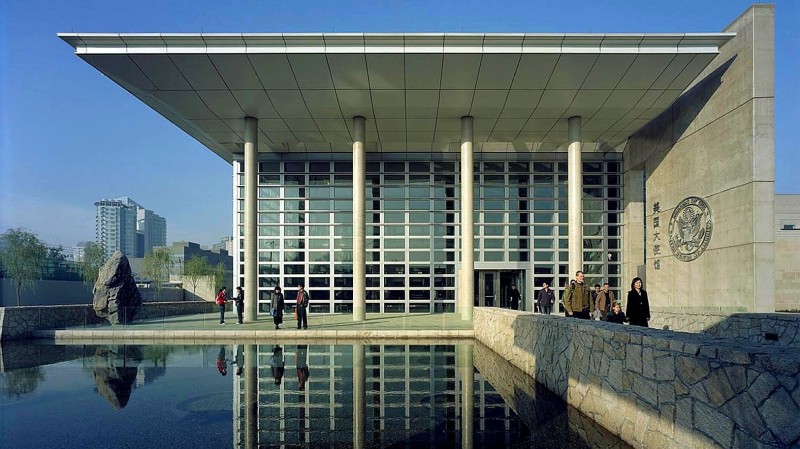
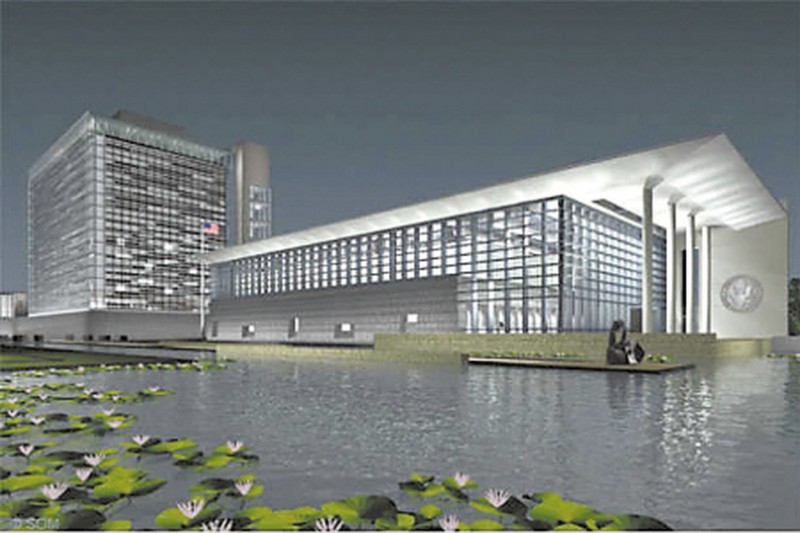
สวัสดีนักอ่านทุกท่านครับ วันนี้ผมมีเรื่องราวน่าสนใจเกี่ยวกับสถานเอกอัครราชทูตสหรัฐอเมริกา ณ กรุงปักกิ่ง มาเล่าให้อ่านครับ ต้องบอกเลยว่าเรื่องราวในวันนี้เป็นเรื่องที่น่าสนใจเป็นอย่างยิ่ง แต่จะน่าสนใจขนาดไหน ไปอ่านกันเลยครับ
ต้องบอกก่อนว่าโดยปกติแล้วสถานทูตสหรัฐฯ ทั่วโลกจะมีเจ้าหน้าที่ทหารจากนาวิกโยธินสหรัฐฯ ทำหน้าที่คุ้มกันอยู่ภายในอาณาบริเวณของสถานทูต แต่สถานทูตสหรัฐฯ ในประเทศจีนนั้นจะมีความแตกต่างจากประเทศอื่นๆ ในโลก เนื่องจากได้รับการคุ้มกันโดยกองกำลังติดอาวุธ Chinese wujing หรือ the People's Armed Police ของกองทัพปลดปล่อยประชาชนจีน (PLA) ไม่ใช่โดยเจ้าหน้าที่ทหารของนาวิกโยธินสหรัฐฯ ดังเช่น สถานทูตสหรัฐฯ อื่น ๆ ทั่วโลก
เพราะเหตุนี้จึงทำให้สถานทูตสหรัฐฯ ณ กรุงปักกิ่งได้รับการปกป้องมากที่สุด โดยกองทัพของประเทศที่ตั้งของสถานทูตเลยทีเดียว
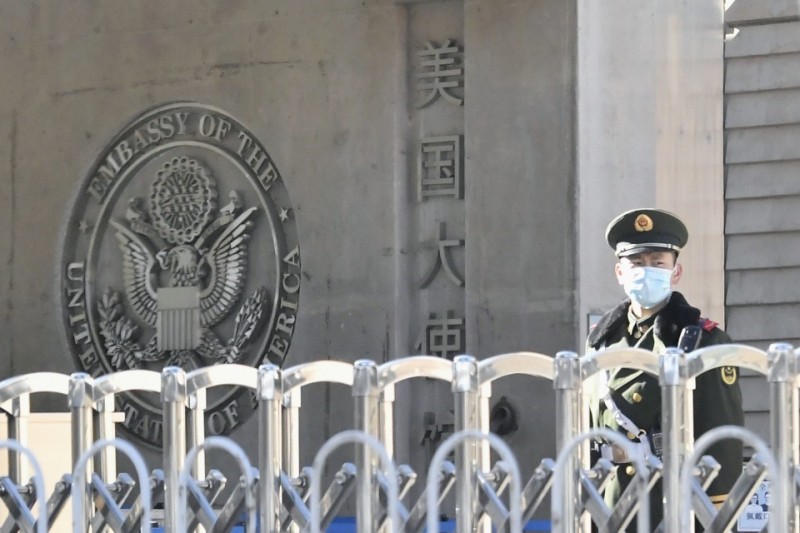
เจ้าหน้าที่ของกองกำลังติดอาวุธ the People's Armed Police หรือ Chinese Military Police ซึ่งทำหน้าที่คุ้มกันสถานทูตสหรัฐฯ
เรามาทำความรู้จักกองกำลังติดอาวุธ the People's Armed Police หรือ Chinese Military Police กันดีกว่า
กองกำลังติดอาวุธ the People's Armed Police หรือ Chinese Military Police เป็นทหารหน่วยพิเศษ หรือสารวัตรทหาร (ซึ่งไม่ใช่เจ้าหน้าที่ตำรวจ) ของกองทัพปลดปล่อยประชาชนจีน (PLA) มักจะปฏิบัติงานด้านความมั่นคงภายใน เช่น คุ้มกันสถานทูต กวาดล้างผู้ค้ายาเสพติดอันตราย ต่อต้านการก่อการร้าย การปราบปรามความไม่สงบ ฯลฯ
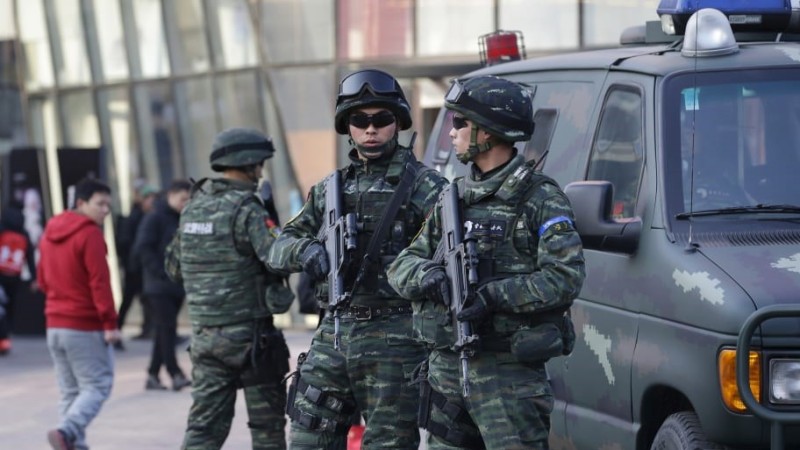
เจ้าหน้าที่ของกองกำลังติดอาวุธ the People's Armed Police หรือ Chinese Military Police ซึ่งทำหน้าที่คุ้มกันสถานทูตสหรัฐฯ
นอกจากนี้การรักษาความปลอดภัยภายในอาณาบริเวณของสถานทูตสหรัฐฯ ในประเทศจีนนั้นจะมีเจ้าหน้าที่รักษาความปลอดภัยประจำสถานทูตสหรัฐฯ ซึ่งเป็นเจ้าหน้าที่พลเรือนจาก The Diplomatic Security Service (DSS or DS) ของกระทรวงการต่างประเทศสหรัฐฯ ซึ่งมีสถานะเป็นเจ้าหน้าที่บังคับใช้กฎหมายในประเทศของรัฐบาลสหรัฐฯ ในคดีที่เกี่ยวกับกระทรวงการต่างประเทศ อาทิ การปลอมแปลงหนังสือเดินทางหรือวีซ่า การค้ามนุษย์ การปลอมแปลงเอกสาร การลักพาตัวระหว่างประเทศ การละเมิดรัฐบัญญัติการป้องกันผู้ได้รับการคุ้มครองจากรัฐบาลกลาง การจับกุมผู้ที่หนีคดีในต่างประเทศ และคดีอาชญากรรมระหว่างประเทศ
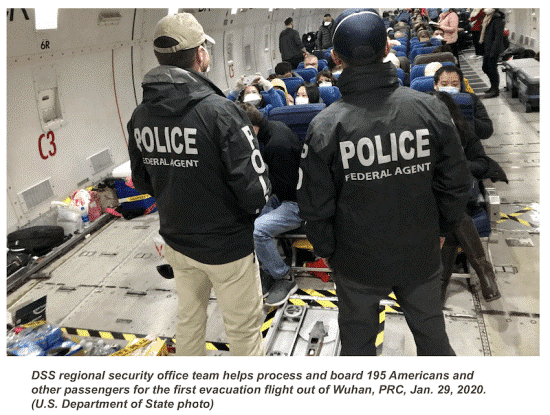
เจ้าหน้าที่พลเรือนจาก The Diplomatic Security Service (DSS or DS) ของกระทรวงการต่างประเทศสหรัฐฯขณะอพยพพลเมืองอเมริกันชุดแรก ๑๙๕ คนออกจากเมืองวูฮั่น อันเนื่องมาจากสถานการณ์ COVID-19 ในปี ค.ศ. 2020
การที่รัฐบาลจีนสั่งห้ามสถานทูตไม่ให้ที่พักแก่ทหารจากประเทศของตน ด้วยเพราะด้วยเหตุผลทางประวัติศาสตร์
ในปี ค.ศ. 1898 ระหว่างการกบฏนักมวยมีทหารต่างชาติซึ่งประจำการในสถานทูตแปดชาติ ได้แก่ อเมริกา ออสเตรีย-ฮังการี สหราชอาณาจักร ฝรั่งเศส เยอรมัน อิตาลี ญี่ปุ่น และรัสเซีย ได้กระทำการทารุณต่อประชาชนในท้องถิ่น
นอกจากนี้ ยังมีความทรงจำที่เลวร้ายเกี่ยวกับสนธิสัญญาที่ไม่เท่าเทียมกัน ซึ่งมหาอำนาจตะวันตกหลายชาติได้ประกาศสงครามกับจีน และมีการบังคับรัฐบาลจีนให้จ่ายเงินชดเชยจำนวนมหาศาล สร้างสถานทูตและที่พักทหาร ฯลฯ
ดังนั้นสถานเอกอัครราชทูตสหรัฐฯ จำเป็นต้องปฏิบัติตามกฎของรัฐบาลจีน โดยเจ้าหน้าที่พลเรือนจาก The Diplomatic Security Service (DSS or DS) ของกระทรวงการต่างประเทศสหรัฐฯ ทำหน้าที่รักษาความปลอดภัยในอาณาเขตของสถานทูต
 "Discipline, Vigilance, Professionalism" (มีวินัย ระวังตัว มืออาชีพ) คำขวัญของ Marine Security Guard
"Discipline, Vigilance, Professionalism" (มีวินัย ระวังตัว มืออาชีพ) คำขวัญของ Marine Security Guard
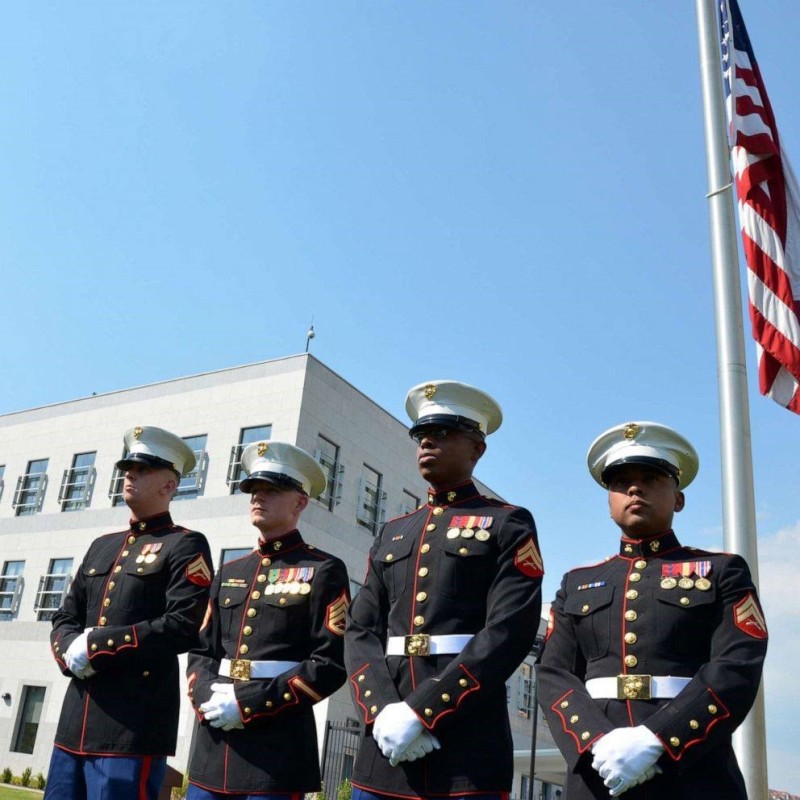
แต่สถานทูตสหรัฐฯ ทั่วโลกโดยปกติแล้วใช้ทหารจาก Marine Security Guard (MSG) หรือ Marine Embassy Guard (หน่วยนาวิกโยธินรักษาความปลอดภัยประจำสถานทูตสหรัฐฯ) เป็นสมาชิกของกองกำลังนาวิกโยธินซึ่งทำหน้าที่รักษาความปลอดภัยประจำสถานทูตสหรัฐฯ ทั่วโลก (เดิมชื่อกองพันหน่วยนาวิกโยธินรักษาความปลอดภัย) ซึ่งเป็นองค์กรขนาดกองพันของกองกำลังนาวิกโยธินสหรัฐฯ (USMC) ซึ่งกองกำลังนาวิกโยธินรักษาความปลอดภัยของสถานทูตสหรัฐฯ สถานกงสุลอเมริกัน และหน่วยงานอื่น ๆ ของรัฐบาลสหรัฐอเมริกา เช่น คณะผู้แทนสหรัฐประจำองค์การ NATO กรุงบรัสเซลส์ ประเทศเบลเยี่ยม
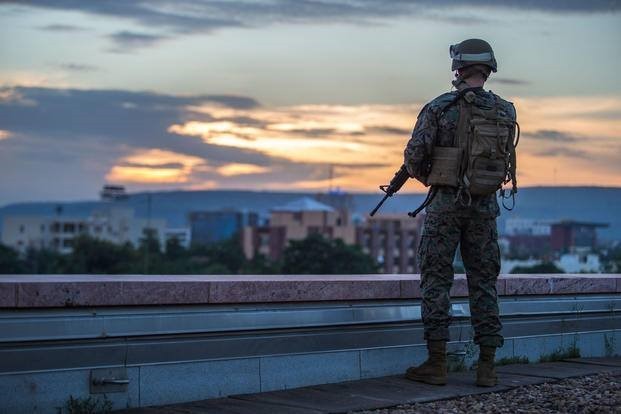
นาวิกโยธินสหรัฐฯ มีประวัติในการร่วมมือกับกระทรวงการต่างประเทศสหรัฐฯ มาอย่างยาวนาน โดยย้อนกลับไปในยุคแรก ๆ ของประเทศ ตั้งแต่การชักธงชาติอเมริกันที่เมืองเดอร์นา กรุงตริโปลี ประเทศลิเบีย และภารกิจลับของ Archibald H. Gillespie ในแคลิฟอร์เนียช่วงสงครามระหว่างสหรัฐฯ กับเม็กซิโก ไปจนถึงการกบฏนักมวยที่กรุงปักกิ่ง นาวิกโยธินสหรัฐฯ ได้ทำหน้าที่พิเศษหลายครั้งในภารกิจพิเศษในฐานะผู้นำสาร เป็นผู้คุ้มกันสถานทูตและคณะผู้แทนฯ และปกป้องพลเมืองอเมริกันในพื้นที่ที่ไม่สงบ











